
John W. Madden
Hand Book of the Carnival.
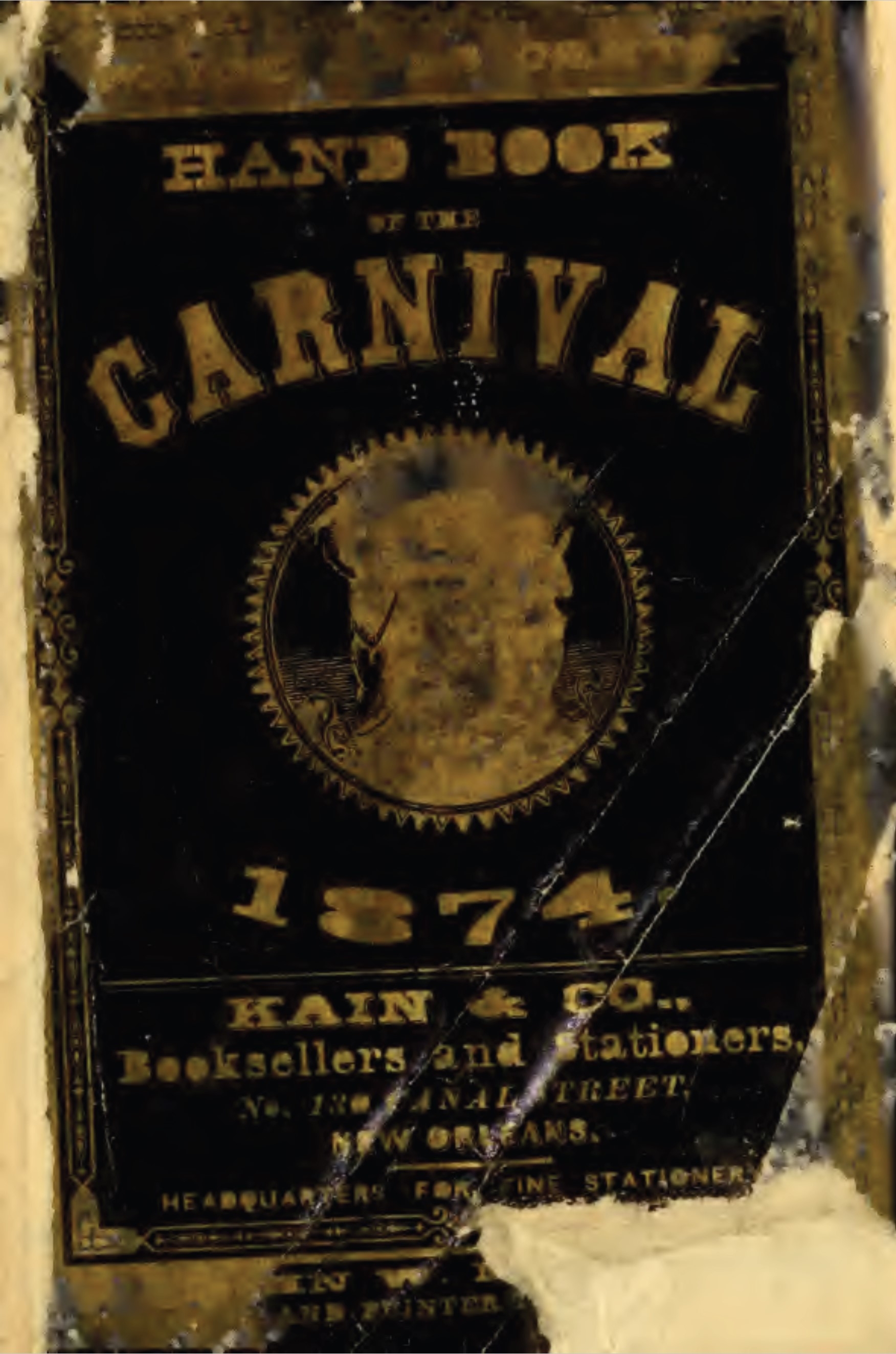
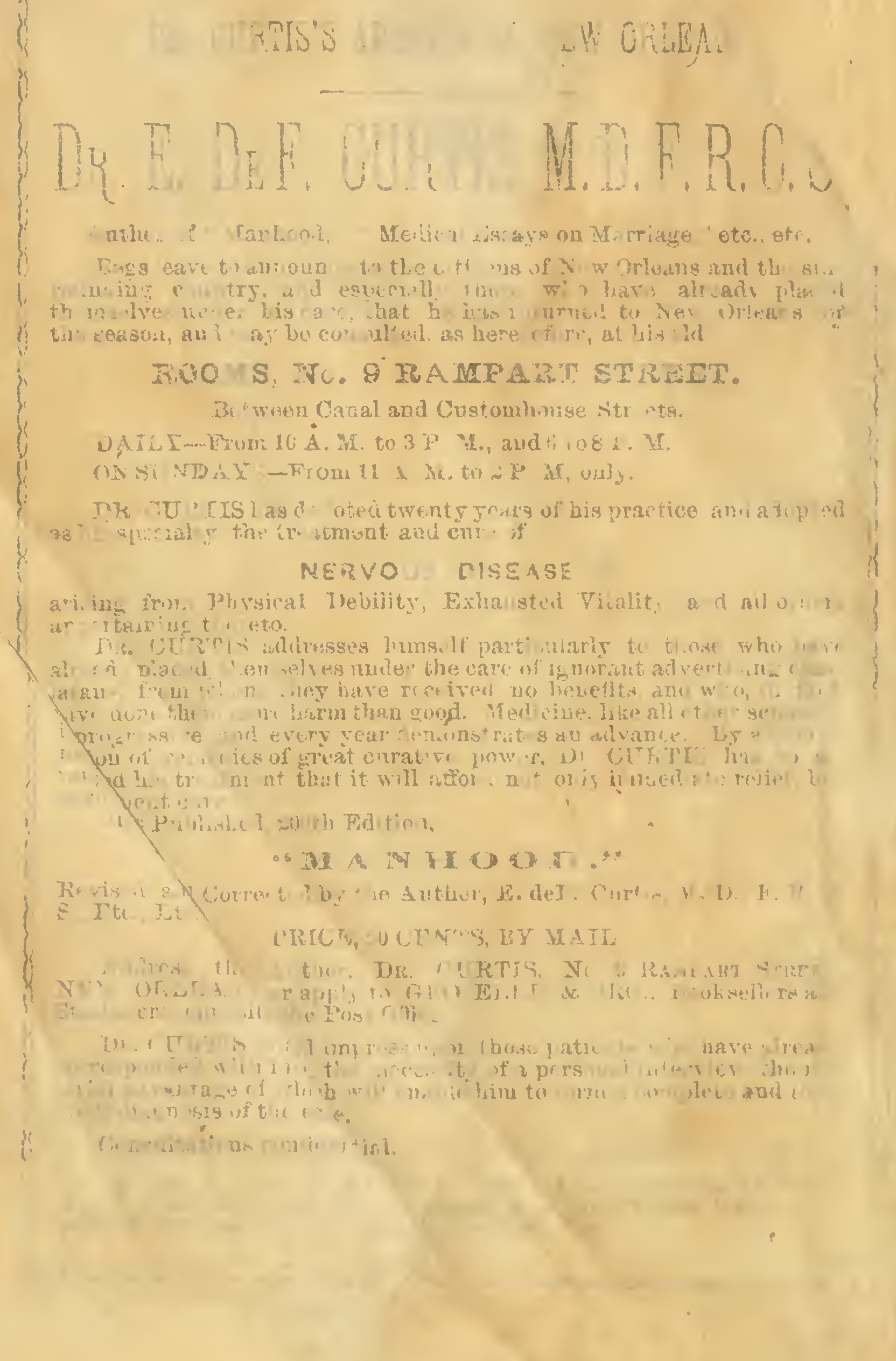
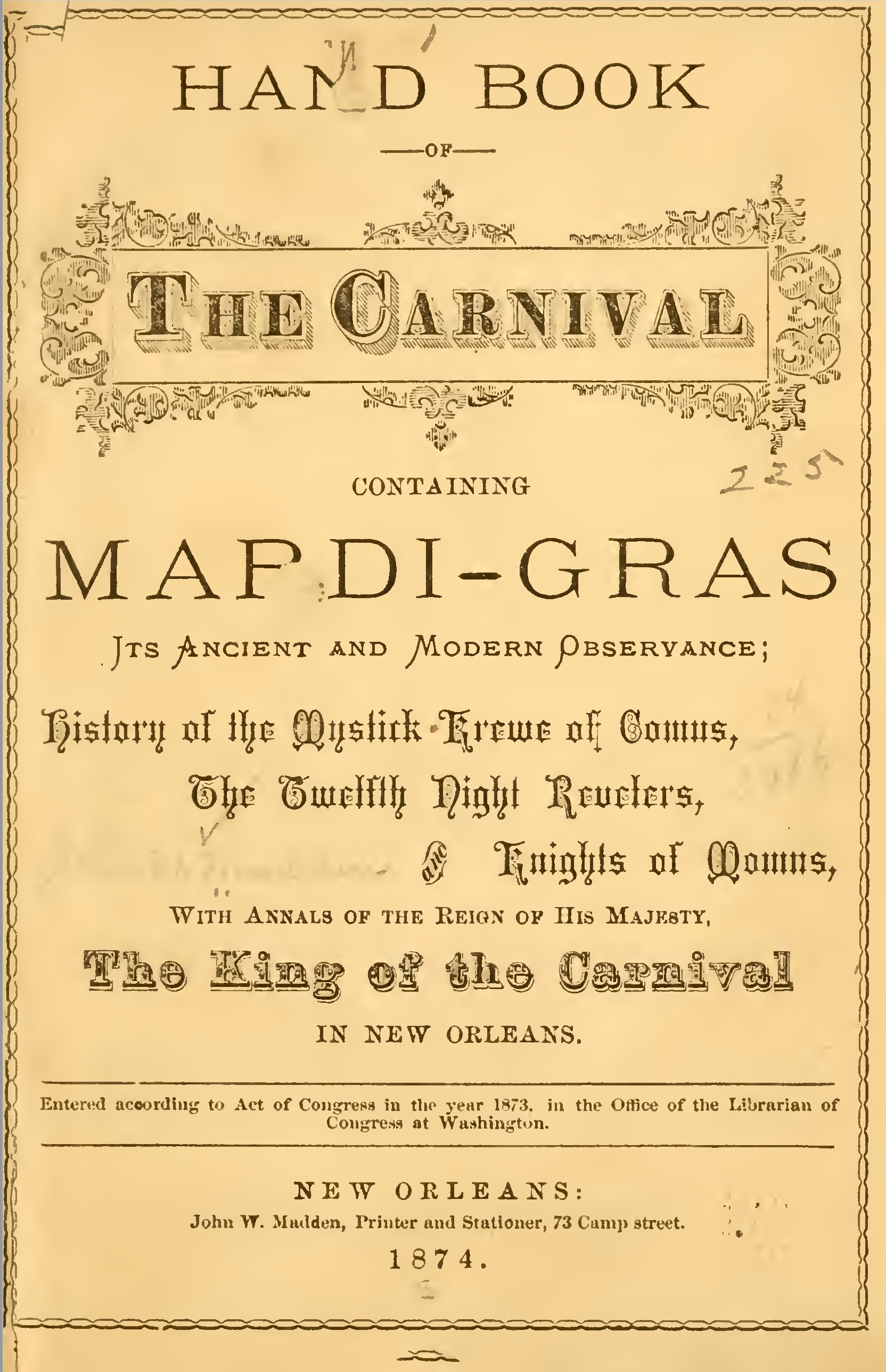
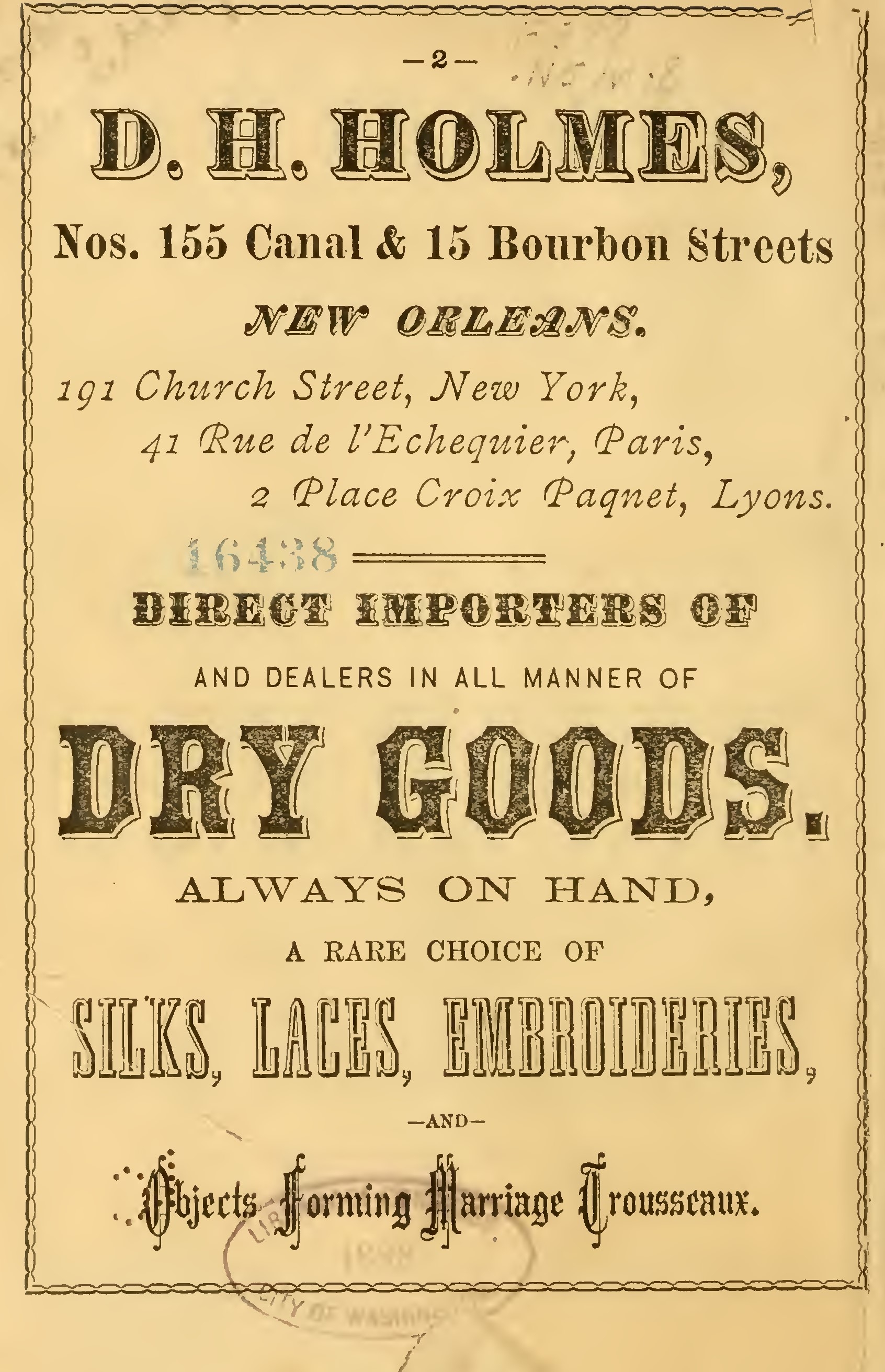
MARDI-GRAS.
The Carnival, properly speaking, begins with the first of the new year, and the festivities commencing with the congratulations and friendly wishes appropriate to that time, increase in fervor until they end in the wild whirl of the grotesque and merry parades and shows of Mardi-Gras (Fat Tuesday) so-called in France, the “favorite child of the church” because it is followed by Ash-Wednesday, ushering in the solemn season of Lent.
In the Catholic church the day is known as Shrove-Tuesday, or Shrove Tide (Ang. Sax. Scrifan — to confess) because “in the good old times” of the church, her faithful children were wont on that day to make their shrift, confess their sins, and prepare to enter upon the season of fasting and prayer with proper spirit. After confession they were accustomed to spend the remainder of the day in amusements, all kinds of which were tolerated by the church, provided of course, these were within the bounds of reason.
In olden times, in merry England, after making their confession, the people commenced their festivities with a dinner, of which pan-cakes or fritters formed an important part, and hence the day was vulgarly known as Pan-Cake Tuesday, and the bells rang on that day as Pan-Cake Bells.
The Carnival is of heathen origin, and was generally accompanied by great excesses. To celebrate the end of winter on the near approach of spring, among the pagans, national feasts were held in honor of certain gods.
Among the Greeks and Romans, and the Southern nations, Bacchus, the god of the grape or wine, was honored, hence the Bacchanalia — Pan or Lupercus — the god of herds and flocks — hence the Lupercalia. At these festivals men and women, becoming intoxicated in honor of the god, dressed in grotesque manner, many crowned with wreaths, ran about committing all kinds of excesses, accompanied by others playing on different musical instruments, and singing the wildest of songs.
These festivities having taken root in the hearts of the people, were continued in a modified form, even after the establishment of Christianity among them, and although not celebrated in honor of heathen gods, they have descended to our day, and are enjoyed with so much zest, that they are looked forward to for months.
By the Germans the day is called Fast-Nacht, (fast eve) and among them was celebrated the feasts of Spurcalia, held in February, in which month the old pagan Germans offered sacrifices to the sun, whom they worshipped as a deity, because he commences to ascend higher in the heavens. The peasants, not having much work to do in the fields at this time, were very much attached to the amusements it brought them.
The ancient pagan Germans celebrated a feast in January, which was called “Irias” (the exact meaning of which is not now known) or “Pagans Cursus,” when old and young men and women disguised themselves in all kinds ot fantastic costumes. On these occasions the greatest hilarity prevailed, and the feast is even now observed in some parts of Germany.
In our city settled as it was by emigrants from the Southern States of Europe, where these festivals were observed with the greatest enthusiasm, it is natural that they should have been continued; although comparatively unknown in some Northern cities of the Union. The great number of those who belong to the Catholic and Episcopalian churches, in both of which the season of Lent is observed with much solemnity, tends to the development of the festivities, of a time, which precedes one of abstinence and austerity.
Since time immemorial, so long back that the memory of the “oldest inhabitant runs not to the contrary,” it has been customary for the people of the Crescent City to give themselves over to mirth and festivities on Mardi-Gras. Years ago, maskers appeared on the streets in every conceivable costume, and on several occasions, processions of quite an imposing character paraded the streets. Boys went round with sacks of flour and lime, covering those they met, and these “practical jokes” descended into such ruffianism, that for a time, the people discouraged the observation of the day.
It was not, however, until the year 1857, that the day received its crowning glory, which has since made it a festival, celebrated all over the continent, that being the date ot the first appearance of the justly celebrated, mysterious, and always welcome —

This wonderful organization has always been enveloped in impenetrable mystery. Notwithstanding the curiosity which has surrounded it and increased from year to year, as each fresh representation added to the interest, none of the efforts to discover its personnel have ever been successful.
Certain suppositious theories as to its origin have been advanced, chief among which is the idea that some of our festive spirits took the inspiration from witnessing one of the processions of the famous “Cow Bellions” of Mobile, Ala. Whether this be true or not, it is certain that the “Mistick Krewe” has come to be one of our institutions, and that each recurring anniversary rivets, afresh, its claims upon our interest.
From the first day on which its organization began to be whispered around the city, it has been something concerning which the liveliest anticipations have been indulged. Not only have the gorgeous and fantastic processions been the occasion of an out-door demonstration on the part of almost the entire population, but the tableaux and ball which terminate the evening’s festivities have ever been a subject of the deepest anxiety in the circles of the best society of our city. The beautiful and costly cards of invitation, and the mysterious manner of their distribution, combine with the social position of those selected, to invest this part of the entertainment with a still deeper interest. It has grown to be a recognized evidence of cast to be the recipient of one of these mysterious biddings, and here is the sole clue we have to the character of the organization.
That the persons composing the “Krewe” have taste and money in abundance is apparent enough: that they belong to our very best society is shown by the position of those whom the choose each year to witness the closing oblations ot their festival. Here the knowledge seems destined to rest forever. When the new organization was first spoken of, it created great interest, and this was increased by the mystery surrounding the affair. The beautiful cards of invitation issued to their entertainment at the Varieties (then Gaiety) Theatre, coming from — the recipients knew not where — were highly prized, and everybody was on tip-toe of anxiety to know what the new spectacle would be.

First Festival, 1857.
About nine o’clock in the evening, of February 24th, in this year, the Krewe made their debut on the streets of New Orleans, making a very unique appearance, resembling a deputation from the lower regions. They called upon Mayor Waterman, then chief magistrate of the Crescent City, and after marching through the streets, the glaring torch-lights, displaying their costumes to much advantage, repaired to the Theatre, where a brilliant assemblage of the beauty and fashion of our city and neighborhood awaited them.
They represented the different characters with which religion and mythology have peopled the infernal regions, and which Milton has described in his “Paradise Lost.” There were four appropriate tableaux, combining the different characters, over a hundred in number, after which the barriers were removed, and a brilliant ball commenced, in which the invited guests took part. At 12 o’clock the members of the Krewe silently stole away, leaving their friends to enjoy themselves until the “coming of the gray morn.”

Second Annual Festival, 1858.
February 17th, was a beautifully propitious day and the great success of the first parade seemed to have stimulated the Krewe to exert themselves for a grand turn-out. The Krewe assembled in Lafayette square, at nine o’clock, and were met by Mayor Waterman, whom they took prisoner, and marched through the streets with torch-lights and music; everywhere greeted by thousands of spectators. This year the Krewe revived the mythology of olden times in all its glory, presenting the different deities which have for so many ages given subjects for the sculptor’s chisel, the poet’s pen and the artist’s pencil.
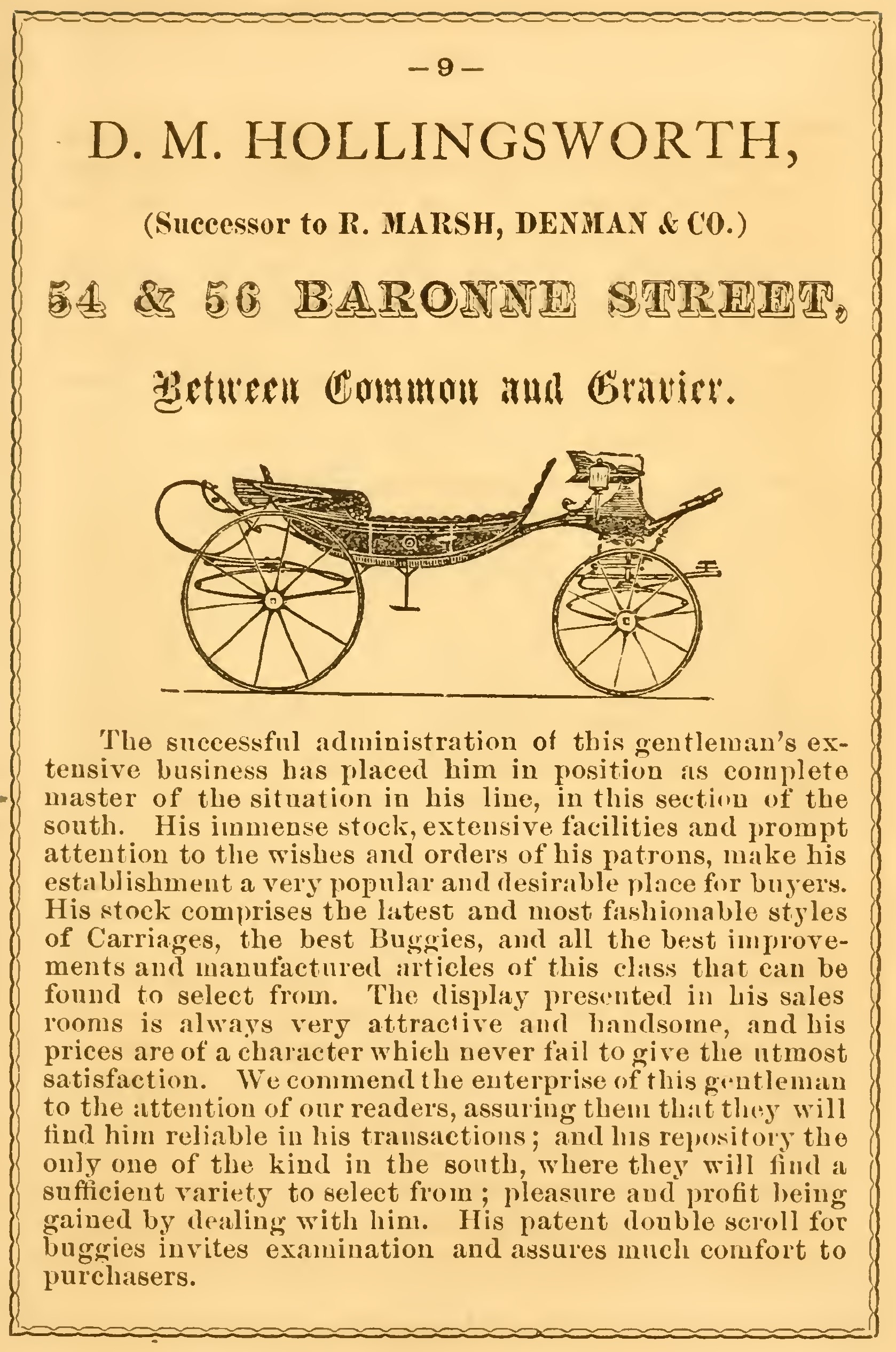
Comus, Momus, Janus, Flora, Diana, Jupiter, aud a host of other gods and godesses were presented in a splendid procession, after which at the theatre, four beautiful tableaux were given, at the conclusion of which, as on the first occasion, the dance began and Terpsichore was enthrowned queen of the night.

Third Annual Festival, 1859.
The reputation of the Krewe was now so well established, that long before the arrival of the day — March 8th — the greatest interest was felt as to the coming exhibition. The subject chosen was “Twelfth Night, or the courtly pageant of Misrule” and the elegant manner in which the parade was conceived, and the magnificence of its execution, is yet remembered and often spoken of by those who witnessed it. They first appeared on Orleans street, and proceeded to pay their respects to the mayor; welcomed on every hand by immense crowds who had gathered to see them. Four tableaux were given at the Varieties theatre, which was crowded to overflowing, and the ceremonies wound up with a grand ball, the Krewe disappearing as usual as the hour of twelve was tolled.
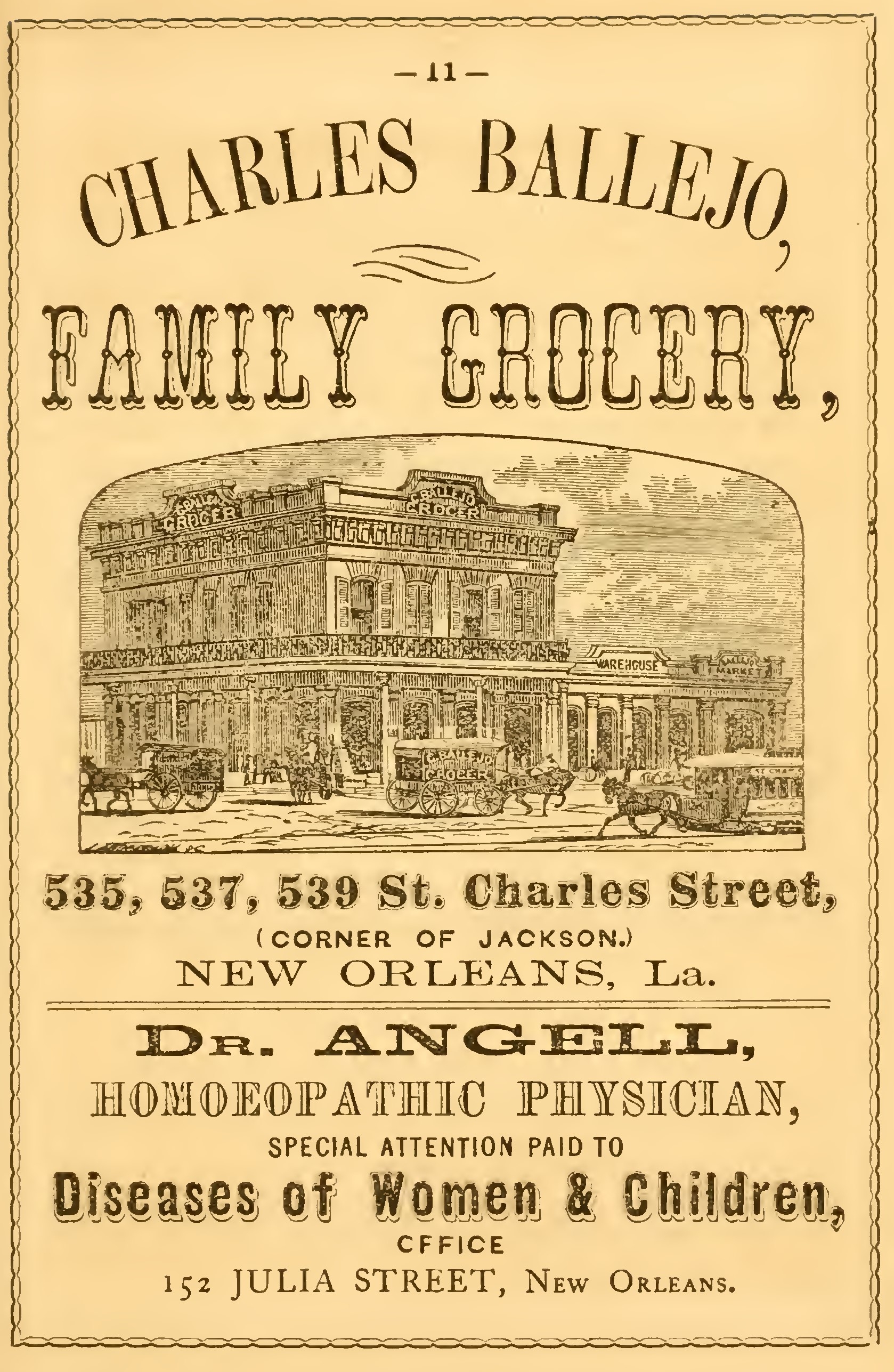

Fourth Annual Festival, 1860.
This time the festival came earlier in the year, February 21st, but not too early for the thousands who anxiously looked for the advent of the mistical Krewe, who first appeared on Royal street, and as usual streets, galleries, windows and steps, were crowded with people anxious to see the pageant. The subject chosen was illustrative of American History; there were fifteen cars or wagons, so fashioned as to represent blocks of granite, drawn by horses draped in white, and each containing a group of living statues, representing persons distinguished in the history of our country, from the time of Christopher Columbus, and Sebastian Cabot, to the days of Clay, Calhoun and Webster. At the theatre, ten tableaux or groups were presented to a brilliant assemblage of beauty and fashion among whom were many from a distance who had come to see the famous Krewe. As on former occasions the evening’s entertainment wound up with a ball.

Fifth Annual Festival, 1861.
The previous spectacles presented by the Krewe had prepared the people for something grand, and the morning of February 13th was welcomed with pleasure. The maskers on the streets during the day served to increase the interest in the coming visit of the Krewe.
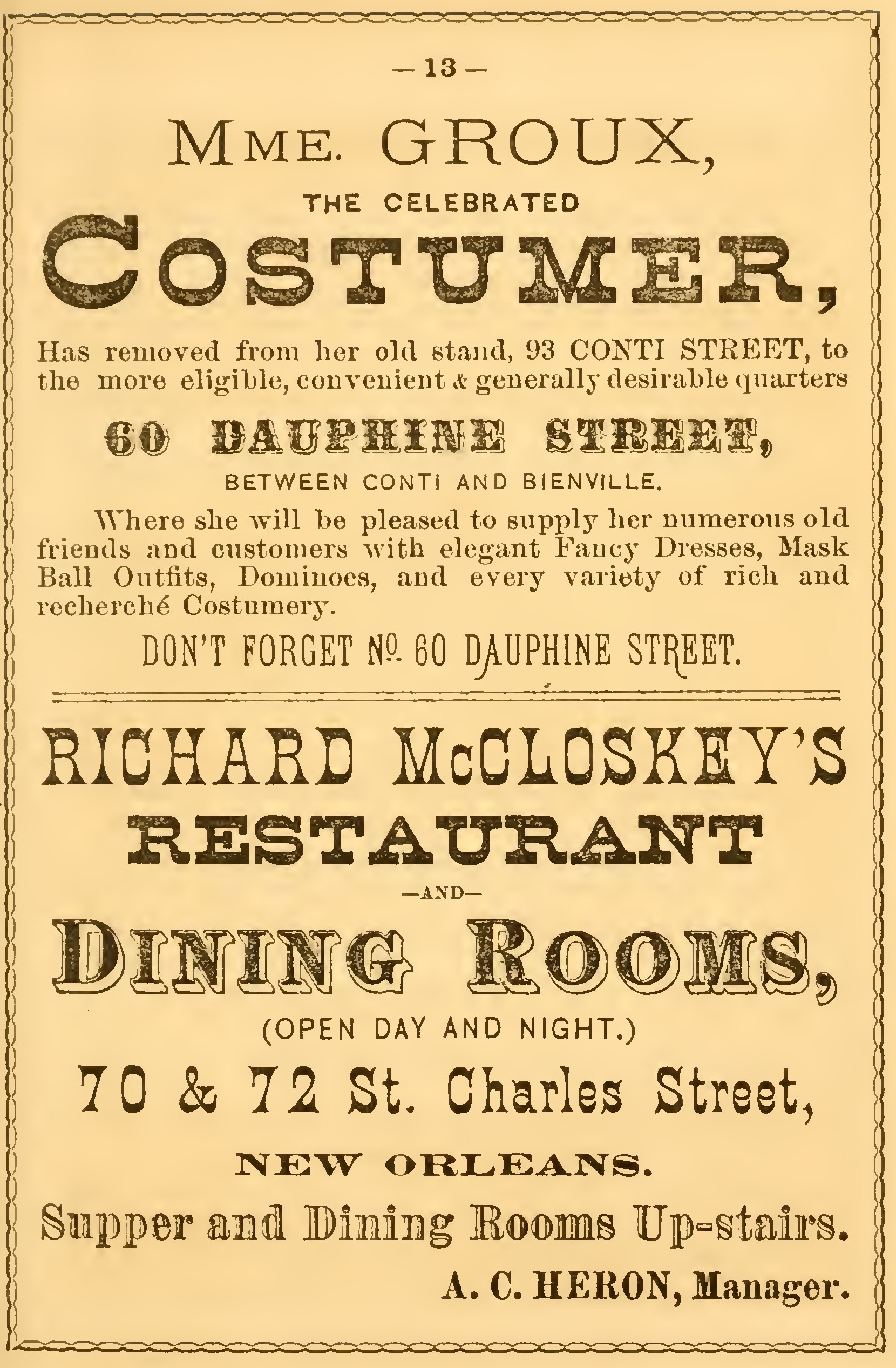
Between eight and nine o’clock in the evening, the welcome lights from their torches were discovered on Camp street, and as the strains of music from the band accompanying them sounded upon the air, thousands of eyes were turned in their direction, and a thrill of pleasure filled every heart as they came into view, representing “Scenes from Life” in the four divisions of childhood, youth, manhood and old age.
The first masker represented Childhood — an infant in a cradle, followed by a nurse. Then came Boyhood surrounded by maskers, representing a kite, a spinning top, sweet cakes, marbles and the things appertaining to that time in life. Then followed Youth, with a crowd of maskers representing the virtues, aspirations, temptations and trials of that period. Manhood came next, with a band of maskers representing the vices, follies, and also the better qualities of mature age. Finally came Old Age, with maskers representing the virtues, and vices which struggle for the mastery of man in his latter days. This group was followed by a masker representing Death — a skeleton in a shroud. The tableaux at the theatre were given in splendid style, and were witnessed by an immense audience of the elite of our city and State, after which the dancers took possession of the floor.

Sixth Annual Festival, 1866.
The intervention of the “Great Struggle” forced the postponement of everything like social amusement, aud the entertainments of the Krewe shared the common fate. When peace came, however, the Krewe, whoever they are and wherever they had been, once more gave evidence of life and spirit, and the announcement that they would “walk” again, revived many pleasant memories of the past. The four sad and dreary years since their last parade, were beautifully and magnificently portrayed on the cards and invitations for this year, where the bubbles blown from the “pipe of peace,” represented the years 1862, 1863, 1864, and 1865, as obscured by dark clouds. Long before dark, on this day, February 13th, crowds of people were seen gathering on the streets, where it had been hinted in the papers that the Krewe would appear, and the route soon presented a perfect sea of men, women and children, all anxious to welcome the return of the old favorites. Appearing first on Royal street, they called on the Mayor, and after their usual march proceeded to the theatre, where four tableaux were given, representing “The Past,” “The Present,” “The Future,” and the “Court of Comus”. A grand ball wound up the evening’s entertainment.

Seventh Annual Festival, 1867.
The festival this year, came on March 5th, and the parade represented “The Triumph of Epicurus.” The costumes were elegant, and the arrangement of the procession perfect. The Krewe first appeared on Lafayette Square, but how they got there was a most profound mystery. After their usual march around town, they finally disappeared in the theatre, and then gave their tableaux before an audience which has often been mentioned as brilliant and beautiful. At twelve o’clock the Krewe disappeared, leaving their guests to enjoy the giddy mazes of the dance until the “wee sma’ hours ayant the ‘twal.”
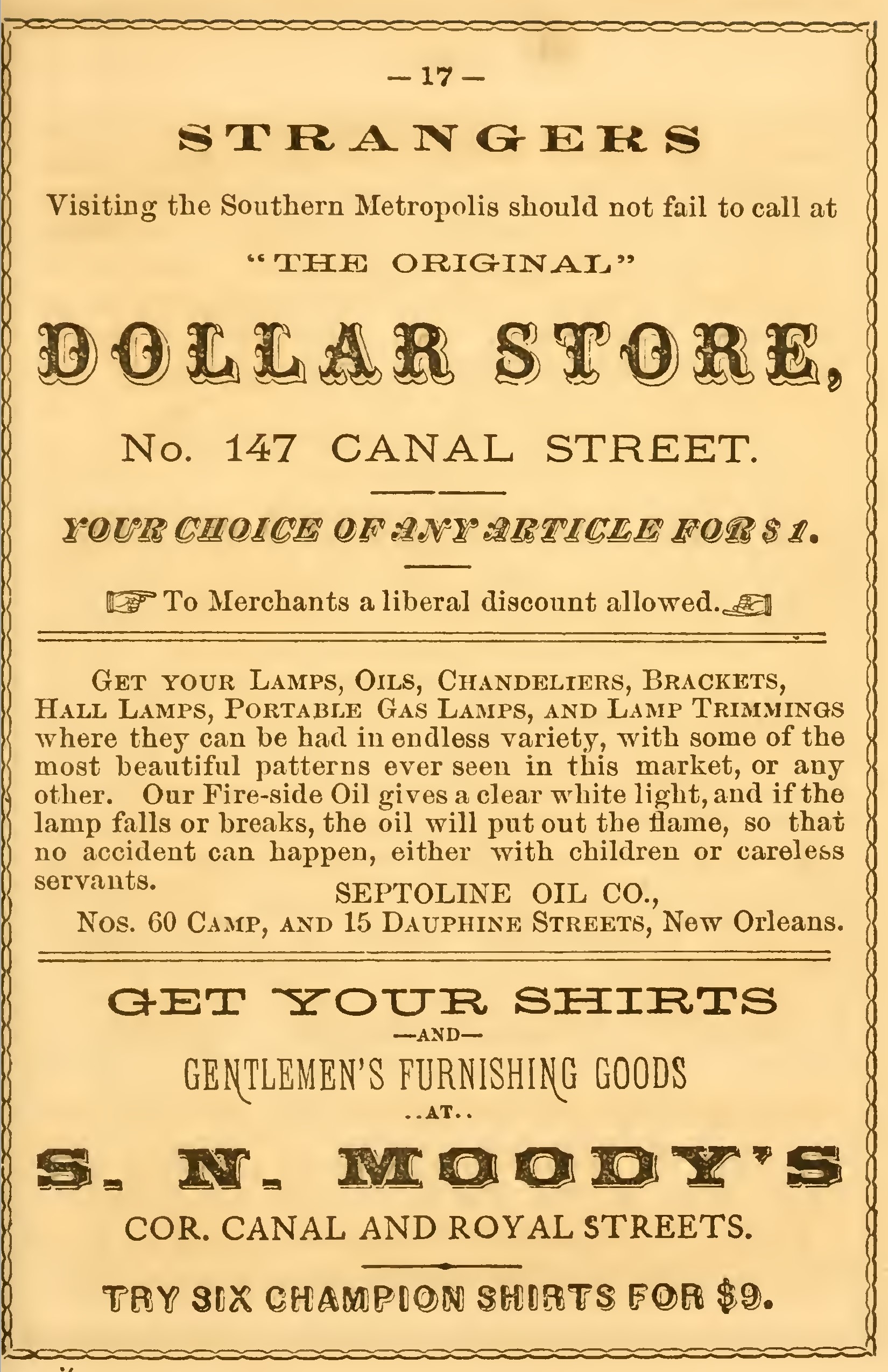

Eighth Annual Festival, 1868.
The interest in the Krewe, if it had ever slumbered, was now fully aroused, and the long-looked for day, February 25th, was welcomed by our entire city, and the fall of evening shades anxiously looked for. The balconies on Canal street, long before dark, were teeming with ladies and children, and streams of people moved to and fro in the streets, all looking for the jolly old Comus, and his merry Krewe. At last they appeared far down on Canal street, a glorious crowd repesenting the Senses, and the enormous nose of the party representing “Smell,” the ponderous hands of “Touch,” the glaring eyes of “Sight,” with the other senses and their appropriate accompanients, elicited the warmest applause from the thousands of spectators lining the route of their march. As on previous occasiomns, the evening wound up with tableaux and a ball at the theatre.

Ninth Annual Festival, 1869.
Once more the carnival was drawing to an end, February 9th, was the last day and as usual, New Orleans was full of mirth and revelry. But the grand event was of course the parade of the Mystick Krewe of Comus, and the elegant taste and refinement, so prominent in their entertainments, were never more strongly displayed than in their pageant of this year, founded on Moore’s favorite poem of “Lalla Rookh.” The gorgeousness of the Eastern costumes, the brilliant beauties in the train, the chivalric knights, with all the appropriate surroundings made up a procession that charmed every one who beheld it. The tableaux at the theatre were marked for their correctness of conception, and excellence of execution, and when the Krewe at their usual hour withdrew to give place to the dancers, every one felt that they had quite eclipsed all their former efforts.
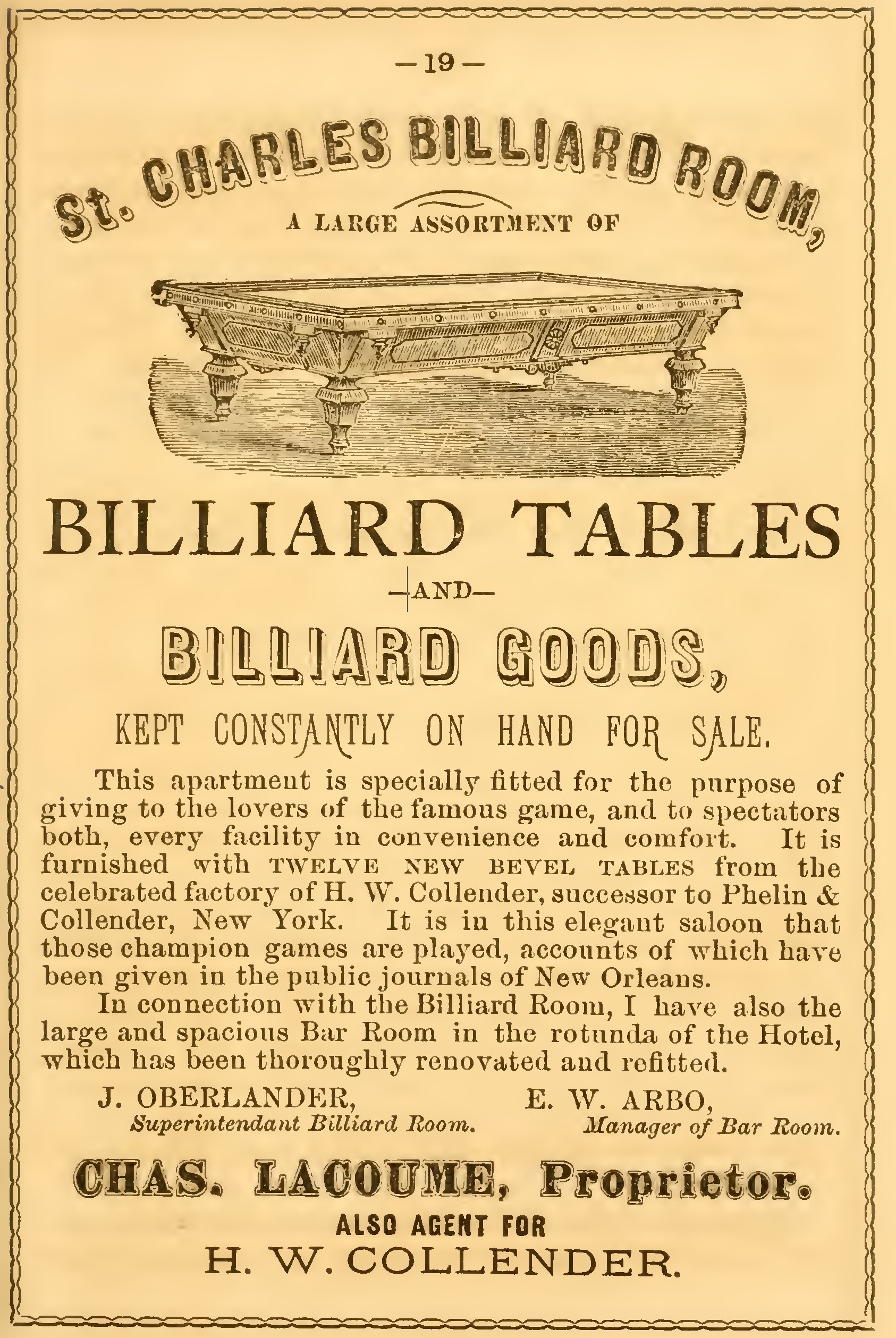

Tenth Annual Festival, 1870.
The fame of the Mystick Krewe of Comus had spread throughout the Union, and there were visitors here from Boston, New York, St. Louis, and other distant cities. In commenting on this spectacle, a Boston journal declared that it was “worth crossing a continent to see.” The festival came on March 1st, and long before the appearance of the Krewe, every gallery, window, doorstep and available standing place on the line of march was occupied. The procession illustrated the history of Louisiana, and was greeted with enthusiastic applause along the entire route. At the Varieties theatre the tableaux were given in superb style. At the usual hour the Krewe retired, leaving their guests to enjoy themselves and “chase the glowing hours with flying feet.”
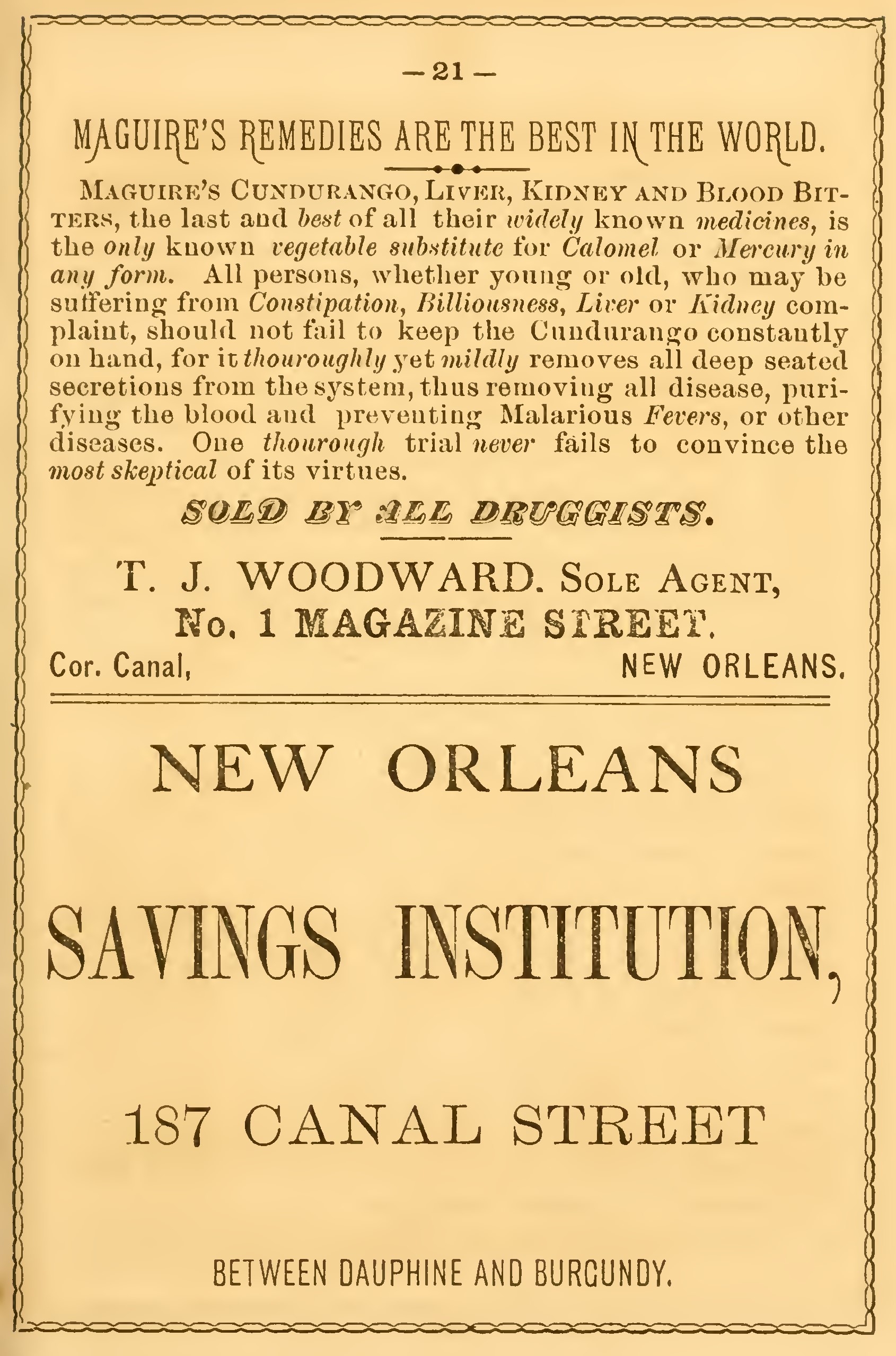

Eleventh Annual Festival, 1871.
The spectacle this year was, if anything, grander than that of 1870. It was based upon the majestic epic of Spenser’s Faerie Queen, and illustrated in appropriate groupings the principle episode of that delicate and fanciful creation, which, in the centuries that have elapsed since its birth, has lost no beauty or splendor by comparison. As usual. Camp, St. Charles, Carondelet, Chartres and Royal streets were crowded to suffocation, every window, gallery and available standing place being occupied.
After visiting the Mayor, and performing the stated line of march Comus, followed by the brilliant pageant of his Krewe, repaired to the Opera House where, in the presence of an overflowing assemblage of invited guests, the Festival was terminated by the usual tableaux.
The occasion was rounded off with another of those magnificent balls which have, through a long series of years, maintained a mysterious secrecy only equalled by the splendor with which they are conducted and the unfailing care employed in forming the company of the most select of our residents and visitors.
The entire aftair was quite up to the standard originally reached by this mystical association, and proved at least one thing — that they were gentlemen of unlimited means and the most distinguished taste.
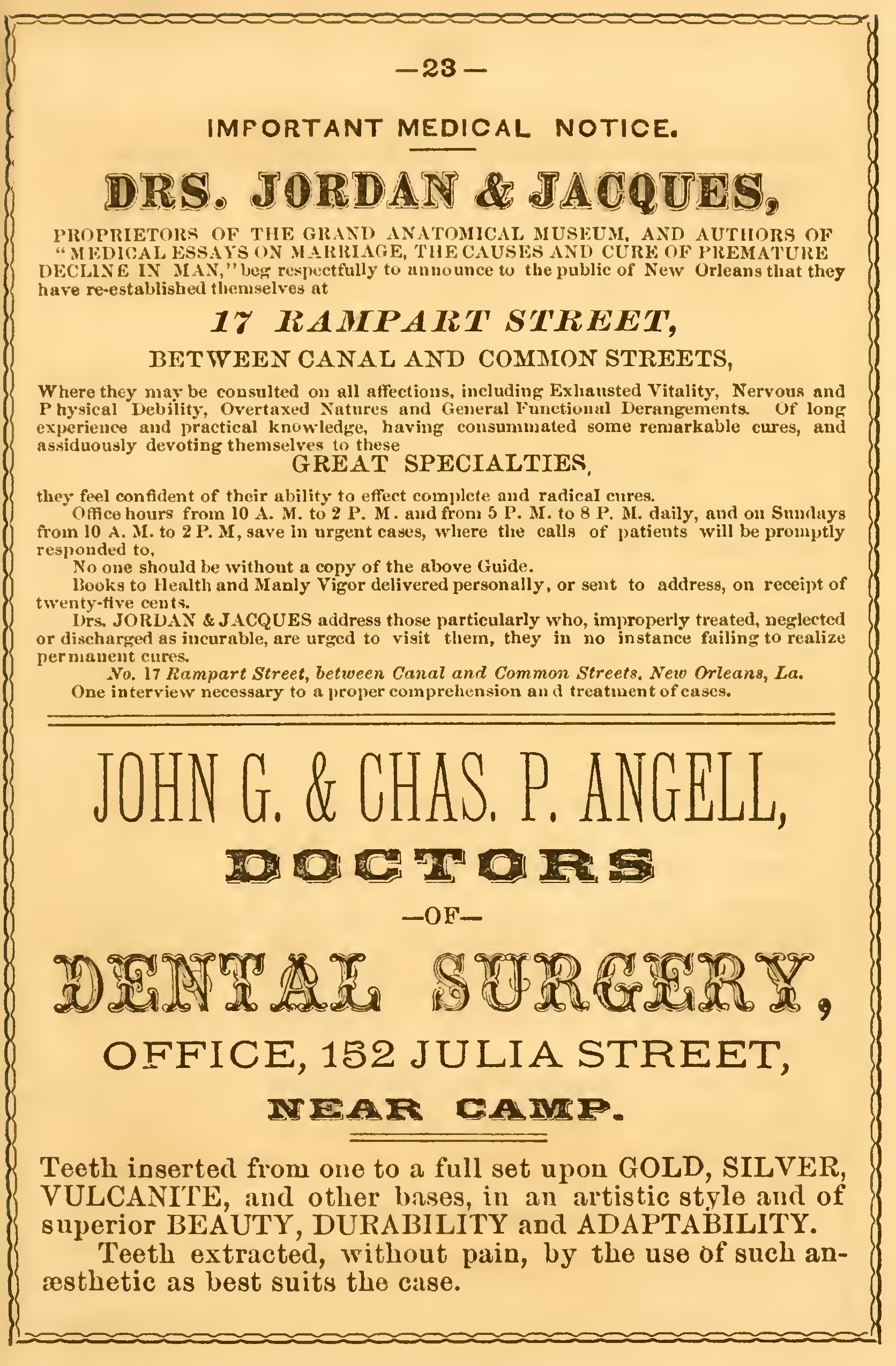

Twelfth Annual Festival, 1872.
This year the Mystick children of the deity selected as their subject
THE DREAMS OF HOMER.
Perhaps, all things considered, it was their finest effort in the way of pageantry. The immortal characters of the Illiad seemed reproduced from the glowing pages of their historian, and, for the first time in this city, those vague gigantic creations were presented to us in shapes that seemed to embody the dim conceptions of our minds.
The Greeks under Agamemnon and the Trojans under the old sorrow-stricken King, file by in splendid cohorts, and then come the Gods of Olympus who took such active portions in that memorable war. Following these, the central figures of appropriate groups, came those individual heroes who stand forth in bold relief from Homer’s work.
At the Varieties Theatre the tableaux were given with unusual magnificence and in presence of the same mysteriously selected assemblage.
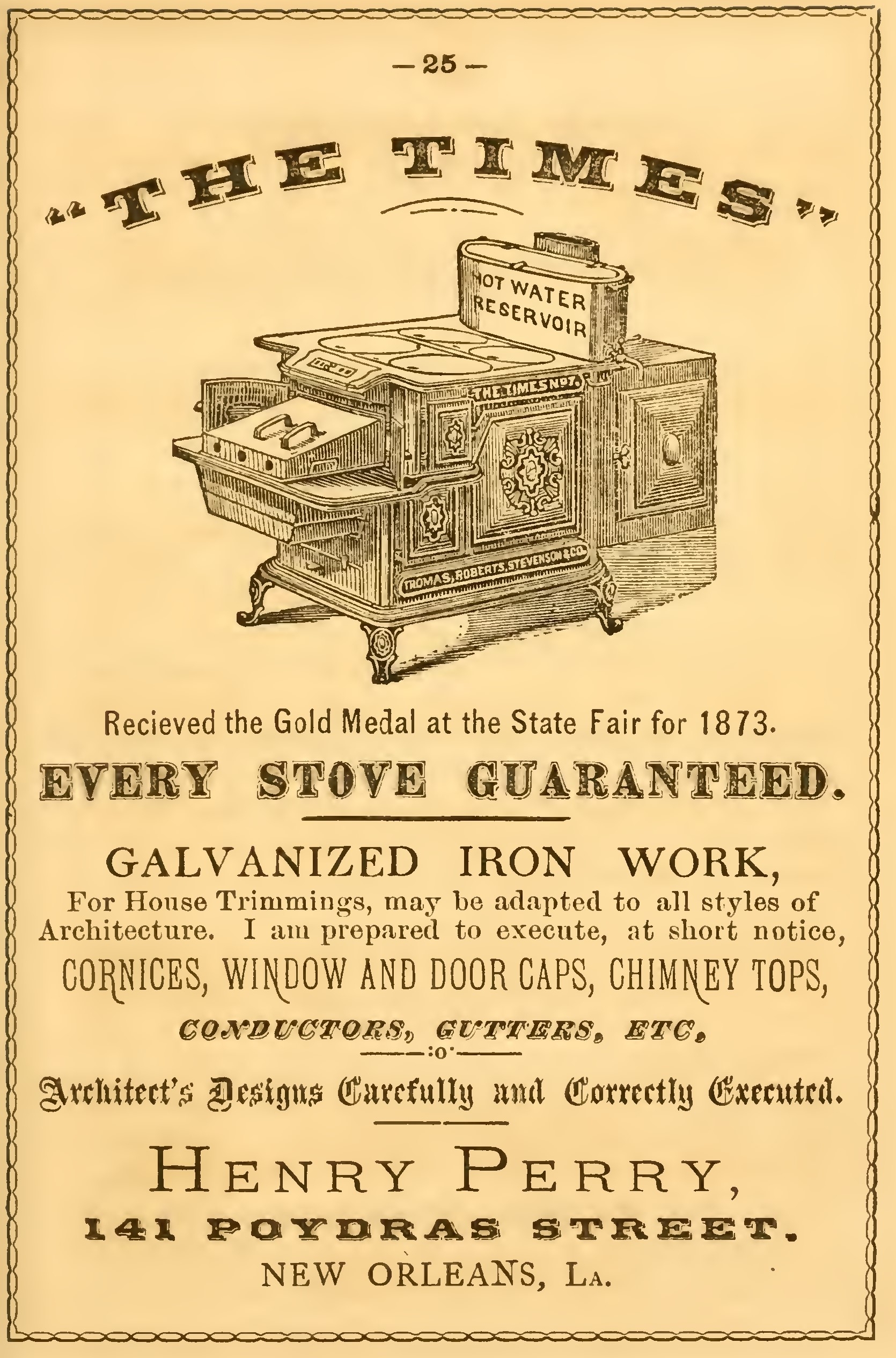

TABLEAU FIRST.
The Judgement of Paris.
TABLEAU SECOND.
The Combat.
Hector and Mars, and fierce Diomet! Priam and
Cassandra, and the God-like Agamemnon
are the umpires.
TABLEAU THIRD.
Nine groups in this colossal picture, represent
the trials of Ulysses.
TABLEAU FOURTH.
Here broad burlesque takes the place of epic heroes, and
the clash of brass-clad men is followed by the
Battle of the Frogs and Mice.
Never before, perhaps, was pageantry carried to a more brilliant perfection. The unanimous opinion of every one was that the Mystick Krewe had reached the limit of their powers, that no employment of money or energy could surpass that wondrous eftort. Yet a fresh triumph awaited the Krewe on the occasion of their

Thirteenth Annual Festival, 1873.
The morning of February 25th dawned bright and glorious, and found the Crescent City, with its thousands of citizens, and multitudes of visitors prepared for a day of unlimited enjoyment. The brilliant pageant which graced the sunlight hours will be found in the annals of his majesty the King of the Carnival.
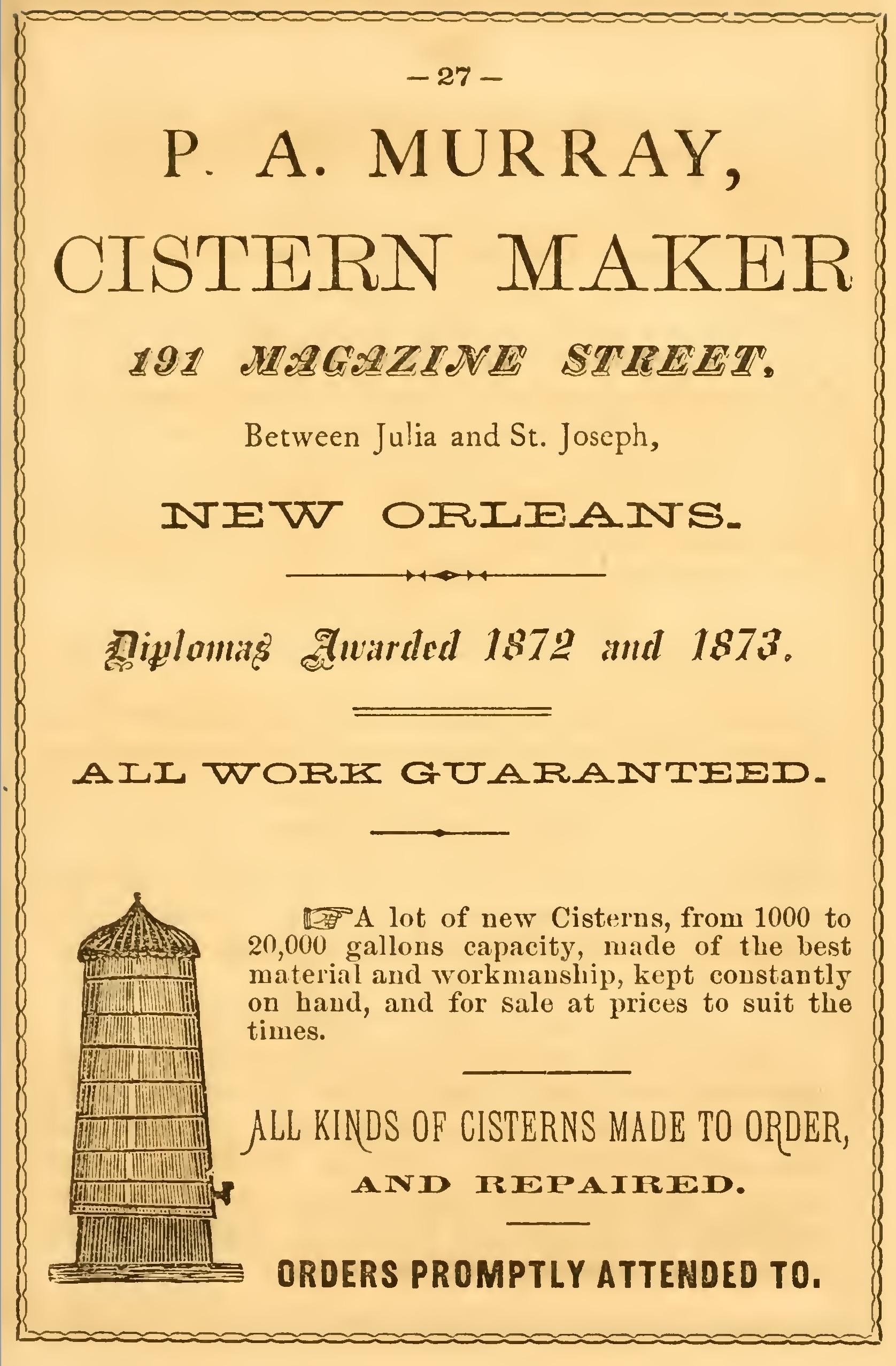
Here we speak only of the world renowned Mystick Krewe. That they appear before the public but once a year, that no one knows whence they come or whither they go, that their exhibitions are so gorgeous that the sight of one is the memory of a life time, or that thousands of strangers come from all parts of the land expressly to see them, are facts too well known to be repeated. To sum all in a word, those who have seen the Carnival at Rome, do not hesitate to say that it is far surpassed in elaborateness of design by that of our own city. The Krewe never had such a reception before. Heretofore one or two club-houses have been illuminated, but this night
was almost universal.
Along the line of march the illumination was general, the principal features of which were those on
The Pickwick Club, corner of Exchange Alley, was brilliant among the brilliant. Beneath the flag-staff, from which floated the royal standard of his Majesty Rex, stood a figure of the immortal Pickwick in the act of addressing the club.
The rooms of the club were ablaze with light. Outside the columns supporting the verandah of the second story were gorgeously illuminated with variegated lights, whilst between each column, tastefully arranged, festoons of Chinese lamps were suspended in the form of arches, which thrilled the beholder with pleasure.
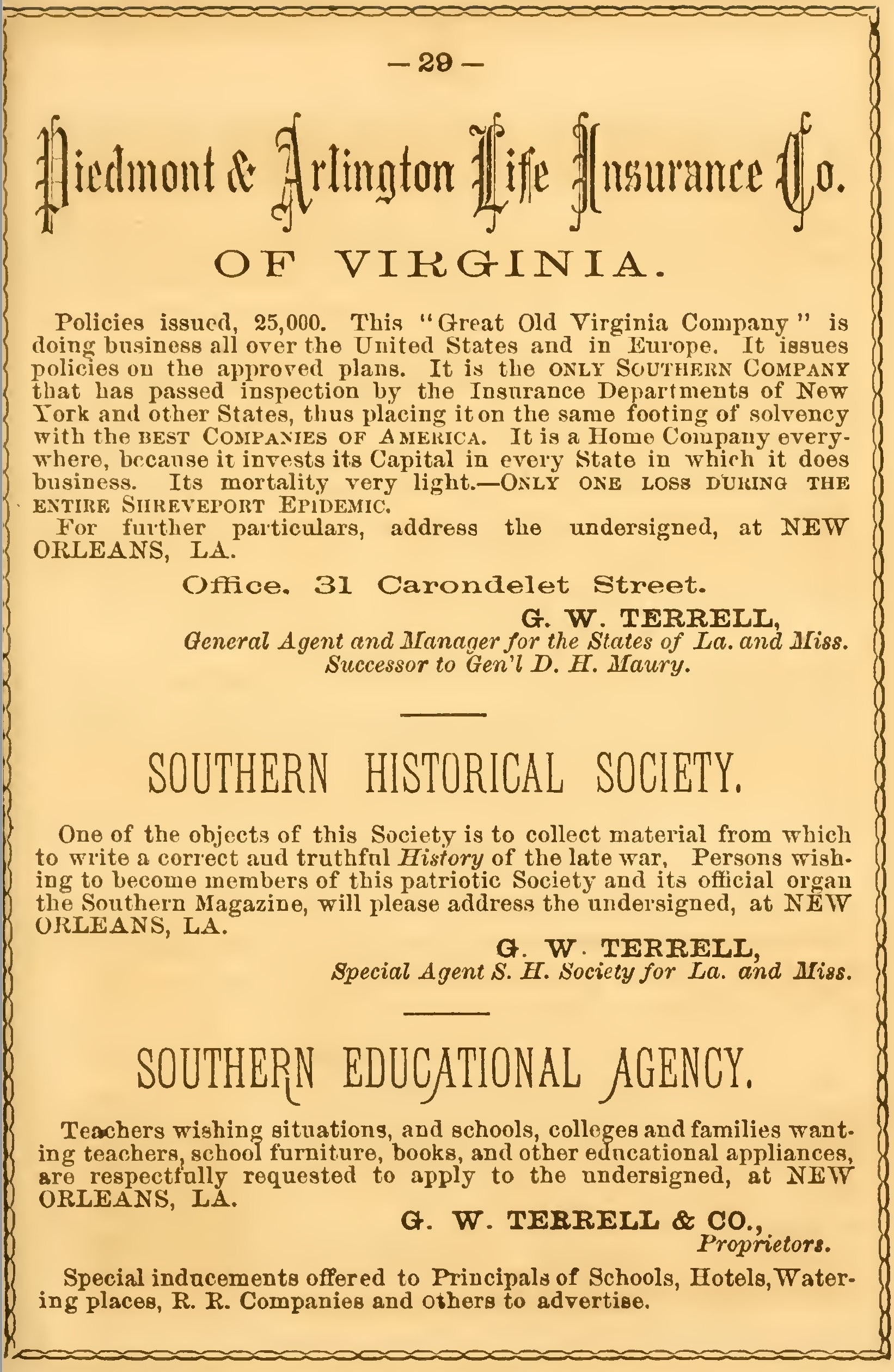
The establishments of Col. S. N. Moody, Messrs. A. B. Griswold & Co., Frederickson & Harte, Gueble & Nippert, Kain & Co., and several other stores were beautifully decorated with variegated lamps, while the Varieties Theatre appeared a perfect blaze of splendor.
At the corner of Carondelet a perfect flood of light was cast upon the street from a myriad of jets around the house of this club, which was also decorated with the mystic letters, M. K. C.
Nearly opposite the Chalmette, the dry goods store of
was adorned with an immense pelican in ever changing colors, beneath which were suspended the initials, D. H. H.
THE BOSTON CLUB
also put on its Carnival suit in the form of numberless festal lamps, which amply made up for the lack of other illuminations on this street.
THE SHAKESPEARE CLUB,
corner of Royal and Customhouse streets, over the famed cigar store of Messrs. Fernandez & Villa, was also beautifully illuminated with the initials of the club and sundry lines of light. That old ducal palace,
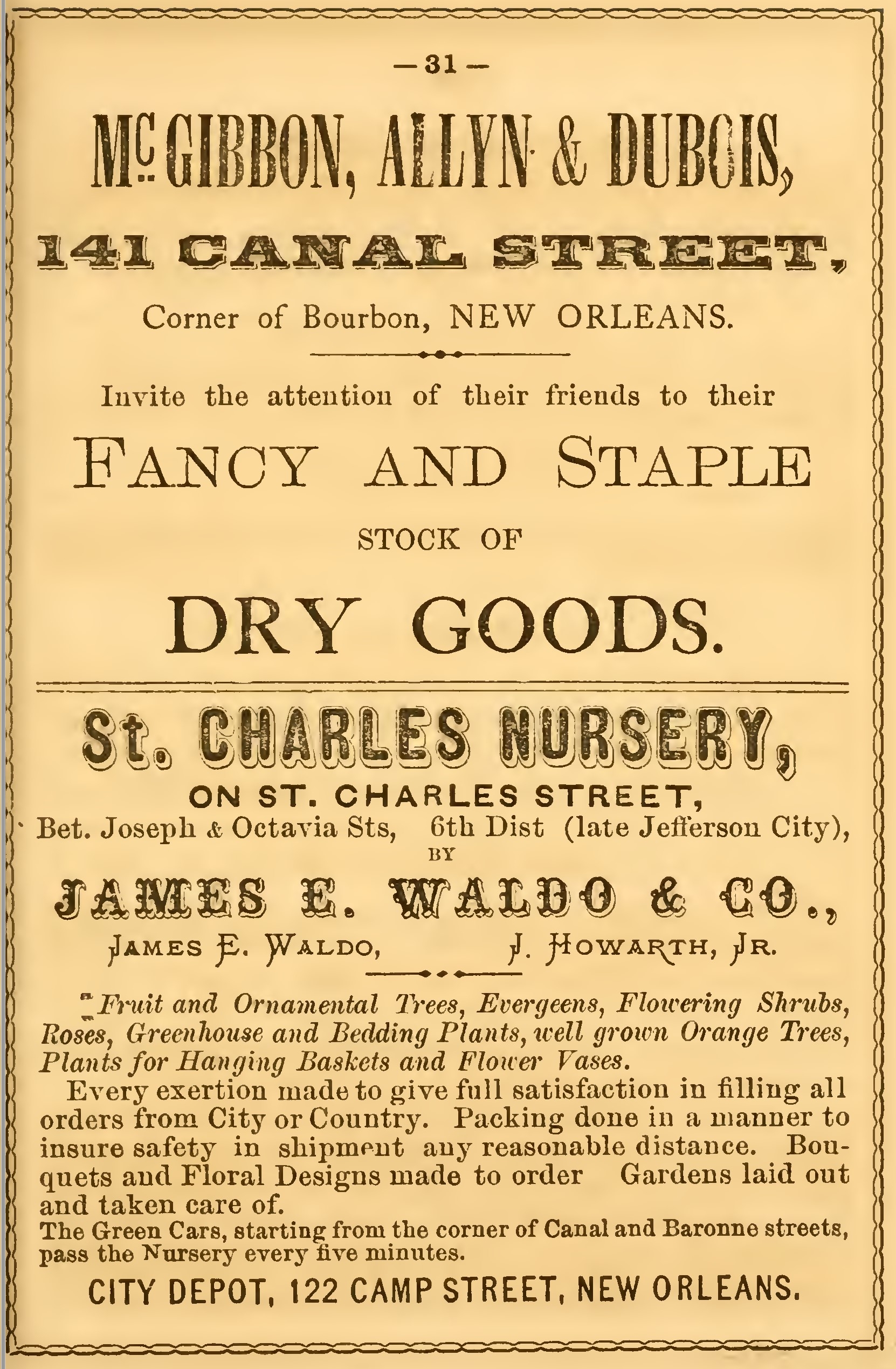
also wore a holiday air, and, in addition to its usual globe lamps, was lighted above and below the verandahs with tastefully arranged jets.
presented a scene of almost Oriental splendor, being a perfect blaze of light to the
which was more handsomely adorned than in any former year.
Along the entire front, at the base of the massive columns, was displayed a line of lights so brilliant as to dim the eye that dared to glance on them, while above, pendent between the columns, were festoons of globe lamps, which made the grand old place look like a palace in Fairyland.
corner of Canal and St. Charles streets, where that genial and ever popular gentleman, Col. Walter Merriam presides, was brilliantly illuminated and its splendid front looked fresher than ever.
The St. Charles Theatre, the offices of the Times and Picayune, the establishments of Messrs. Heath & Lara, upholsterers, E. C. Palmer & Co., stationers, Rice Bros, & Co., stove and hardware dealers, R. M. & B. J. Montgomery, auctioneers and dealers in furniture, and T. E. Suter, painter, were tastefully illuminated, the front of their respective buildings being decorated with appropriate designs.
As darkness came on.

began to gather. Needless to repeat the serviceworn phrases descriptive of their coming. Let such stereotypes as “long before the appointed hour,” “the beauty and élite of the Crescent City,” “galleries overflowing and resplendent with the fluttering throng,” “multitudes from all parts of the Union,” “all along the line of march,” etc., etc., be understood as somewhat more intensely and universally applicable than ever before, and we pass at once by all preliminaries.
And yet such a multitude is not to be so summarily elbowed through. The people did not merely gather; they thronged, they swarmed, they massed, in short, they simply came out in myriads.
For the present day, as a day of universal inquiry, as a day of rapid scientific progress, as a day when the people — the whole people are interested hearers at the councils of the sages, and that human nature, which once demanded the circus with its broad claps and laughs and huzzas over the theories and disputes of the doctors; for such a day as to-day, what choice, for the crowning jollity of the Carnival, could have been a more happy, nay, a more natural selection than that of the
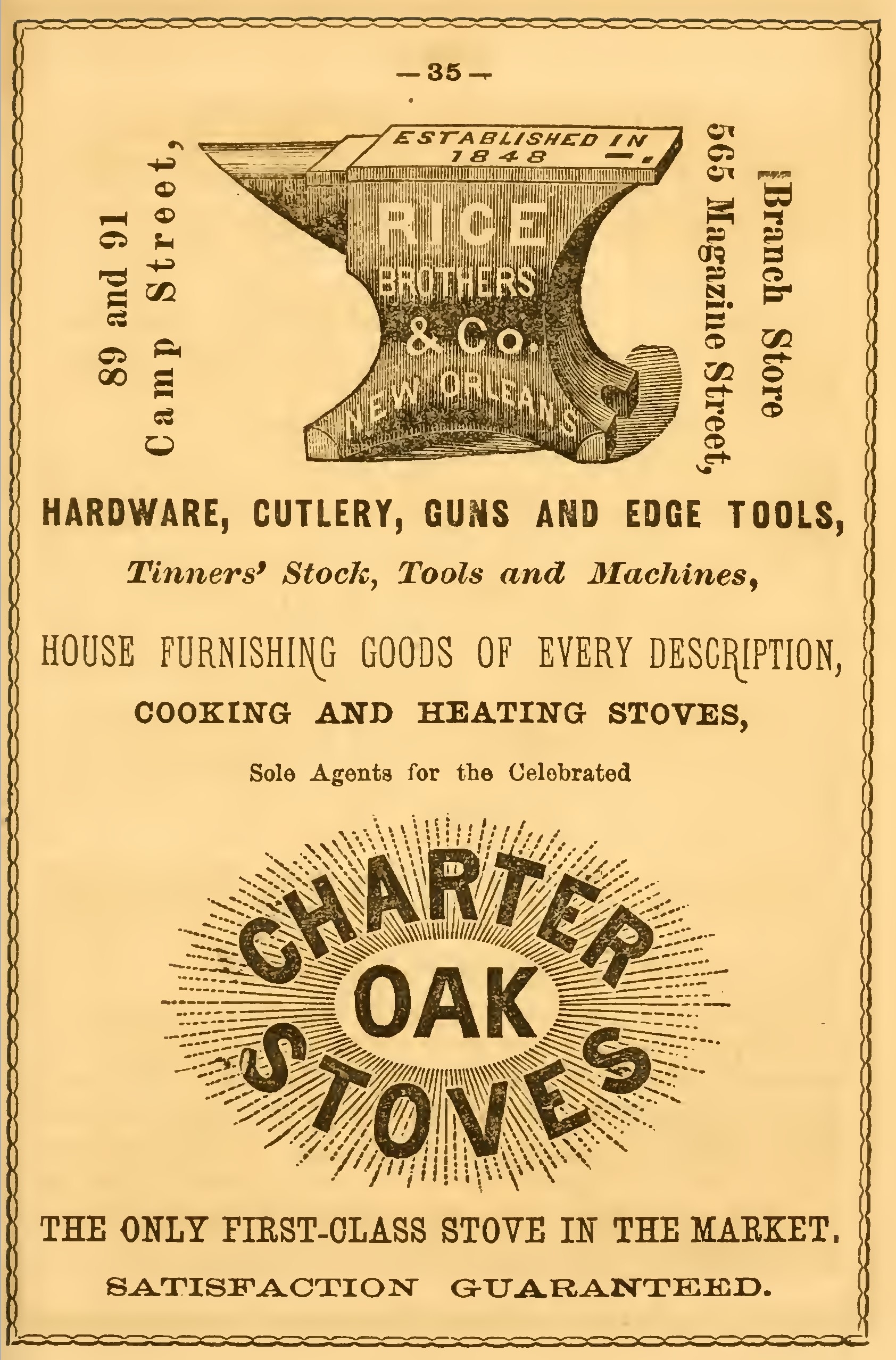
After all the investigation, discussion, dissension, retraction and contradiction connected with the subject of Man’s descent, there was something left unrevealed until this night. After all the savans — Cuvier, Lyell, Huxley, Spencer, Darwin had spoken — it was meet that Comus should have an audience.
The following poem, which has received the universal enconiums of press and people, was composed for the occasion, by one of the most popular writers connected with the New Orleans press, and will give to the reader a better idea of the pageant presented by the Krewe, than any other pen picture we could present.
The transparencies designating the difterent characters assumed by the members and borne before them were inscribed with its witty couplets, and copies of the poem were distributed in the theatre:
Adorning this or long forgotton ages,
Whose magic touch ope’s portals paleologic
And shatters seals of periods geologic —
Before whose search, the mysteries of creation
Dissolve like mists of morning exhalation —
Who thread’st the line of life to Nature’s germs,
To find God’s image in ancestral worms.
We, rich in faith and warm in strong affection,
For thy great creed of “Natural Selection.”
Convinced that man — the modern institution —
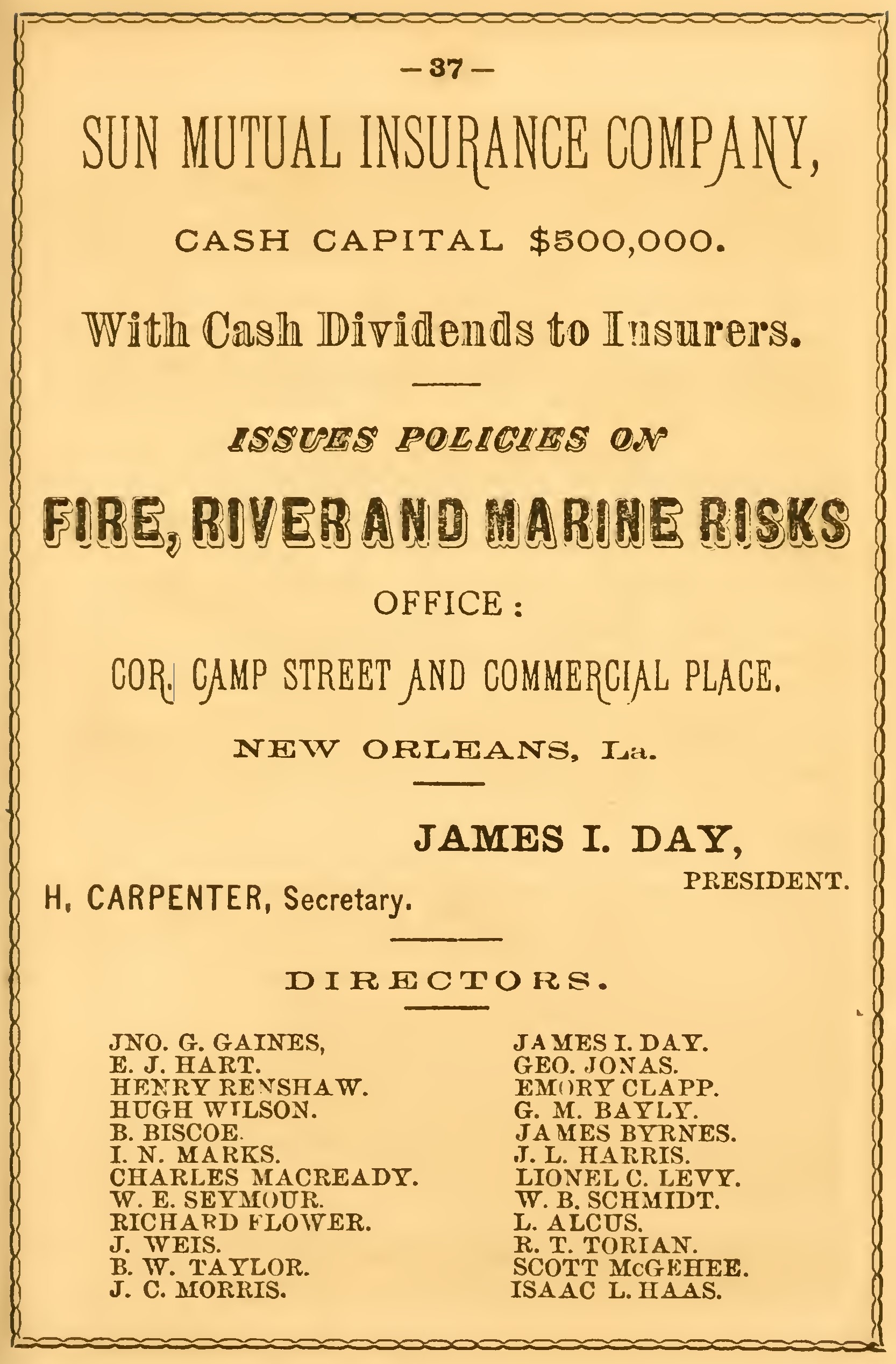
Now come, great Sage, a living grand memorial
Of Man’s descent tlirongh lineage “Arboreal.”
“The Missing Links” — those pre-historic sires
Whose loves and lives a wondering race admires.
When all was void, and Chaos ruled the Spheres
Back thro’ the shadows ot unfathomed years
Life’s first faint spark flashed thro’ a rayless night.
And quivering fell on the rude Zoophyte.
“Old Soaker,” Sponge, soon felt the genial glow,
Mid coral castles, reared in depths below.
Where brave Sea Nettles waved caressing arms
To cuirassed Polyps, enamored of their charms.
Where the Mulusca, fierce with yearning fires,
Thrill’d pearly shells with tender, soft desires;
And Periwinkles smoothed their coats of mail
To court endearments from the wooing Snail :
There warmed the spark in its Crustacean bed,
’Till Shrimps, enraptured, on its sweetness fed.
Impassiond Lobsters clasped seductive claws,
And jealous crabs succumbed to Hymen’s laws.
But kindling more — the Piscine Tribe prevails,
Its incandescence gauds the Dolphin’s scales,
Transforms Sea Dragons into sighing swains,
And distracts Sheepheads with bewitching pains,
The Flying-Fish then onward wafts the spark;
’Till lovelorn passions thrill the cruel Shark.
And sweetest transports swell the mighty deep,
To where the Whales uxorious vigils keep.
Still brighter yet — the Amphib’s grow at length,
With Mermaid graces and with Triton strength :
The Tadpole whisks it from the Ocean floor,
The broad backed Turtle bears it on to shore,
Where suckling Leeches draw its baby sighs,
’Mid stolid Frogs transfixed with mute surprise,
While Caimans make, with new-born joy elate,
And roars the Walrus, eager for his mate.
In Reptile form, then creeping from the bank
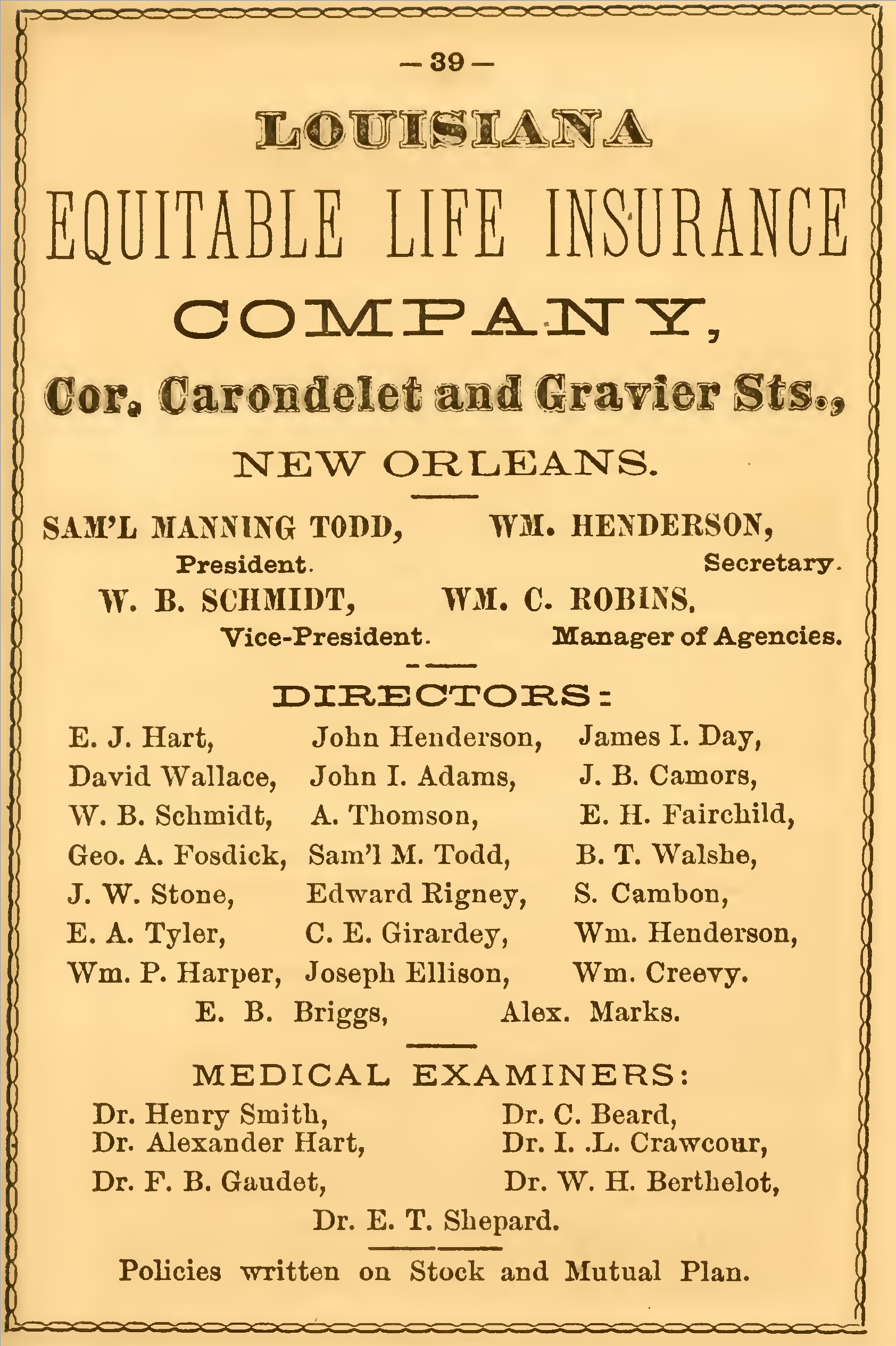
Its savage lustre lights the Serpent’s track,
To blush in beauty on Chameleon’s back,
With ardent flame it fills the Scorpion’s eyes,
With rainbow hues the meek Iguana dyes,
Until, at last, in sunshine’s wealth unrolled,
The Salamander floods with molten gold.
Refulgent now — its vivifying rays
Spread far and wide — seen in the tassel’d Maize,
In crimson Carrots piercing Mother Earth,
In emerald Pinas yielding fragrant birth:
Festooned Bananas with its glories shine,
And tribute Grapes burst forth with living wine.
E’en bannered Blossoms, kissing wanton air,
In shapes as varied as their hues are fair,
Waft quickened incense up to arching skies,
That blush with joy and laugh thro’ starry eyes.
Ripe lipped Verbena, on her drooping knee,
Pale browed Magnolia, from her stately tree,
Sweet Passiflora, dashed with bloody stains,
All glow with life that tingles in their veins.
Then Insects come to cheer the flowery glade
With tender dalliance ’neath the leafy shade.
Bright buzzing Flies, borne on the languid breeze,
Keep time with Locusts, droning in the trees:
Grasshoppers melt to lazy Silk Worm charms,
The Moth seeks solace in the Beetle’s arms.
Tobacco Grubs essay the loftiest stalk,
In love sick search of the Mosquito-Hawk.
While Spiders weave a daintier, rosier, net,
Than ever maiden for fond lover set.
The very winds, pulsating amorous sighs,
Beneath the beating wings of Butterflies.
And now as years in countless cycles roll,
Still stronger, brighter burns the living coal;
The Rodents come with sleek and glossy hides,
All fleet of foot to catch reluctant brides.
The sexton Mole, from out his earthy lair,
In haste to meet the timid blushing Hare;
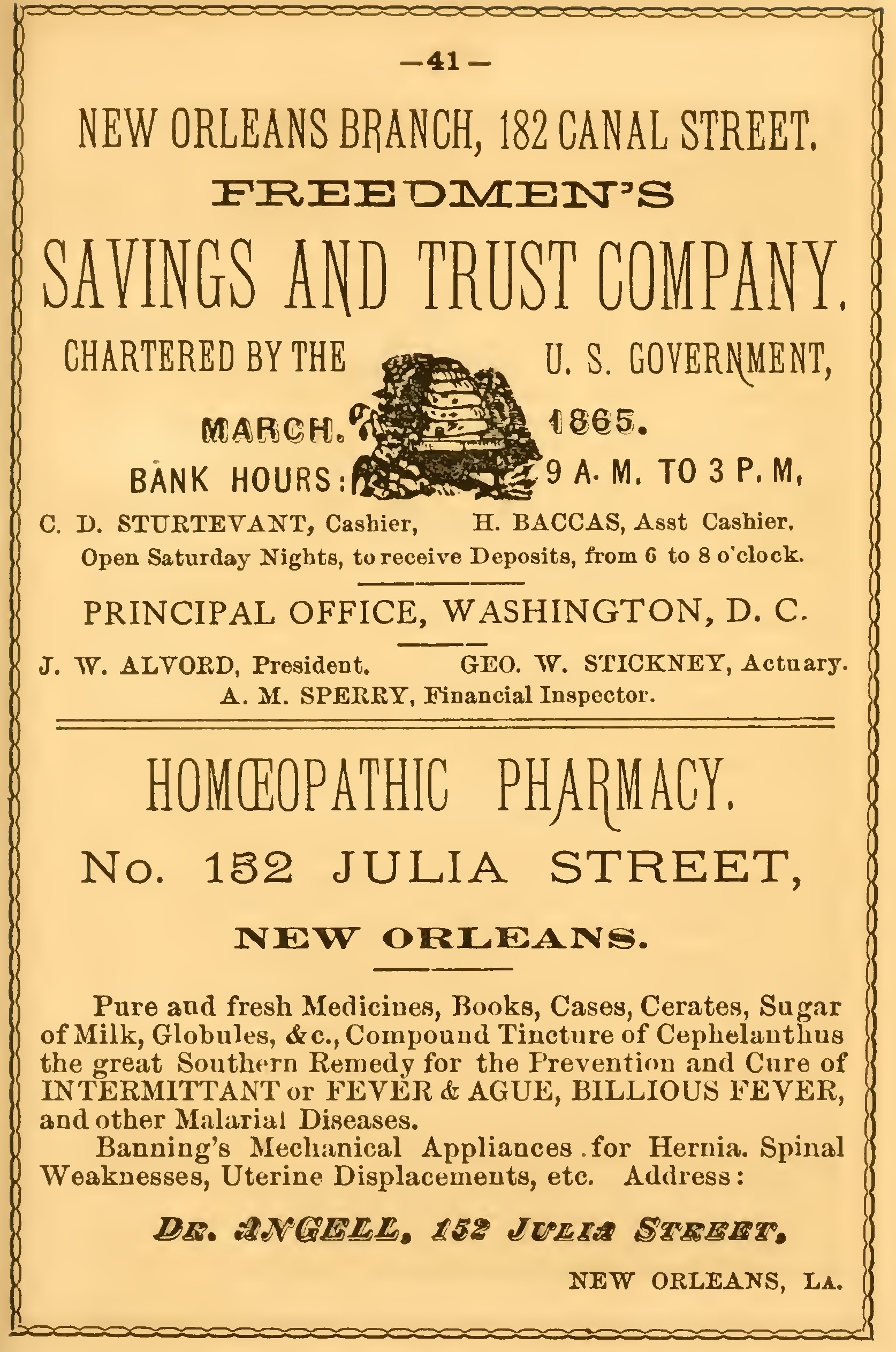
Down rugged trunk to woo the virgin Mouse;
The Rabbit lost in low-tongued dreamy chat,
With that shrewed robber, the licentious Rat,
While high o’er all the wedded branches through
Peeps the Opossum at the Kangaroo,
Now loit’ring thro’ Earth’s fields of living green,
The Rumanantia come to dot the scene;
The fleecy Ram, with frontlet hard and bold,
The meek-eyed Ewe, pale matron of the fold;
With antlered crest, the lithe aad sinewy Deer,
The vigorous Goat (the symbol of Buck Beer);
The untamed Bison, with tempestuous mane,
The patient Camel of the trackless plain,
The tall Giraffe, instinct with lofty pride,
The fleet-foot Zebra, with his stripe-slashed hide;
And then the Bull, of brawn and beetling brow,
Leads in the dainty, cream-distilling Cow.
O golden days! Age of Arcadian joy!
Ere Sorrow’s birth, when Love knew no alloy!
Scant wonder then the flame waxed fierce and strong,
When the Carnivora joined the countless throng.
The Hedgehog, winking, from his spiny box,
With admiration, at the cunning Fox,
Which joins the Coon, well versed in forest lore,
In pleasant discourse with the tusked Boar,
From fields abroad swoops down the flitting Bat,
With bated whispers for the rakish Cat,
Which slips away from purring Pussy’s sight,
On revels bent, and staying out all night.
The noble Dog by the gaunt Grey-hound led;
The hairy Skye, the Bull with brutal head;
The Sleuth, keen scented on tbe trail of game,
All now the victims of a tenderer flame.
E’en friendly Bears their hopes and fears discuss,
Before the surly Hip-po-pot-a-mus,
While listening Leopards to the passion own;
Hyenas laugh and drop the crunching bone.
The Lion smiles away his heated spleen,
And harmless sleeps the Tiger on the green.
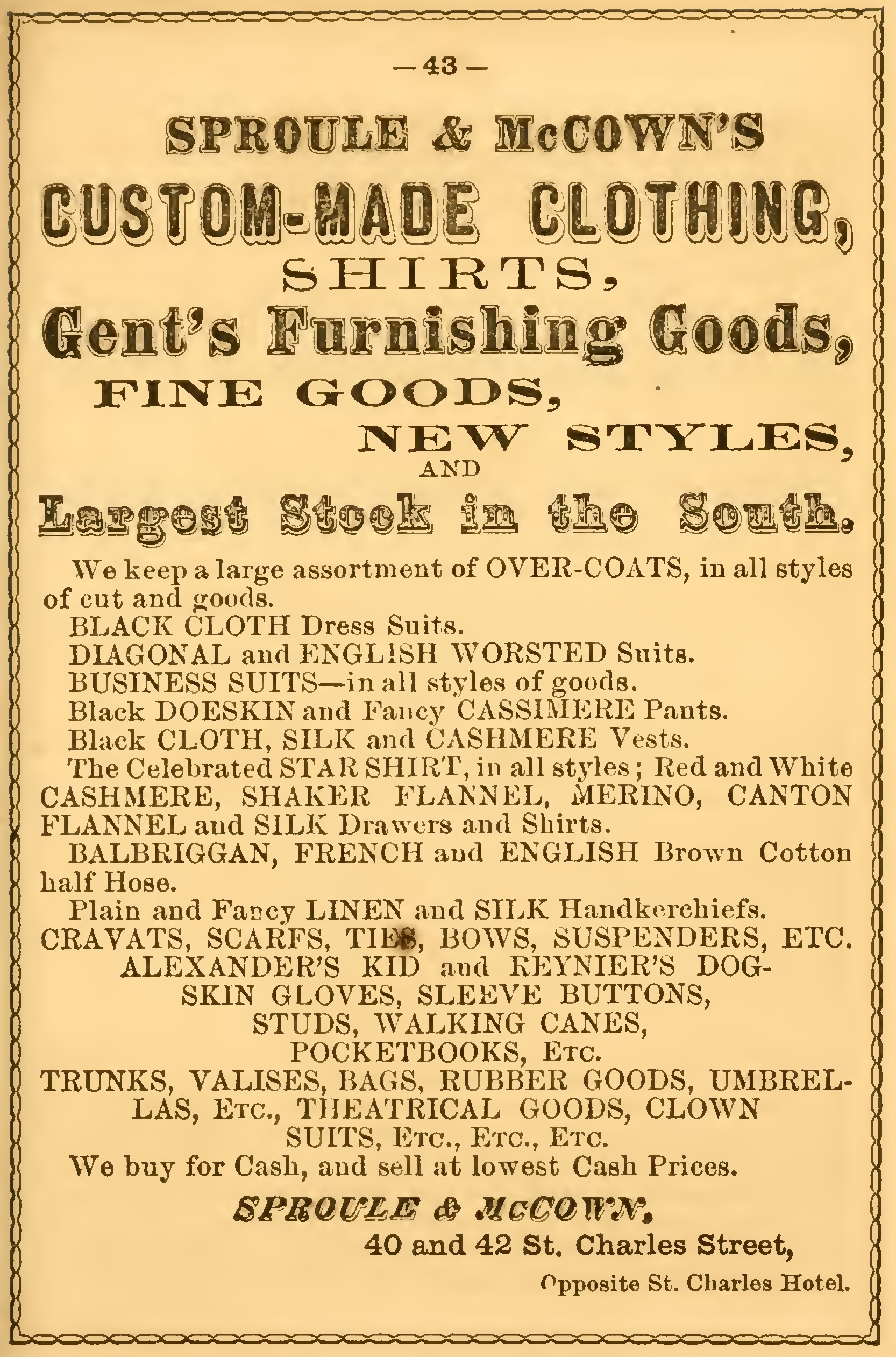
Unite to form the river’s rushing tide,
So all these types, in Darwin’s matchless plan,
Converged, assert the lineage of Man.
From Birmah’s woods, the Elephantine home,
Behold his pith and iron muscle come;
His ardent temper from the tangled grove,
Where the Rhinoceros dallies with his love;
His tastes exhaled from that Westphalian bog,
Where wallows still the epicurean Hog.
And his endurance from Arabia’s strand,
The tireless Horse produces at command.
Thus well endowed, ah! Darwin! — then — alas!
We trace his genius to the sapient Ass.
Enchanting age of soul dissolving bliss,
When life’s whole span was one long burning kiss.
No wonder, soon in some bright torrid vale,
Where Quadrumana waved prehensile tail,
To honeyed airs aglow with desire.
Arboreal loves should nobler types aspire;
Or Chacma Monkeys fall like ripened grapes,
Resistless victims of the Bearded Apes;
That Mandrils, lost in soft voluptuous swoons,
Should grace the nuptials of the bold Baboons;
And Chimpanzees from waving tree tops hang,
To court caresses from the fond Orang.
Oh! rosy hues of Time’s dim twilight morn.
In such an hour the “Missing Link” was born;
The great Gorilla, flinging wide the gate
Of Darwin’s Eden; and our high estate.
Through nature’s void, by arm creative hurl’d
Thus fell the spark which warms and lights a world;
Its pregnant beam first thrill’d old Ocean’s caves,
In myriad forms pulsated through its waves,
Then clad with verdure arid rocks and sand,
Bade waving branches plume the smiling land;
Sighed ’neath the shades where burst forth living springs,
And peopled air with gauzy, rain-bowed wings.
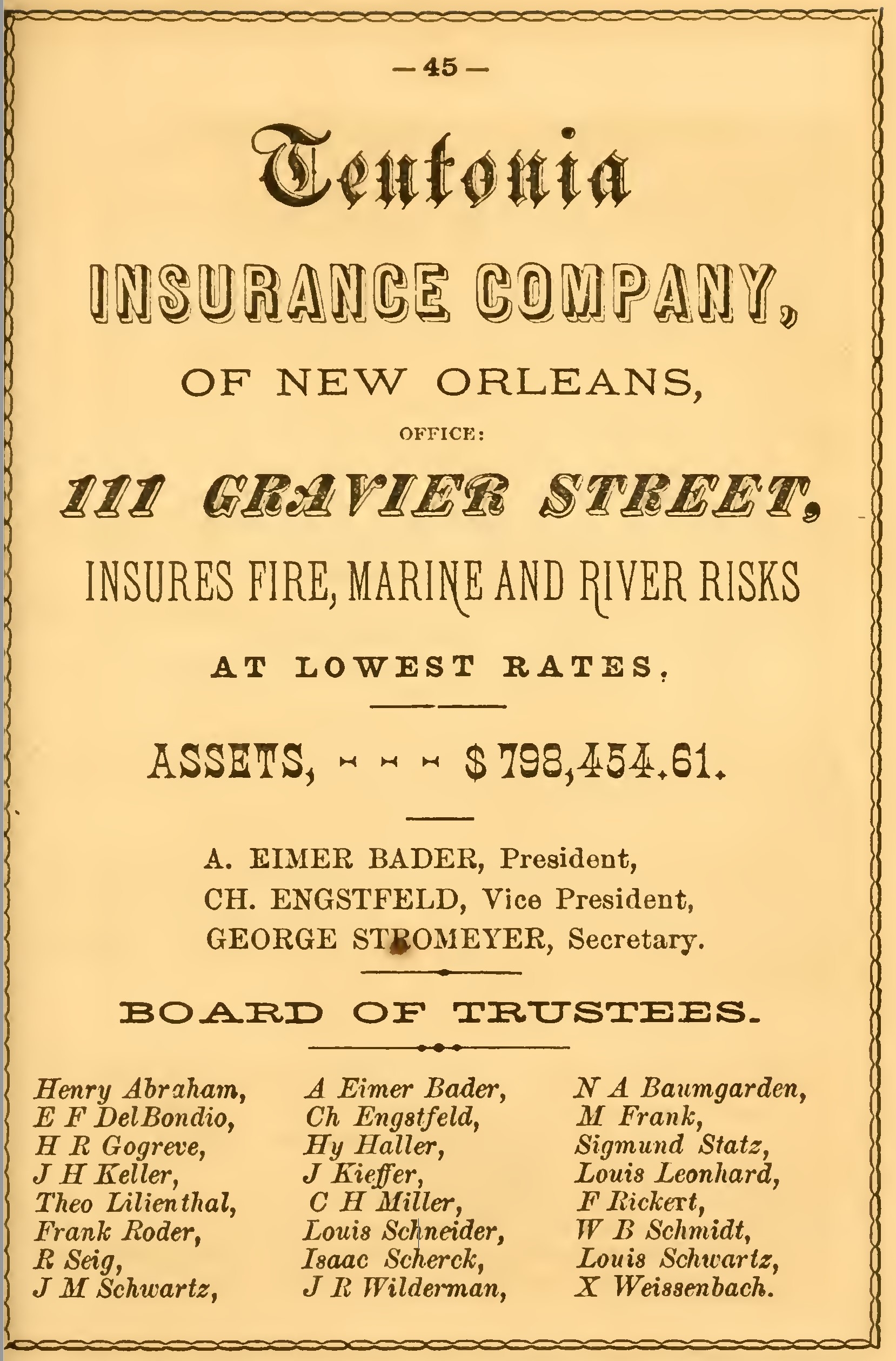
Of rites delayed — but little time they wait, Evolving races, sluggish, wan and cold,
Wake into natures active, fierce and bold;
Selection’s law, their joys unconscious guide;
To nobler types, then thus unerring glide,
Perfection’s height are scaled up to the brink
Of that abyss — spanned by the “Missing Link,”
There simian Cupid stands in hairy state;
But oh! what Psyche was his nobler mate.
MORAL.
Here sleepless science pales its searching power,And awful mystery shrouds the nuptial hour;
Our father Ape, by all with pride confessed
But she, whose love his ardent passion blessed;
Like Pleiad lost, is hid behind Time’s veil,
We only know — her offspring dropped the tail.
The problem vast new Darwins shall engage
To swell the knowledge of a future age,
Until the secret countless cycles sealed
Bursts into life, and Man stands forth revealed.
Here for the present we close our history of this mysterious company, whose munificence and refined taste have furnished to the Carnival season its crowning glory.

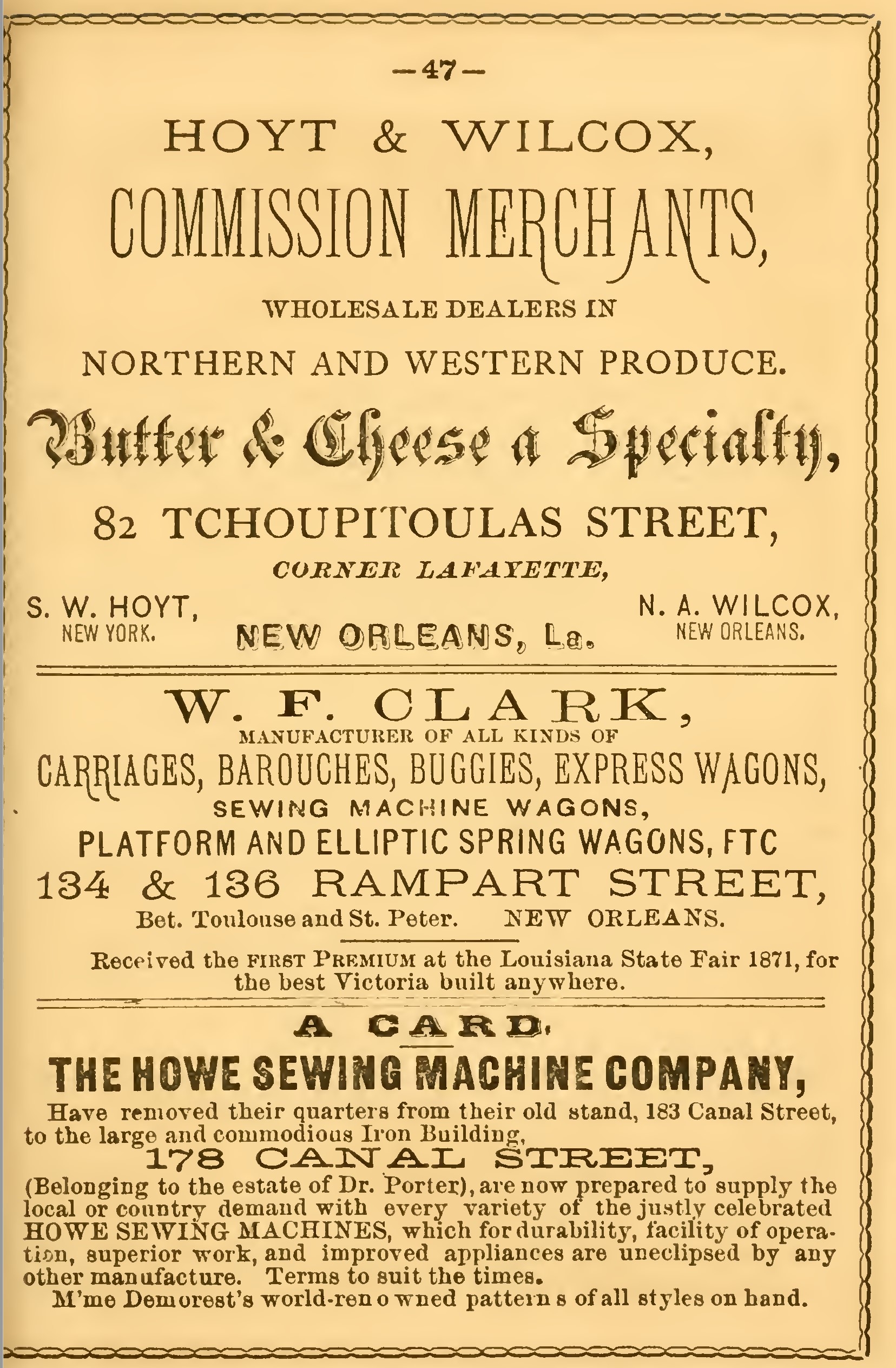

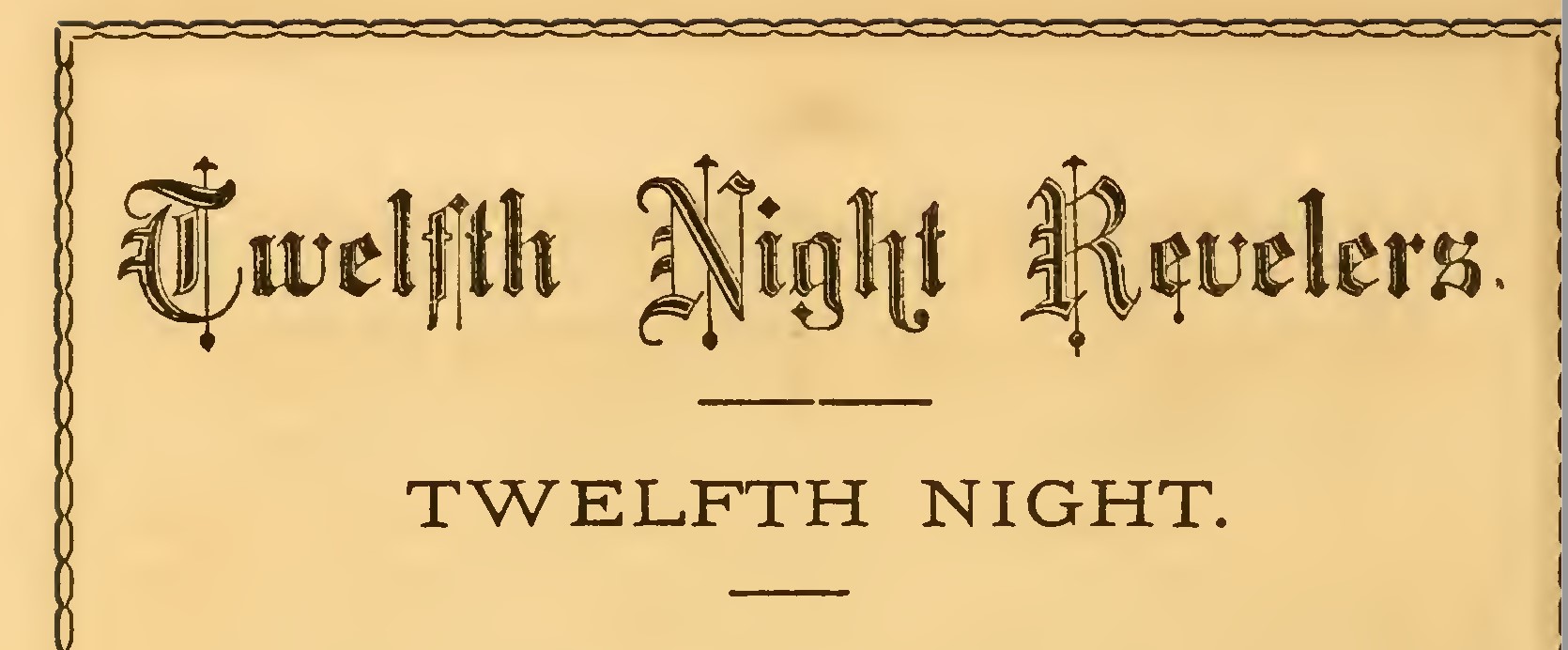
The anniversary of a day when the Three Wise Men, with their gold, frankincense and myrrh, were guided by a star in the east to where our Infant God had been born in Bethlehem; a day which, since the darkness of the Middle Ages, has been celebrated throughout Christendom, is surely worthy of honor from a Christian community.
The first commemoration of the manifestation of Christ to the Gentiles, or as it is known in the church, the Epiphany, was during the reign of Pope Julius I., A. D. 813. At that time Melchoir, Jasper and Balthazar, the three Maji, or Wise Men, were represented as three kings, by certain of the priesthood.
They proceeded to the church with much pomp, guided by a star improvised for the occasion, and bearing gifts of gold, frankincense and myrrh. In the temple was constructed a stable, containing an ox and an ass, with an infant in the manger and a representation of the Madonna. After kneeling at the nave and imploring a blessing from the Most High, the gifts were formally presented.
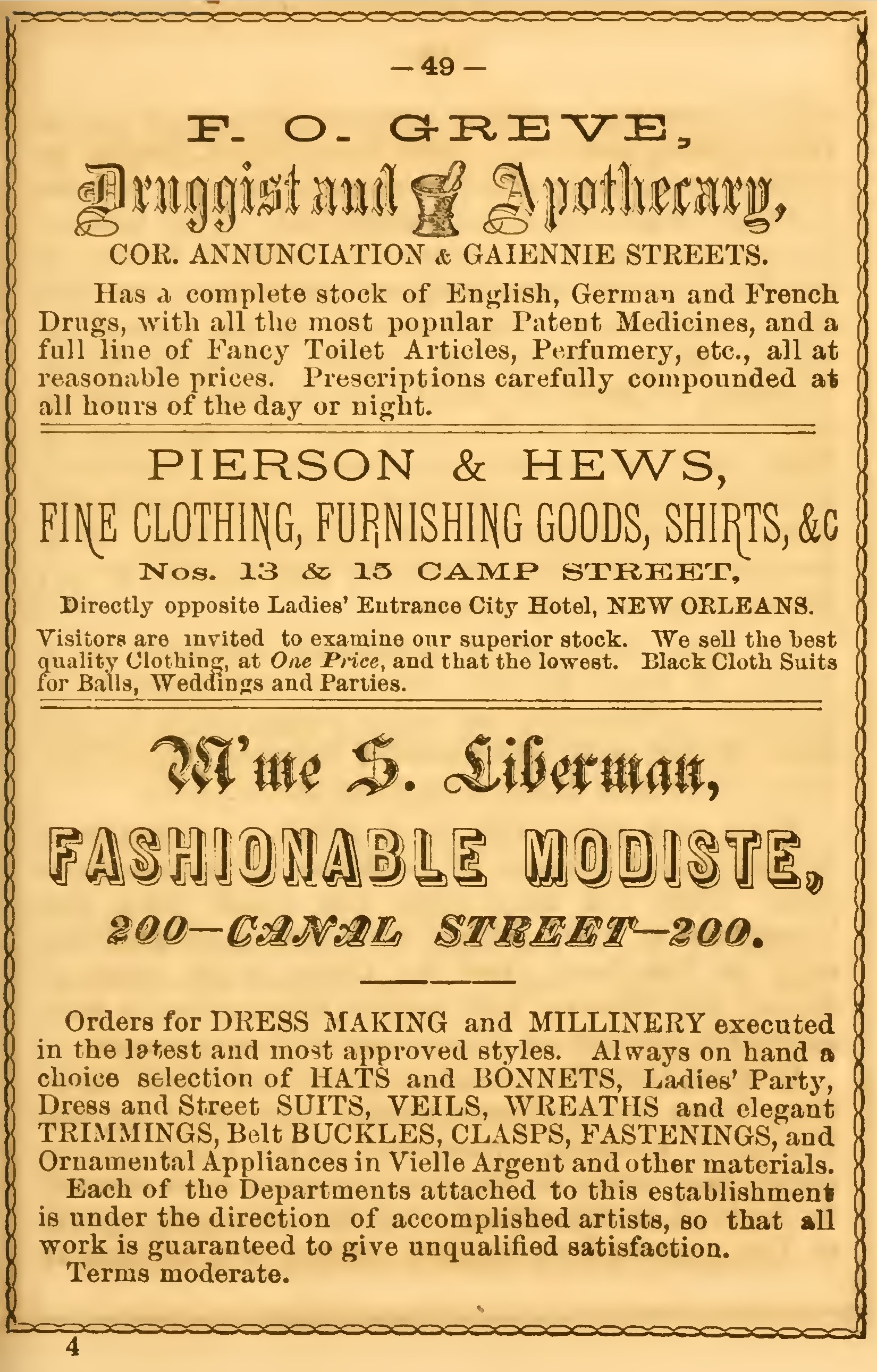
The celebration of this continued until as late as 1336, when about that time both in England and France the occasion became rather a social than a religious one. The bean cake, much in vogue even now among certain of our Creole families, was then first introduced. The person fortunate euough to secure the bean in a slice of the Twelfth-day cake reigned supreme over the day’s festivities. An instance is on record in which Mary Queen of Scotts arrayed Mary Fleming, a Queen of the Bean, in her own robes and jewels, and for that day she was mistress of Holyrood. A century ago, the kings of England, with the Knights of the Garter, Thistle and Bath, marched in procession on Twelfth Day, with presents of gold, frankincense and myrrh, to the Royal Chapel at St. James.
As time wore on it gradually declined to a period of mere private sociality, and after having been celebrated for many generations by the Lord Mayor and Aldermen of London, their festivities are now limited to presents of cake.
None can deny but that holiday celebrations benefit every branch of business in the community. They not only relax the mind from the humdrum of life, giving new strength and energy to the body, but by them large sums of money are thrown into active circulation, a considerable portion of which comes from abroad.
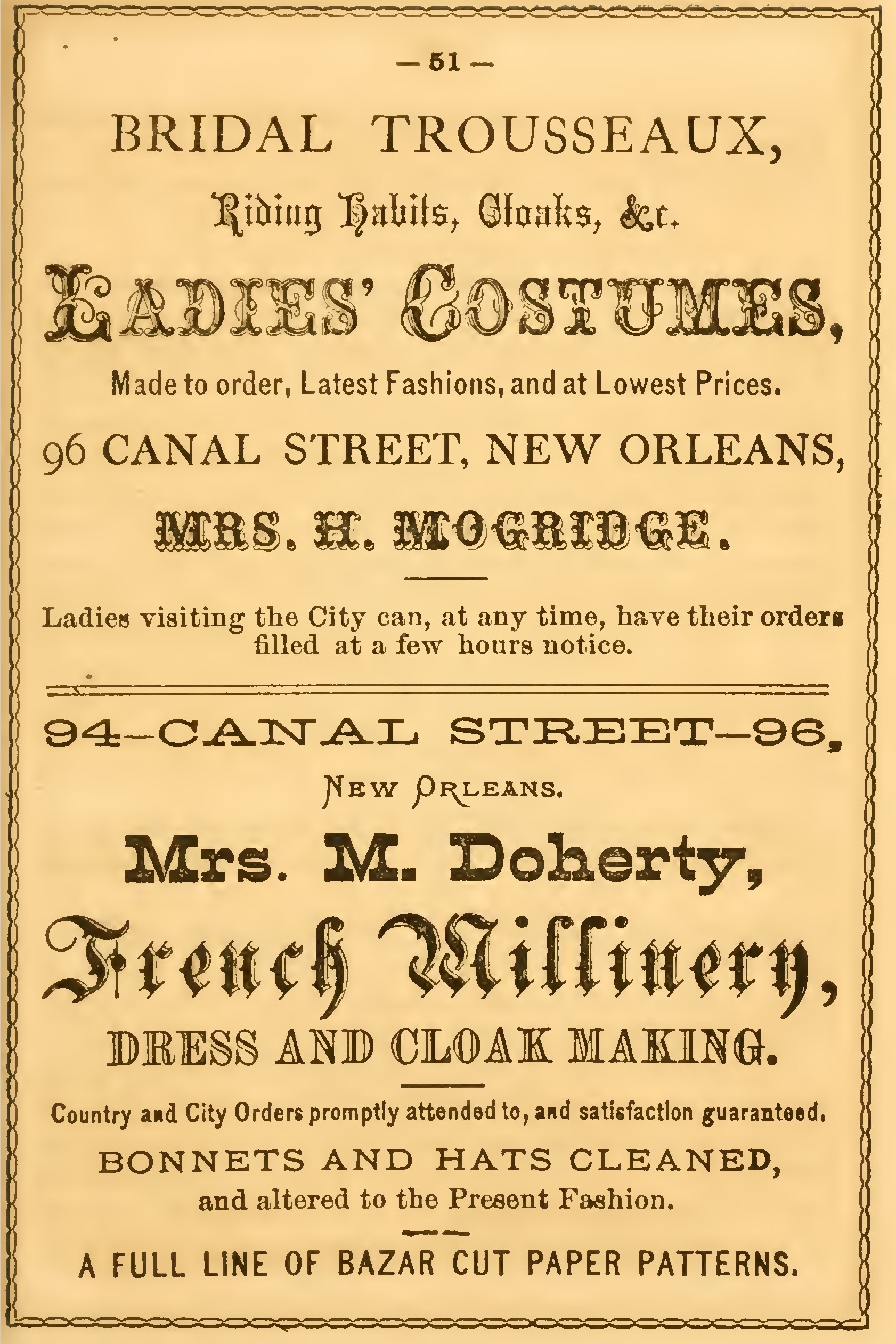
It is fit, therefore, that in a country where holidays have been almost totally abolished by the Puritanic element introduced in its early settlement, that some of the most notable ones should be revived as consonant with the changing spirit of the age we live in, and among all, no one is more beautifully appropriate than that of Twelfth Night, and thanks to the Revelers, whose
was held on Thursday evening, January 6th in that year, it was established in our city, and has since been observed with a royal magnificence worthy of its antiquity.
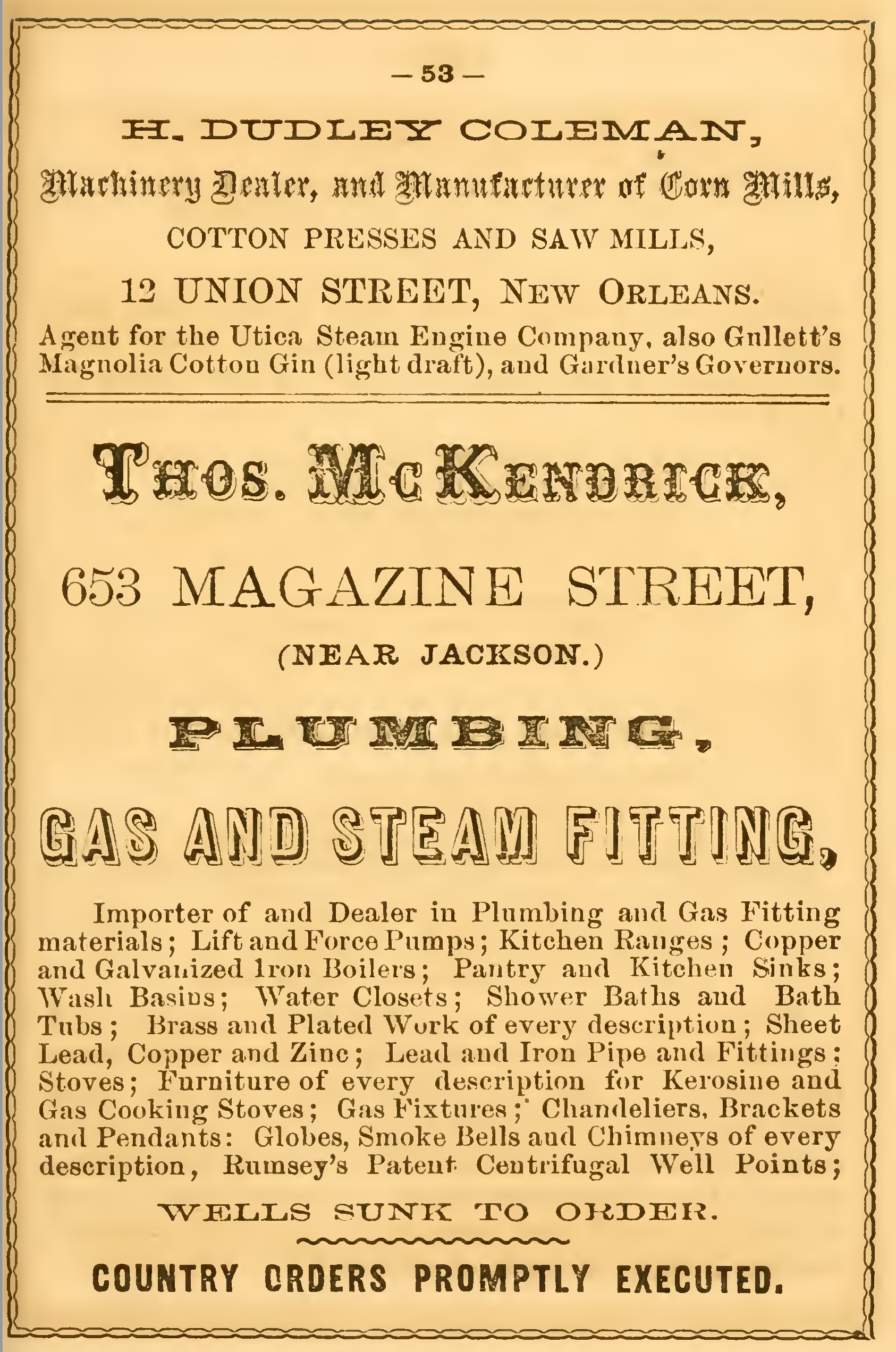
An immense throng greeted this first turnout, which appeared at about fifteen minutes to nine o’clock on Royal street. The design of the display was the congregation of the representatives from all the earth, to participate in all the festivities of Twelfth Night, prepared by the Lord of Misrule. Europe, Asia, Africa and America were appropriately represented, and the procession was pronounced by all, one of the most elegant affairs ever seen on this continent. At the Opera House the following programme was handed around among the guests:

January 6, 1870,

Mirth and Jollity, with their attendants, prepare the Twelfth Night Cake, and by their Heralds summon the Four Quarters of the Globe to the Festival —

When the members of the organization had passed around the floor, they invited their lady friends down, and in a few moments the floor that had been dedicated to the revels of the mysterious hosts, was transformed into a ball room, where the “ dance went merrily on.” and “ Twelfth Day “ had lapsed into the “thirteenth” ere the happy scene had ended.
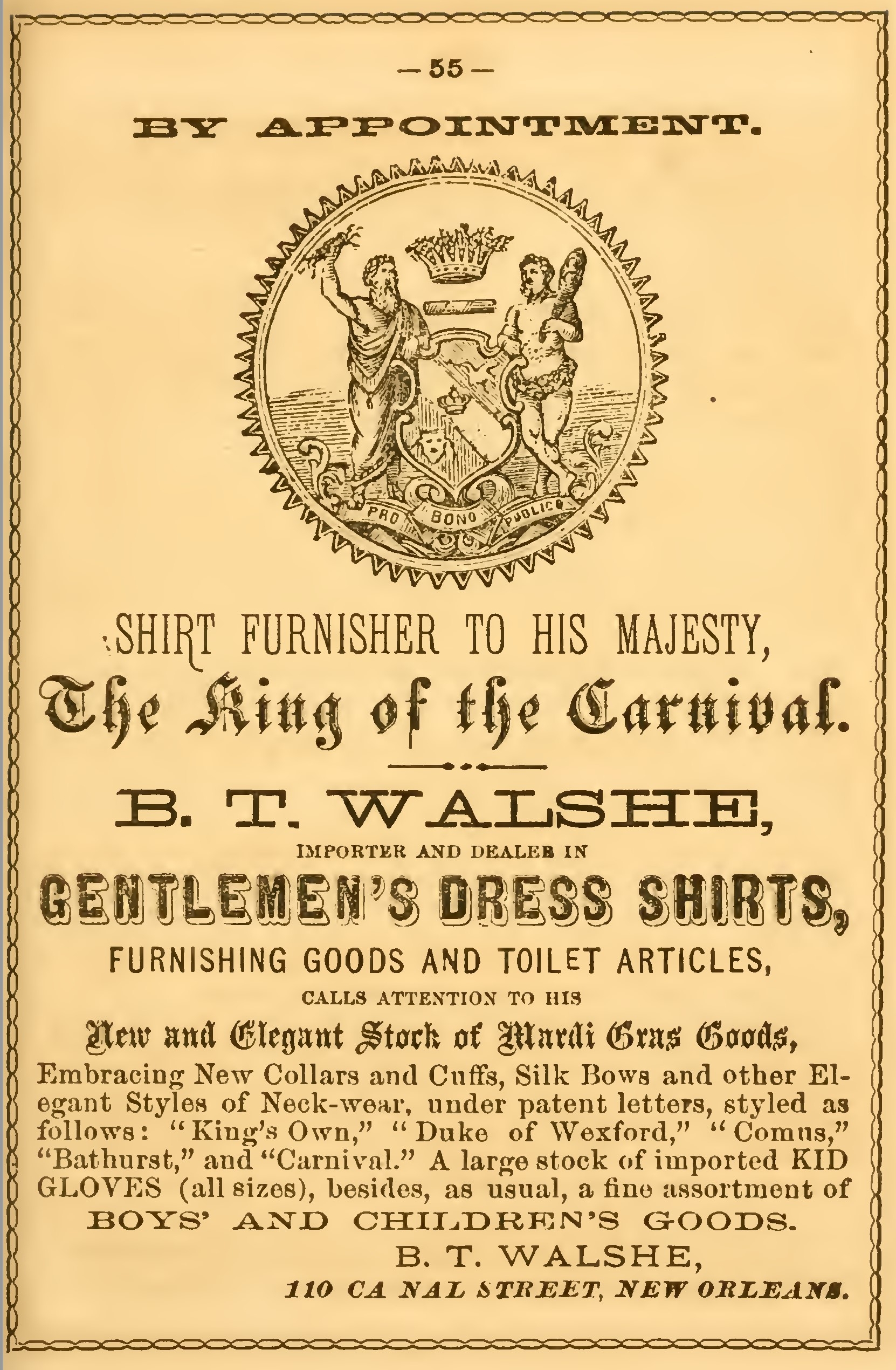

On the evening of the 6th of January, 1871, the second pageant of the Twelfth Night Revelers was given.
The entire central district of the city was one brilliant scene of life and gaiety. Tbe whole population was in the streets, and, with the bright and balmy night, the gay throngs, and the flashing lights, the tout ensemble was one which belongs only to New Orleans among American cities. When it was found that the pageant was to represent the familiar characters whom Mother Goose has made immortal, the delight of the spectators can better be imagined than described, and as the costly, fantastic procession filed slowly by, each new tableau was greeted with shouts of enthusiastic recognition from the innumerable throng.
The pageant was headed by a grotesque and gorgeous figure with the title of the Lord of Misrule, who was followed in regular order by the characters who have been handed down to us in the old nursery rhymes of that mysterious poet Mother Goose.
At the Opera House, the tableaux elicited the warmest applause, from one of the most brilliant audiences ever gathered within its walls. The ball which wound up the entertainment was a joyous termination to an event which will ever be pleasantly remembered by all who were present.
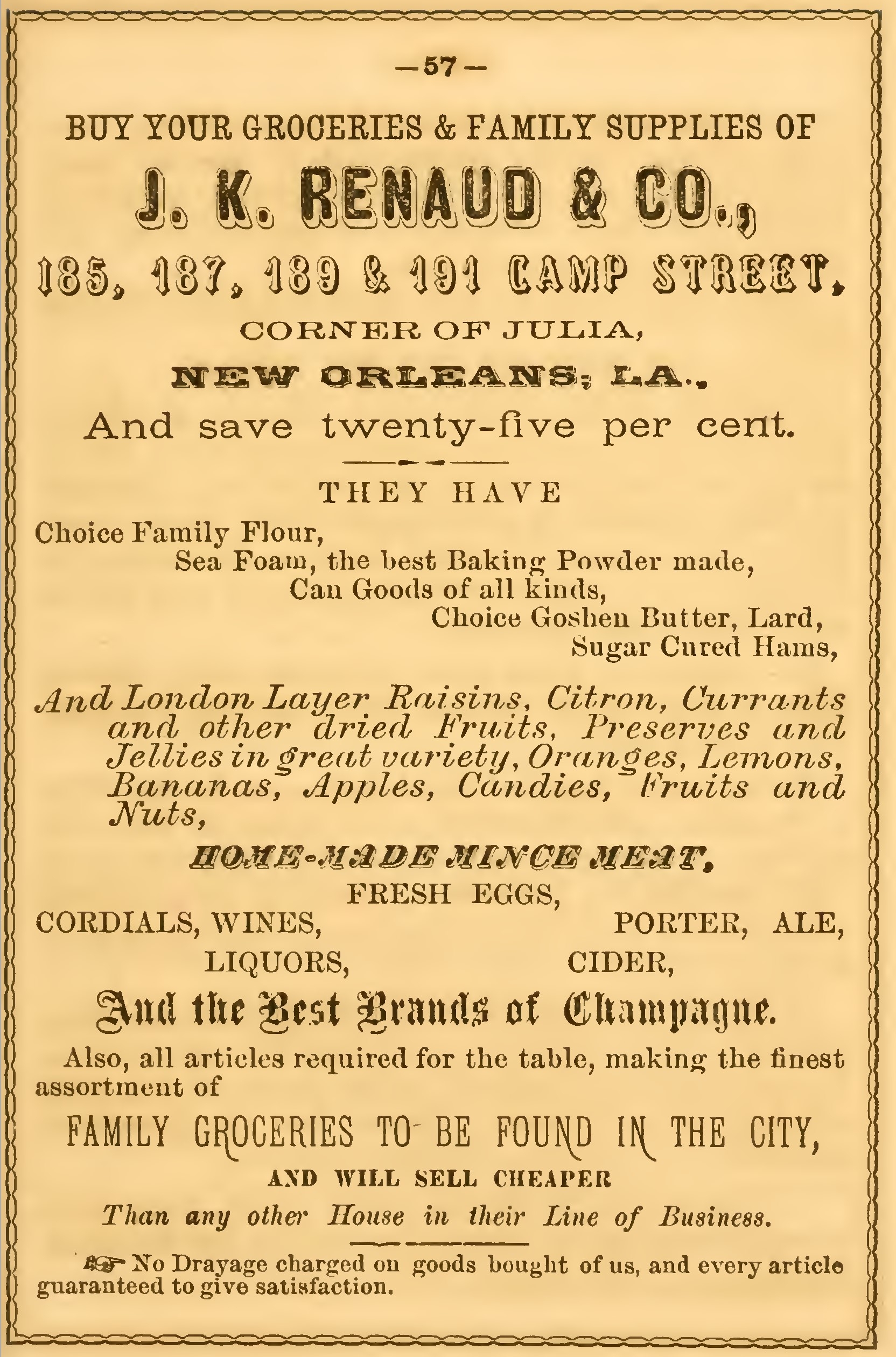

The third Festival of these unknown Revelers was a splendid effort. With a more perfected organization, and with increased expenditure, they came to the front, determined to out-do their former efforts and realize the brilliant expectations which their many admirers had founded upon the former displays of their order.
They could scarcely have chosen a better theme than
In all the realm of literature there is no richer field than this; and our Revelers certainly culled its very fairest flowers as they wandered. Headed by Don Quixote (a pardonable theft from other lands) the pageant showed Humor, Its Gods, Its Fathers, Its Fountain and Its Tide, in a splendid and harmonious sequence.
Shakespeare, rare Ben Johnson, Gay, Swift, Sterne, Goldsmith, Burns, Scott, Irving, Dickens and Bret Harte!
These were figures which followed in the Tide of Humor; each one set in a group of his own choicest creations, and clustered with them on their respective pedestals, rivaling in chiseled splendor the majestic sculptures of Praxiteles himself.
In all the appointments of artistic elegance this display was considered as being yet unequaled. It was a daring flight into the realm of art, this attempt at marbleizing Humor, but the Revelers assuredly achieved a brilliant success.
The closing ceremonies were, as on their first occasion, similar to those observed by the Mystick Krewe.
After the falling of the curtain on the closing tableau the usual ball commenced in which the fashionable company joined, finding no less delight therein by reason of their ignorance of their Hosts.
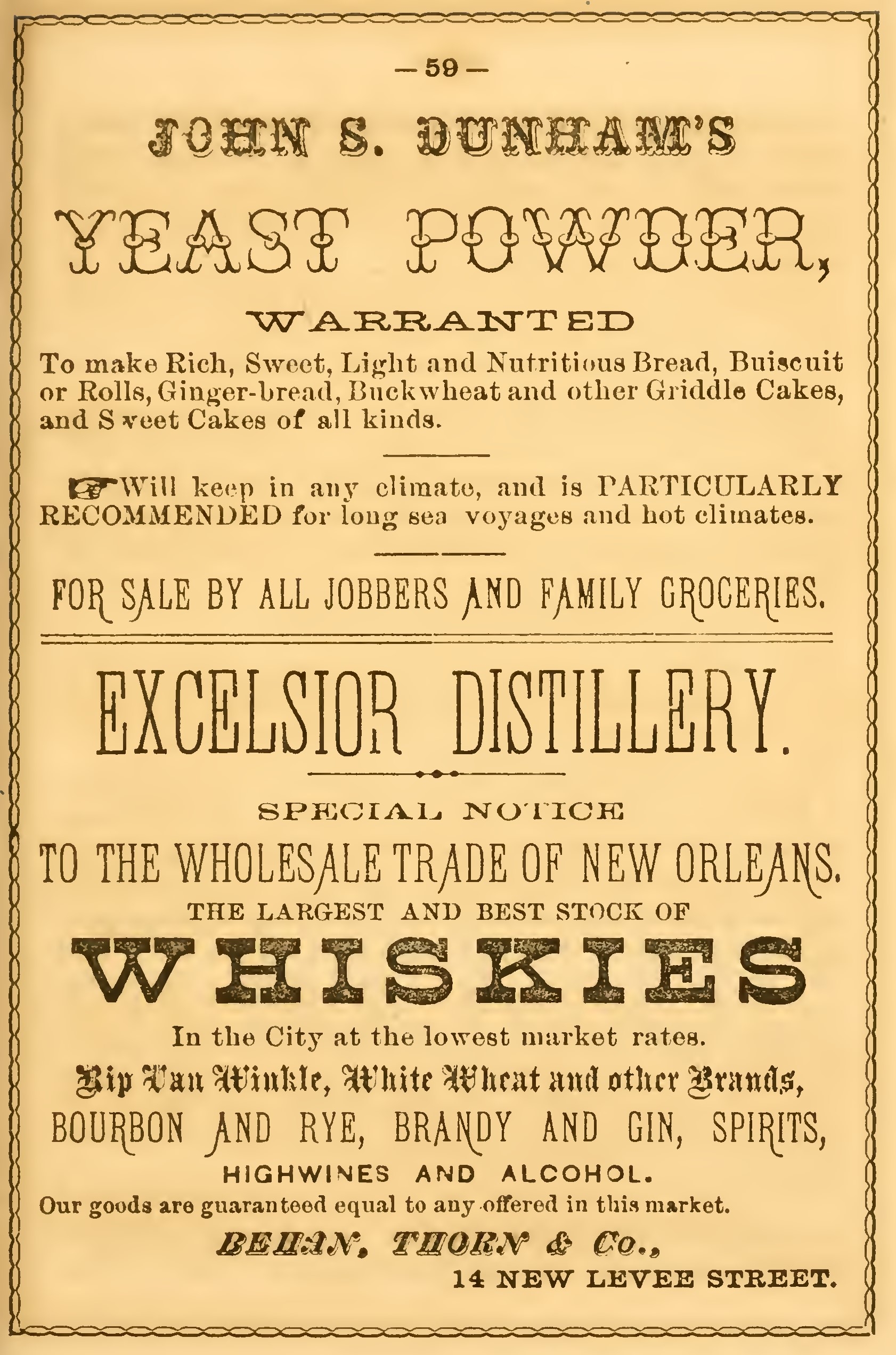

This year the Revelers carried their representations into a still more elevated field of literature speaking with reference to utility and intrinsic dignity. In doing so they paid a merited tribute to the greatest genius ever produced by Louisiana —
JOHN JAMES AUDUBON,
The songs of all the winged choristers,
And in one sequence of melodious sound,
Pours out their music.”
It was a specially happy conceit of theirs that, while they reproduced the birds of Audubon with the most astonishing fidelity, and while each individual figure was perfectly true in plumage, proportions and coloring, to the original which it was intended to represent, yet these were grouped in tableaux which were in most instances deliciously humorous in their meaning.
It was a curious and an artistic accomplishment, and, in that sense the Twelfth Night Revelers exceeded any similar effort of theirs.
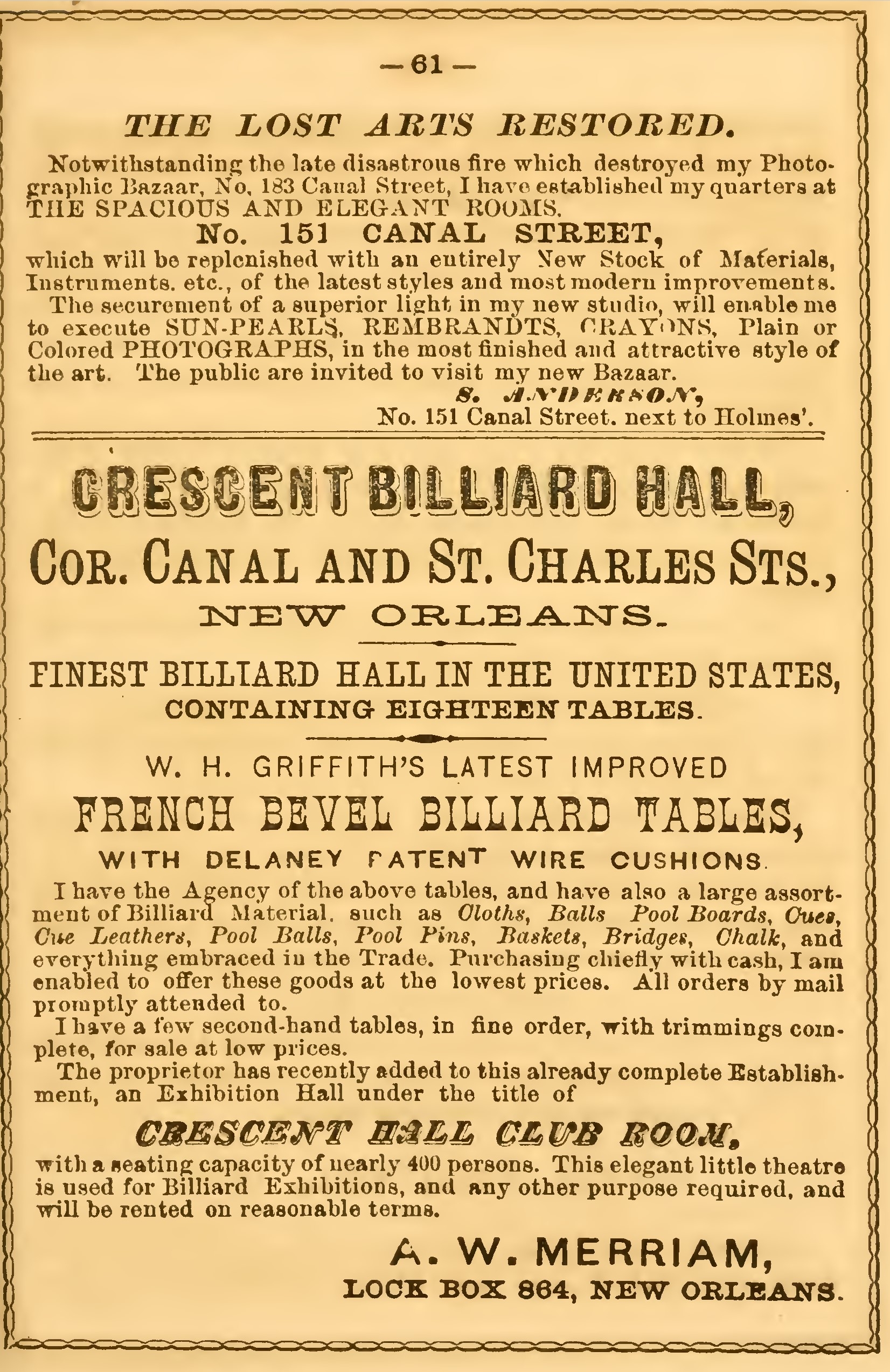
This magnificent pageant was composed of seventeen immense cars or floats, fifteen of which bore groups of from five to ten figures. They were brilliantly illuminated with lanterns, transparancies and calcium lights (furnished by Mr. Henry Perry, No. 141 Poydras Street), which, together with the guady coloring of the birds themselves, and the continuous blaze from the houses along their route, combined to make, not only one of the largest, but one of the most magnificent and imposing displays ever known in the history of our Carnivals.
There was also a novel idea shown in the management of the tableau. Instead of having a multiplicity of representations, the figures of the entire pageant were grouped in one colossal picture.
In the centre, on a raised pedestal, was the immense statuary, composed of
and around about him were the numerous birds which had followed him in the procession.
There were water, and marsh, and rocks, and sand, and trees and undergrowth, in which the birds were disposed appropriately; thus making one grand tableau in which more than a hundred different contrasting figures were collected.
was inexpressibly striking, and, when the curtain fell, it was sometime before the immense throng of spectators ceased their plaudits.
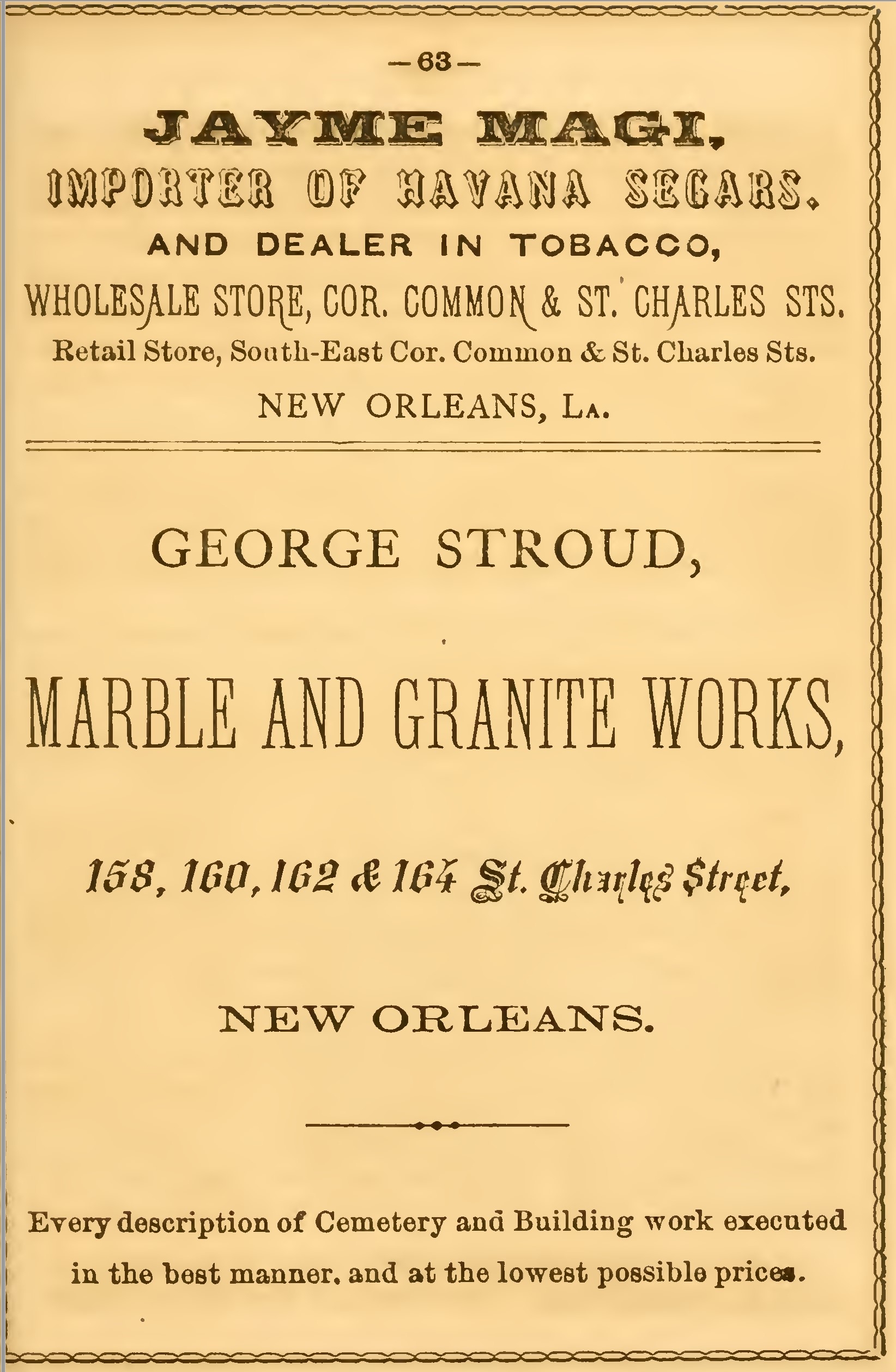

Tuesday evening, January 6th, witnessed the fifth festival of the Revelers, who, by their gorgeous displays and well-chosen subjects, have made themselves popular with our people.
It was an extremely happy conceit which was brought to fruition by the Twelfth Night Revelers, and it may be well assumed that no more novel nor original spectacle has been seen in any of the carnival pageants whose glories have annually been unfolded before this public.
The subject — Dolliana — embodying the creation of a world peopled with the inanimate objects of childhood’s worship of toys, involved at once a combination of such ludicrous and absurd features that the very inordinate degree in which such sentiments were revealed, was the theme for admiration, despite the more sober convictions that the subject was but a matter of trifling nonsense.
What more incongruous can be imagined than to expect grown people to find amusement in so simple a theme as a pageant of dolls and children’s toys, yet this episode transpired, and it may be assured that of tbe countless thousands who witnessed it, few could be found who did not earnestly testify to the pleased interest of the event.
It has drifted into a stereotyped phrase to recount how the streets were thronged and how they were brought forward in bounteous array, the usual cheerful and animated accessories always incidental to each similar yearly recurring event.
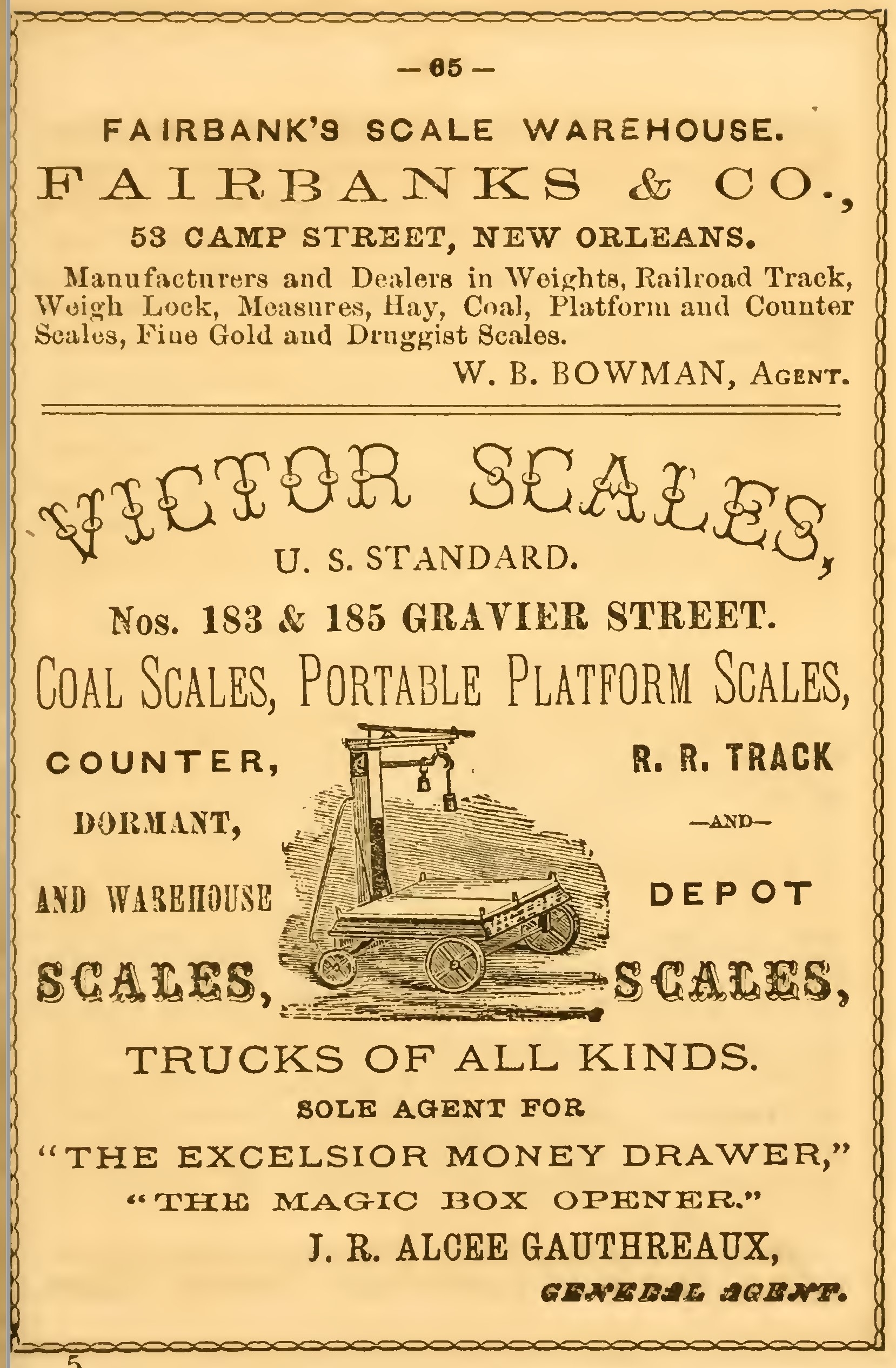
This significant emblem of Twelfth Night Revels rose in massive proportions from a beautifully draped pedestal and resting within a graceful dome, whose fair proportions and tasteful beauty matched well the brilliantly colored surroundings. Without, the dome was of burnished red and gold; within, delicate drapery revealed the ornamentations of golden stars and representations of butter-flies and humming-birds. Standing on the forward part of the car was seen an immense cornucopia with a plentiful display of fruits and countless dainties. Near by were lavish offerings of the products of the Sunny South, and upon the sides of the car appeared “January 6, T. N. R., 1874.”
Leading the van of her attendant subjects was seen the Queen of Dolldom, arrayed in all the gorgeous colors of which girl dolls are worshippers, and standing in the midst of such mediums of pleasure as dolls glory in, to-wit: the miniature cup and saucer, the sawdust-stuffed ball and a multitude of companion pieces, while before her were ranged eight square wooden blocks, through each of which was thrust a dollish head, and faced upon the blocks appeared the word “Dolliana.” Behind the Queen were piled toy building blocks, mountains high, as it were, and over all the spirit of gushing childhood breathed the refreshing sentiment of babydom’s earnest joys.
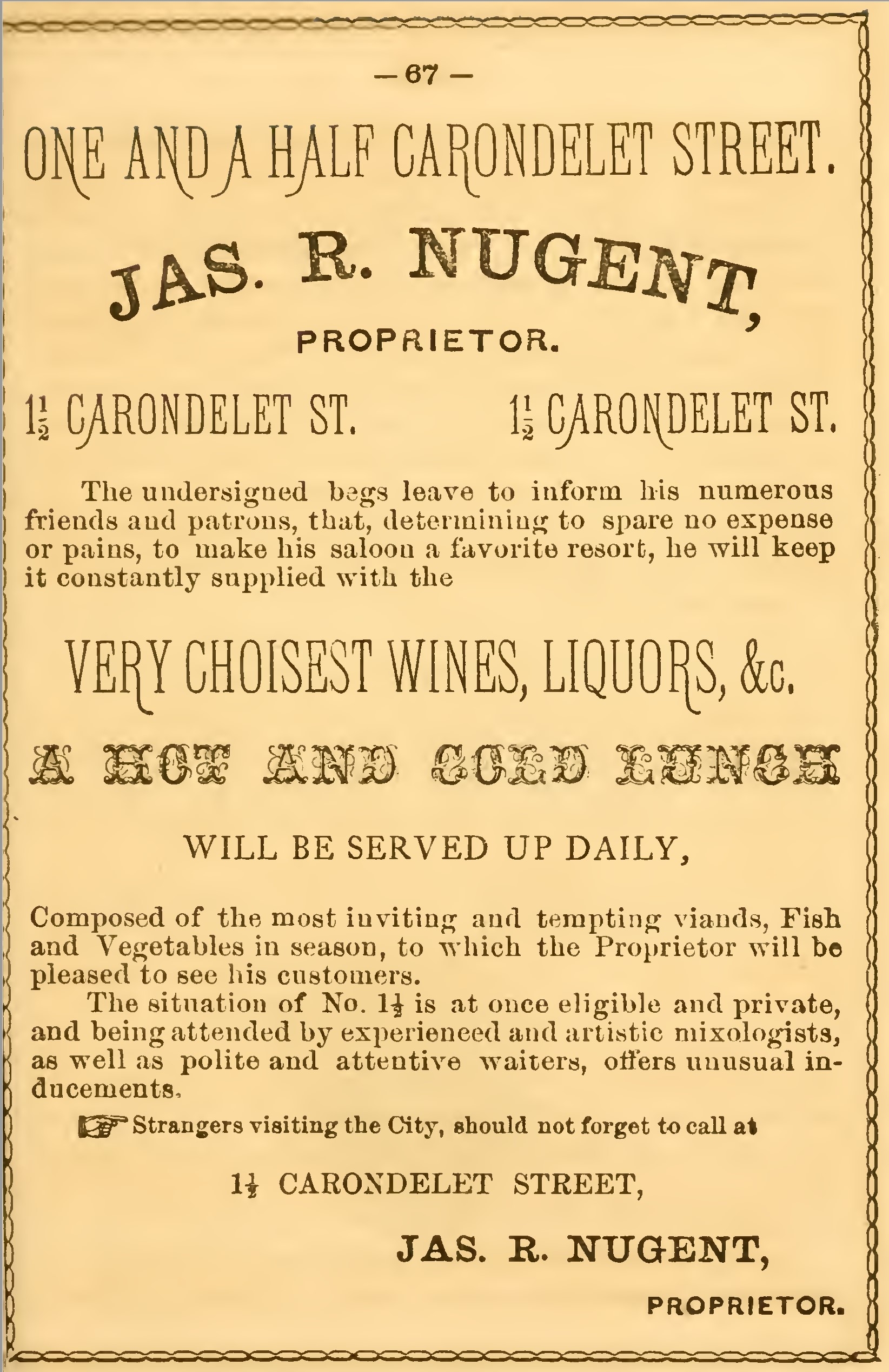
These were followed by groups on floats, representing Dolliana’s Army, Navy, Cabinet, Palace, Kitchen, Stable, Band, Theatre, and other toys known to joyous childhood.
At the theatre two tableaux were given, after which much interest was manifested in the question on whom Dame Fortune would bestow the honorable distinction of “Queen of the Revelers,” and “Maid of Honor.”
Bearing the immense cake to the centre of the stage, the Lord of Misrule took his place beside it, and it was soon surrounded by a vast concourse of ladies. The issue was soon decided, and the announcement ran around that Fortune had smiled upon Miss Louisa Chiapella and conferred upon her the first Bean, and she was accordingly crowned as the Queen of the Revelers, with Miss Cora A. Townsend, who, having gained the second Bean, became her Maid of Honor. Our story is all told. Music and dancing occupied the residue of the night, and in this respect the occsaion was really a most charming one.
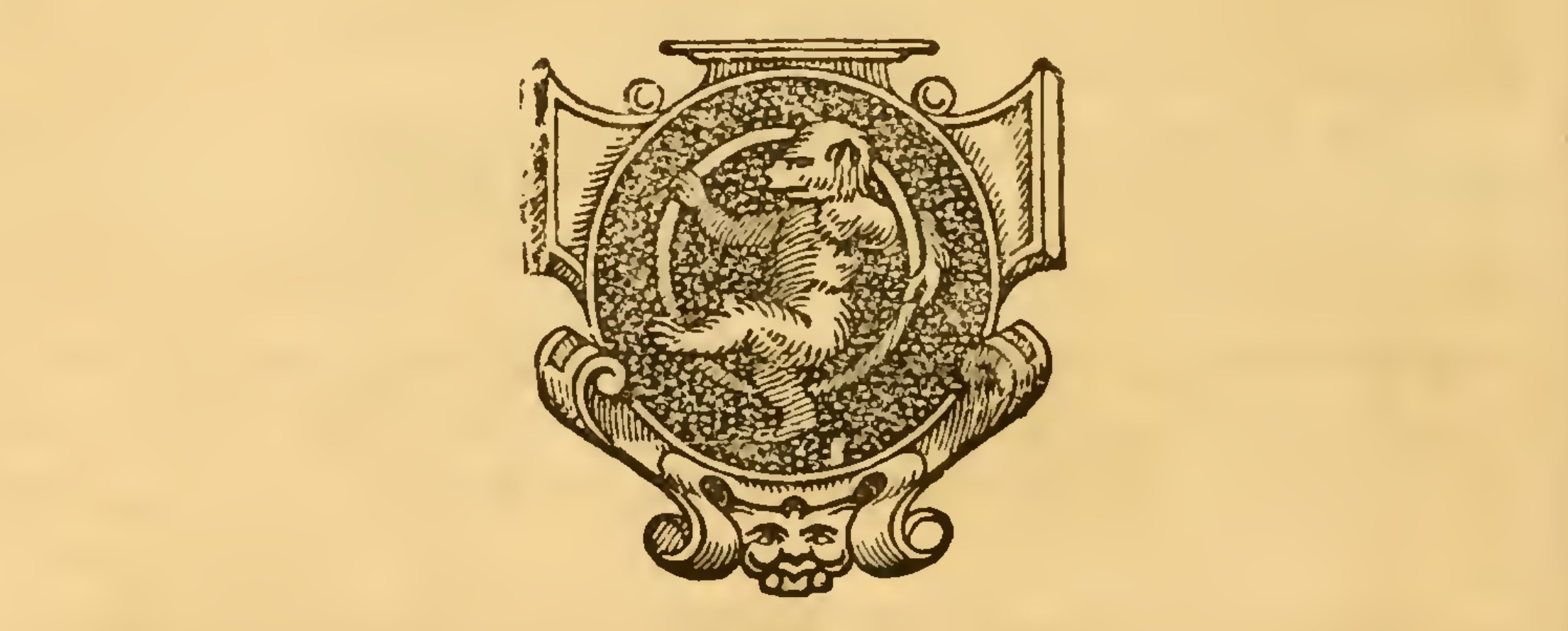
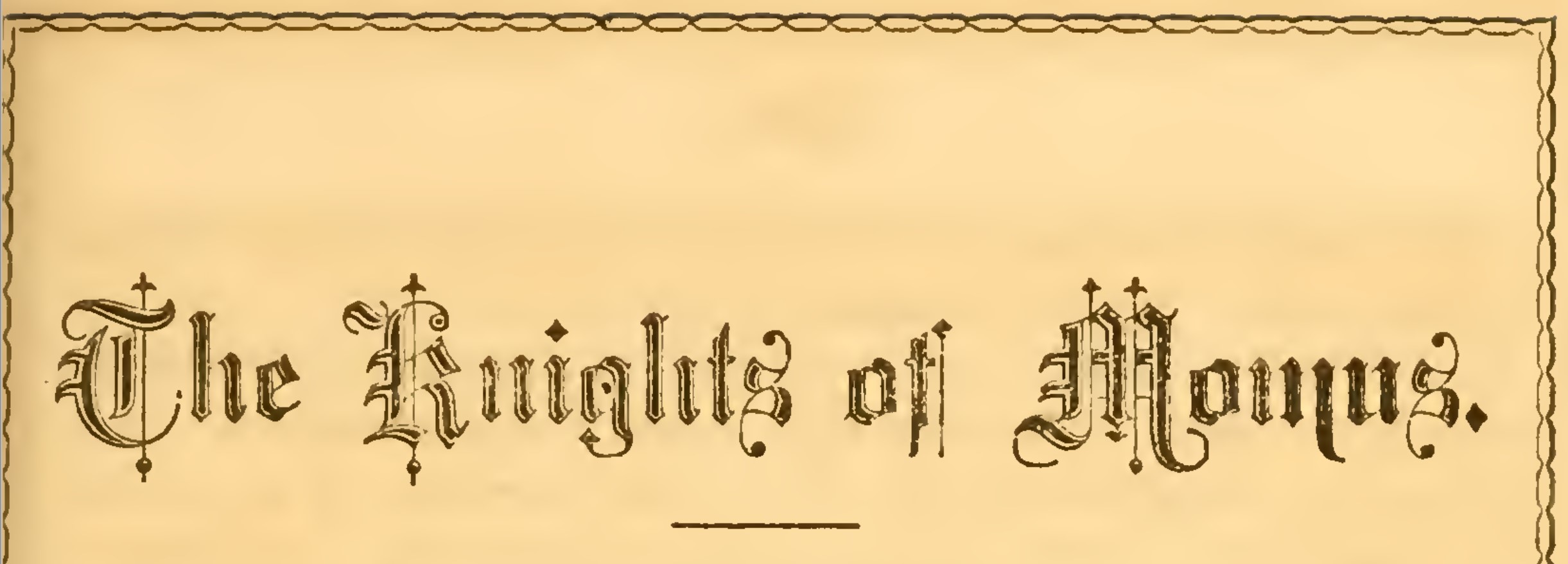
When it became known toward the end of the year 1872 that another organization was in process of being formed, and that the night ot December 31st would witness its first appearance, the curiosity which has always attended such affairs was at once aroused.
In a community where the spectacular appetite is so strong, and yet so eipcurean, and where such gorgeous and elaborate etforts have already been successfully made, it was certainly no slight undertaking in the Knights of Momus to enter the arena, and promise an event worthy of addition to the memories of past pageants, and of comparison with those which are to follow.
Yet all this was contidently promised, and, as a consequence, New Orleans turned out in force, and the known route of the procession was, at an early hour, lined with expectant crowds.

Need we say to any true lover of traditions that no happier selection of a subject could have been made than that which distinguished this event? In that dim age which the masters of romance and poetry have peopled with grand figures, and to the beautifying of which the immortal Scott has lent his genius, are to be found the most majestic subjects of pageantry. The stark old days of Richard Cœur de Leon and of Godfrey de Bouillon, and the countless other personages who animate our legends and our songs, make a rich field from which to cull the very fairest flowers of pageantry, and in this field our knights have roamed with unhindered feet, and culled a lavish wealth of beauties for our enjoyment.
The sireless deity of raillery, who, in the dim old days of mith, made gods the victims of his ridicule, and but hardly spared the matchless Aphrodite, daughter of the Foam, descends through the generous shadows of the centuries with a kindlier spirit, with a touch whose magic only beautifies, and the grim old motto “dum vivimus vivamus” takes a better significance through the interpretation which his latter-day votaries have given it, and gives us the right to welcome his advent with every sincerity and pleasure.
was of the gorgeous fashion peculiar to our festival pageants, and represented the principle figures in the grand tableau of the “Talisman.”
First came Momus, and on either side of him rode his attendant knights, and so, with all appropriate surroundings, the pageant of Momus came into full view, hemmed in by the rippling sea of eager faces, and shimmering in the radiance of a thousand lights.
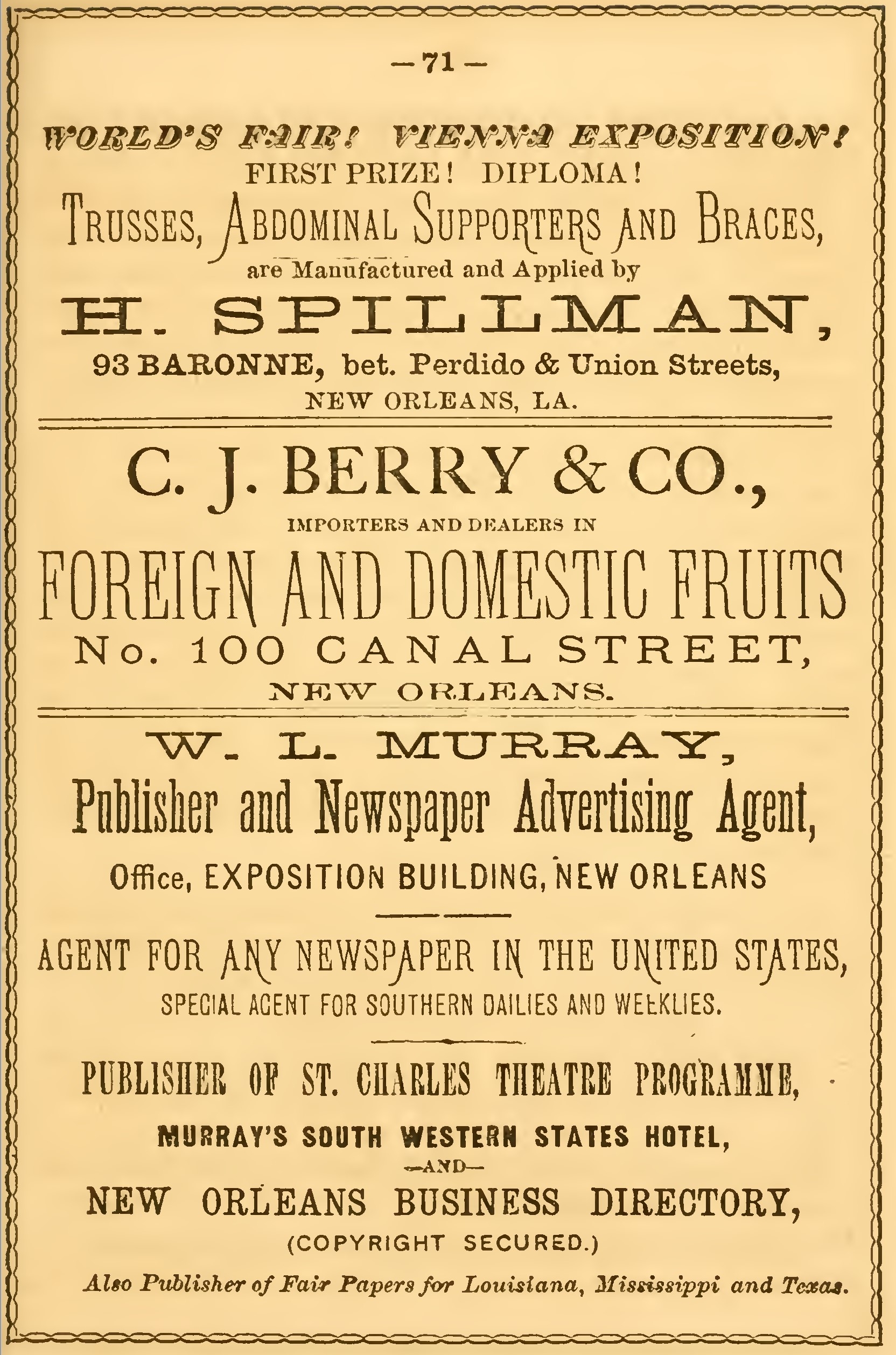
Then came the English Division headed by Devereux, the Lord of Giesland, bearing the standard of the Plantagenets. The Hermit of Engaddi and the Earl of Salisbury follow.
Richard Cœur de Leon, and his court, Philip of France, the Archbishop of Tyre, Earl of Champaigne, Leopold of Austria, Conrad of Moutserrat, and the gigantic Wallenrode of Hungary, with their knights and followers, all march past, with that pomp and marshal array that brings to our minds the gallant hosts of the Crusaders.
And then, after the splendid Christian cortege had passed, it was only fitting that our friends of Momus should give us some pictures of the nation against whom the crusade was directed. So it happened that the fourth platform was preceded by horsemen of another race from those who had gone before. Here were the representatives of that nation which, in those wild days, had drawn its myriads around the shrines and sepulchres of Palestine, and made the hot sands of Syria sodden with the Christian’s blood.
It was a splendid pageant, and did fair justice to the gorgeous epoch from which its figures have been drawn. Our brethren of Momus have cast no flimsy gage into the lists, and they of Comus and Revelers must take heed of their laurels, for henceforth they will be more hardly won.
The usual Ball and Tableau at the Opera House completed the affair, and as a matter of course, the tableaux were a reproduction of the procession.

On Wednesday evening, December 3lst, 1873, the Knights of Momus made their second appearance before our citizens, and the many visitors who had come hither to enjoy the Christmas holidays.
Though we have occasionally seen more people on the streets than were visible on this night, there must have been enough to give the youthful organization a very full and flattering reception. Canal street, of course, was thronged, as also the portions of St. Charles, Carondelet and Camp, contiguous to that central thoroughfare, and in a few instances, particularly as regarded the Pickwick and Boston Club-houses, we noticed some very clever devices in illumination. The weather was forbidding just about dark, and at one time a slight sprinkle of rain augured badly for the success of Momus’ second effort at pageantry. This, however, proved to be a false alarm, and the night, though not by any means a cheerful or a brilliant one, was at least not rainy.
The procession made its appearance quite early — about 7:50 in fact — coming down Camp street on its first movement, preceded by the usual police detachment and really an admirable band of music. We must compliment the good sense of the Momus revelers in arranging their groups on vehicles instead of marching through the streets. It added very greatly to the effect of the pageant, and to the enjoyment of those who assembled to witness it.
And the arrangement of the lights that illuminated the procession reflected much credit upon the experience and skill of Mr. Henry Perry, No. 141 Poydras street, to whose care this part of the display was confided.
Momus’ own explanation of the pageant, as shown by the first transparencies, is as follows:
It was indeed a collection of indescribable figures — things that never were on land or in the sea — a finely conceived and admirably executed burlesque on Darwin’s theory, and pretending to give a view of the “Coming Races.” The numerous groups were exquisitely ludicrous, and enlisted the warmest applause along the entire line of march. At the Varieties Theatre the tableaux were witnessed by a brilliant assembly of beauty and fashion, and a delightful ball wound up the evening’s entertainment.
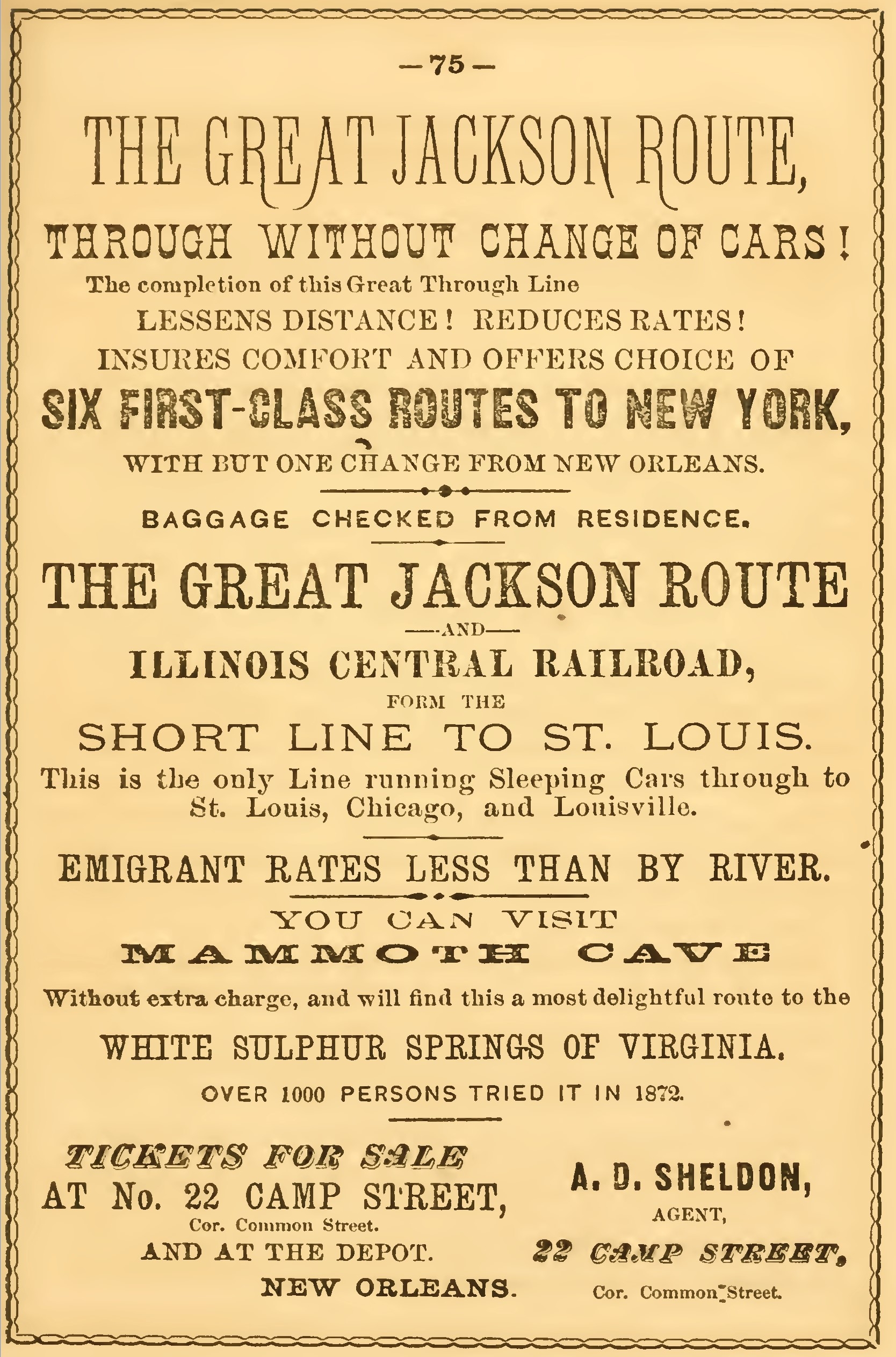
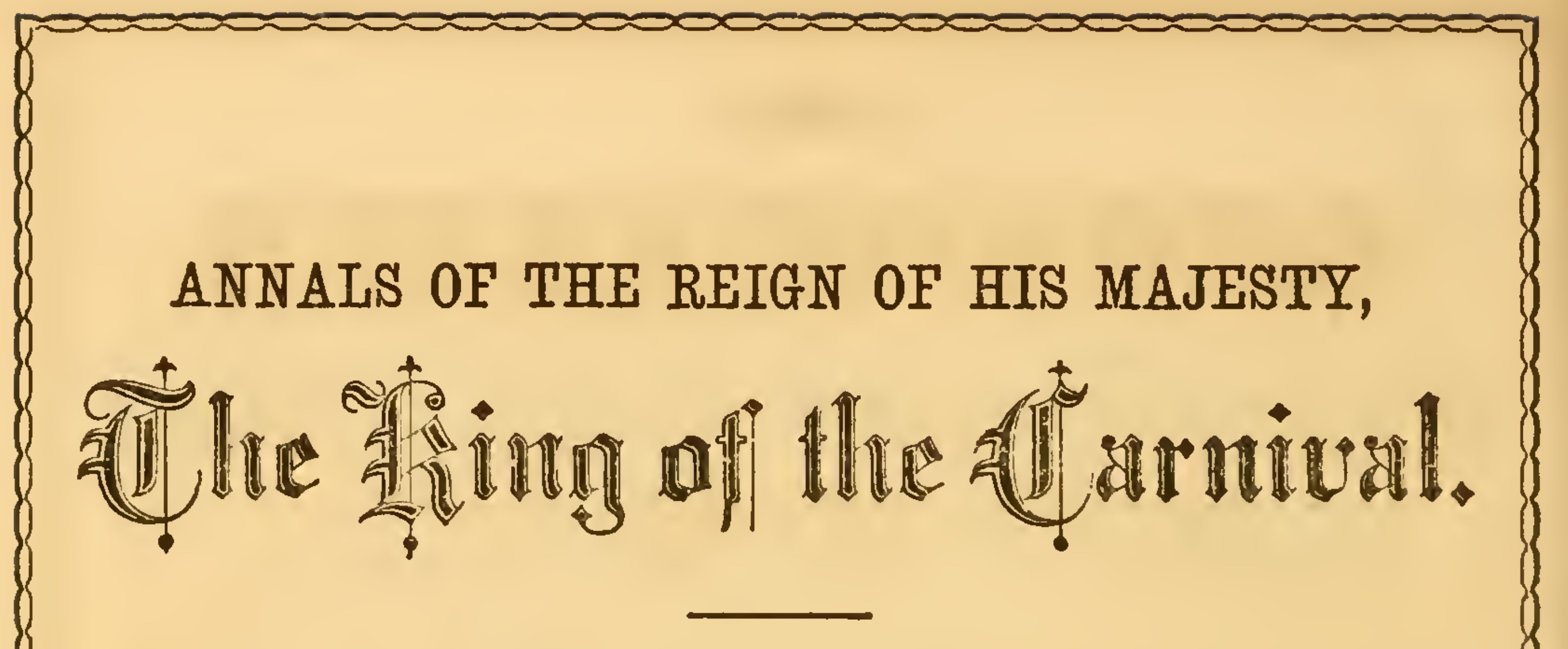
The fame of the magnificent pageants of the Mistick Krewe of Comus, having spread throughout the length and breadth of the land, drew to our city such multitudes of strangers that they were unable to accommodate even the more distinguished of our visitors. Persons from abroad saw on the streets, in the day, a motly gathering of maskers, without organization, and at night, a procession which, though gorgeous, lasted but a short time. They heard of the splendid tableaux, the brilliant audiences, and the joyous balls, with which these festivities were rounded off, but as the capacity of even our largest theatre was limited — and thousands were unable to obtain invitations — they were rather annoyed than pleased with these reports.
As years rolled on, the number of visitors increased, and the demand for cards to the evening entertainments grew more and more numerous, and the number who returned home disappointed was consequently larger every year. This was a source of regret to the members of the Mistick Krewe, whose entertainments, originally designed for the amusement of themselves and their immediate friends, had grown so popular as to attract immense crowds from distant cities.
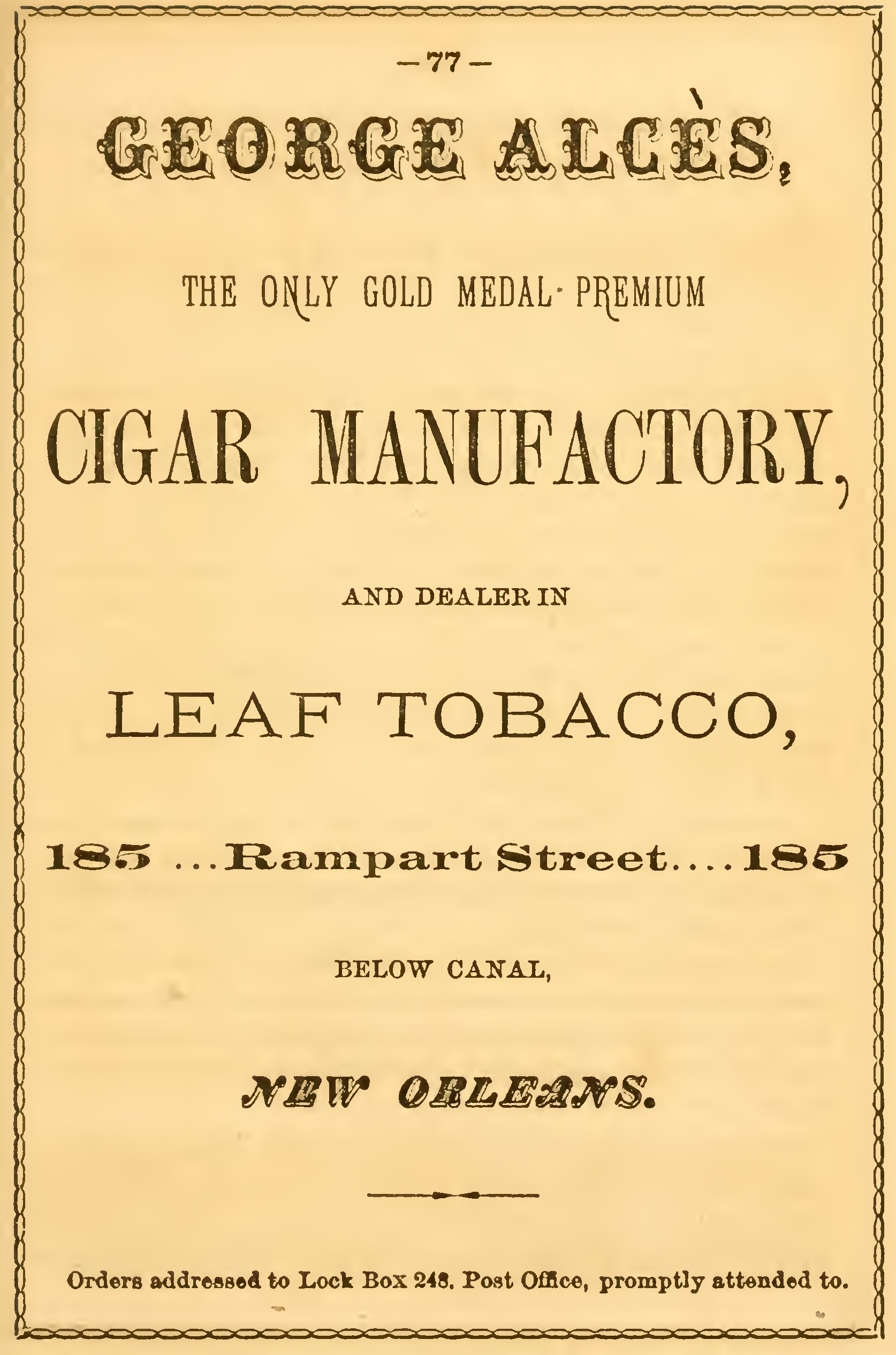

It was not until about the 1st of February, 1872, that a plan for overcoming these difficulties was formed, and most successfully carried out, by Col. Walter Merriam, a gentleman whose cultivated taste, liberality and public spirit, have always been freely enlisted in enterprises looking to the prosperity of our city, and Edward C. Hancock, Esq., a prominent member of the New Orleans press, whose ready wit, ingenious mind and fluent pen have so often pleased our people, and never more so than in his able contributions, to what we may term, our Carnival literature.
They sought an interview with the Mayor and Chief of Police, and found that their plan harmonized so well with their ideas that the entire police force would be placed under command of the King for Mardi Gras.
Assuming the royal perogative in its most audacious and enlarged sense, taxes were levied, proclamations were issued suspending all other forms of government, closing all public and private places of business, including courts, schools, banks, post office, custom-house, etc., and ordering all people to enroll themselves into organizations for the purpose of forming a grand procession.
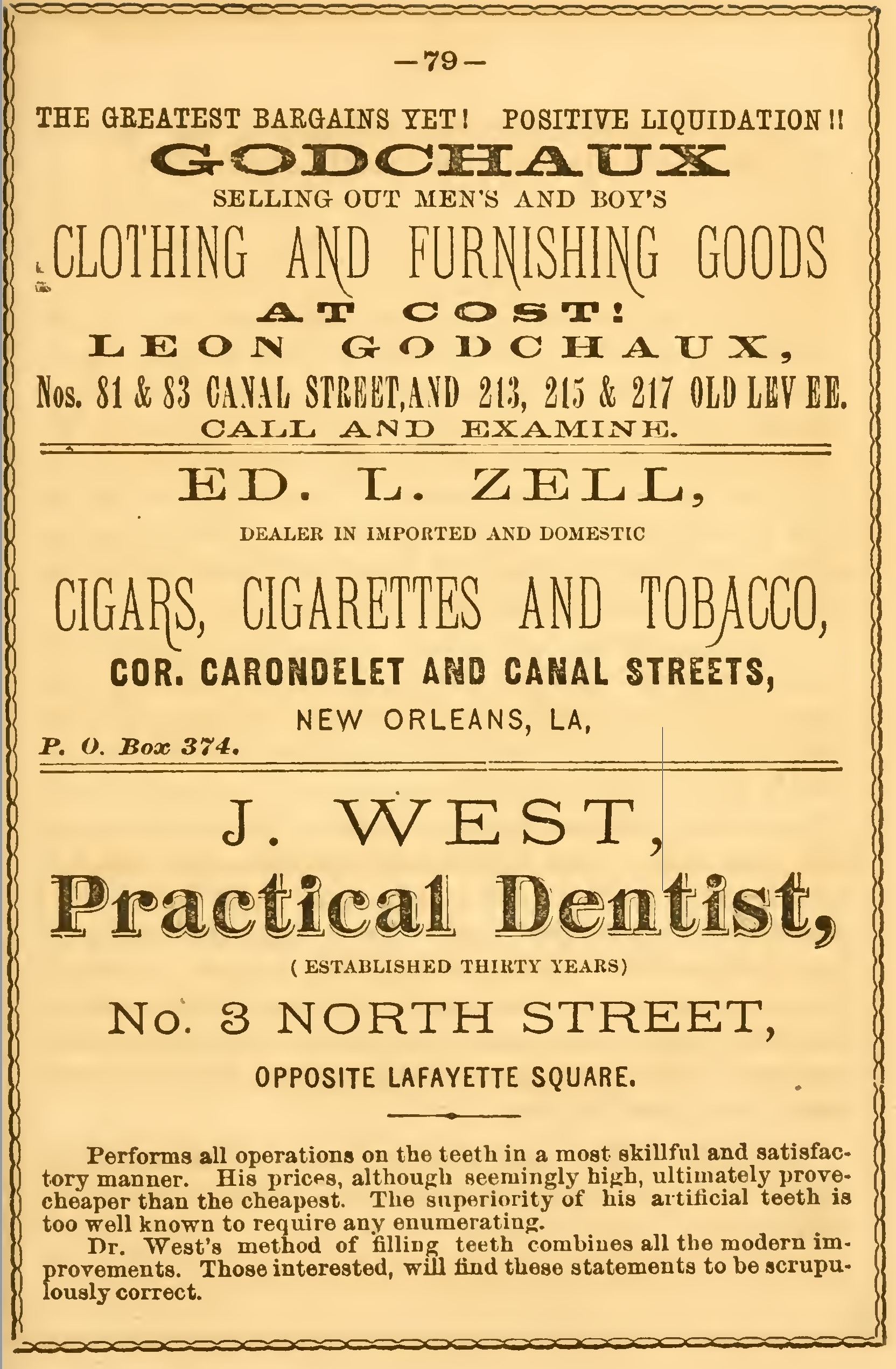
That the idea was a happy one was speedily assured by the prompt manner in which this self-constituted authority was obeyed. The Governor, the Legislature, prominent firms, officers of corporations, all vied with one another in sending letters of allegiance, which were published as received in the daily papers, and soon fanned the furror into a flame which burns brighter with every succeeding year.
This was assisted by a peculiar vein of solemn jocularity which pervaded all of his Majesty’s utterances and doings, making the travesty on monarchial usages so close and so delicately humorous that an universal and enduring popularity was at once established. As only about ten days intervened between the time of organization and Mardi Gras, the King’s affairs had to be pushed forward with lightning speed.
An association of forty young men of the city was speedily formed, and the material for a display was prepared, which, though immeasurably inferior to the subsequent appearances of the King in numbers, appointments and magnificence, not only pleased and satisfied, but astonished the public. The prominent peculiarity during this interval, and one which has since been well sustained, was the novel and original manner in which it was kept before the people, through the columns of the public press, which daily teemed with some new piece of rollicking fun, audacity, or keen, but kindly satire, upon prominent men and topics.
We give a few samples of these articles, which were received with the utmost good humor by all.


The King of the Carnival is the offspring of Old King Cole and the Goddess Terpsichore, whom, in imitation of Jove, he wooed and carried off in the form of an Irish Bull. He is, therefore, gifted with immortality by virtue of his Olympian origin on his mother’s side. He was born somewhere upon the shores of the Mediterranean, about the eighth century, and, in consequence, is now, though hale and hearty, somewhat advanced in years. Upon arriving at man’s estate he speedily conquered the whole of Southern Europe, which he held under dominion for a long period of time. About two centuries ago he declared war against his cousin, King Gambrinus, who at that time held all Northern Europe under sway, and after fighting that monarch desperately for a long time, was finally conquerred and driven into obscurity. During these dark days of misfortune, he sought refuge in England, where he assumed the name of Joseph Miller, familiarly known as “Old Joe Miller,” and devoted himself to politics, in which he subsequently achieved some fame as the author of the Junius Letters and the founder of the London Punch. A few years since he returned to Rome, where he established a race course on the Corso, and made a desperate attempt to reclaim his dynasty. Failing in this, through the machinations of Count Cavour and Victor Emmanuel, he set sail for the United States, where he landed in 1866, and has since been living in seclusion at the South, managing the political affairs of its people. The prince of mischief-makers and jokers, he is credited with having inspired the queer movements and social relations existing in this benighted section. Only a few days have elapsed since his successful attempt at overthrowing the government of Louisiana — one of the most remarkable occurrences on record — in a cheeky point of view.
His Majesty, in personal appearance, is more interesting than commanding. Rather below the medium height, an erect form, surmounted with a well-set head, covered with a profusion of snow-white hair, and a long patriarchial beard, his aspect is at once venerable and imposing. His brow is wide and expansive, his eyes dark and glittering, always fixed, as it were, on a dreamy futurity. His mouth firm set and stamped with a perpetual smile. His face bronzed with the exposure of centuries, and his entire appearance and bearing are calculated to inspire the most profound awe and respect.
His Majesty has never married, giving as an excuse that this state should not be entered into until experience has sobered the liveliness of youth, and all the wild oats have been sown. We give this latter piece of information for the benefit of the ladies, who are already overwhelming his Majesty with billet-doux.
It is well to note in the latter connection that the national air or anthem of the Carnival Dynasty, for many centuries past, has been, as it is at present, “If Ever I Cease to Love.”
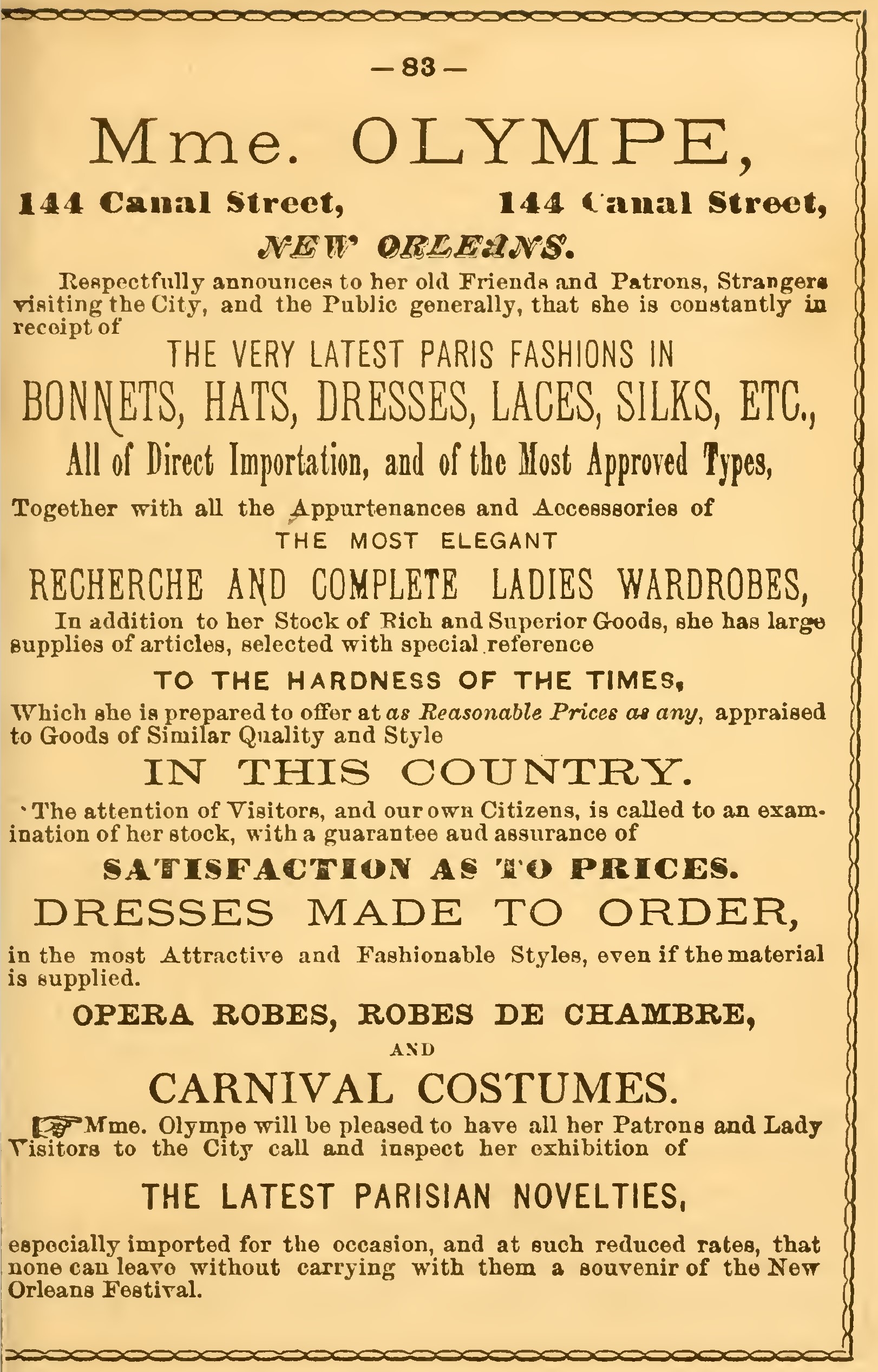
The calm which invariably precedes the storm prevailed at the palace yesterday, and but little work was done. The guards lounged around the galleries and ante-chambers in a listless manner, occasionally gathering into knots, listening to the jovial yarns of Colonel Jack Wharton, Chief Equerry in waiting to His Majesty, or exciting stories of the chase as related by Billy Conner, Lord Groom of the Royal Stables. During the entire morning His Majesty remained in seclusion, only granting an audience to a deputation of loyal ladies, who desired some information concerning the royal colors, with a view to using them in the decoration of Tuesday. His Majesty received them graciously, and summoned Garter King-at-Arms, to his presence. The latter explained that the Royal colors were Green, Gold and Purple, regretting that the subjugation of the State had been too recent to prepare a Royal Standard, but that upon all His Majesty’s future fete days it would invariably be displayed. An hour was subsequently spent in completing additional arrangements for the reception of the Grand Duke, His Majesty, who of course understands all languages, inditing the following autograph letter, to be handed to his Royal cousin upon arrival. We give it in the vernacular:
His Royalovitch Highnessoff the King of the Carnival, Officia Ilywelc, omest one worle ansh isroy alcous inth emostp uiss ant Duke Alexis Alexandrovitch Romanoff: andwi llh o Idaspe ciala udie ncef orh Isrece pti on atsue nse ton Mardi Gras.Rex.
In the evening a grand State banquet was given. Among the guests attending which were to be found Gen. H. S. McComb, Gen. Beauregard, Col. Sam Boyd, Norbert Trepagnier, P. O. Hebert, Samuel Smith, J. W. Burbridge, I. N. Marks, C. A. Whitney, and C. H. Slocomb, Esquires. The approaching festivities were here discussed at length with the viands and wines until 9 o’clock, when his Majesty, attended by his Lords in waiting and Gentlemen of the Bed Chamber retired, leaving the guests to their own enjoyment. His Majesty was subsequently read to sleep by one of the under Secretaries, but with some difficulty The proceedings of the City Council usually productive of somnolency being found upon this occasion ineffectual, through their usual brevity of late; resort was then had to the minutes of the Academy of Natural Sciences, under the soothing influence of which nature shortly succumbed.
Many additional applications for position were filed during the day at the office of the Earl Marshal of the Empire and another heavy batch of correspondence was being opened up to a late hour of night, all testifying greater promise of gorgeous magnificence of the Royal State Pageant. God save the King!


To all whom it may concern:
His Royal Highness the King of the Carnival being deeply impressed with the enthusiastic loyalty manifested by his beloved subjects of all degrees and conditions, upon this his most blessed fète day, has resolved —
That a proper consideration for the glory of his regal state and sovereign care for his loyal subjects, demands the abrogation of all laws, and the removal of all impediments of whatsoever kind or nature that may impair or interfere with public enjoyment.
In pursuance of this determination, he therefore, solemnly enacts the following decrees to rule the law of the land during the entire reign of his illustrious and glorious Majesty:
First — Whereas, it having come to our Royal knowledge that one Stockdale, Collector of Internal Revenue, intends taking advantage of His Majesty’s preoccupation in aifairs of State connected with the Royal Pageant, to collect all the taxes of the Realm, his office is hereby abolished.
Second — The following laws enacted by a previous government having been found to weigh grievously upon His Majesty’s subjects — the Registration Law, Constabulary Law, Election Law, Printing Law, Taxes and Judge H. C. Dibble — all of the same are hereby abrogated and abolished.
Third — The credit of the Realm is hereby reestablished on a specie basis, and all securities, of whatever nature, are declared to rule at par value. Any person, subject or foreign, detected in an attempt at their depreciation will be immediately incarcerated in the lowest dungeon of the Donjon-keep.
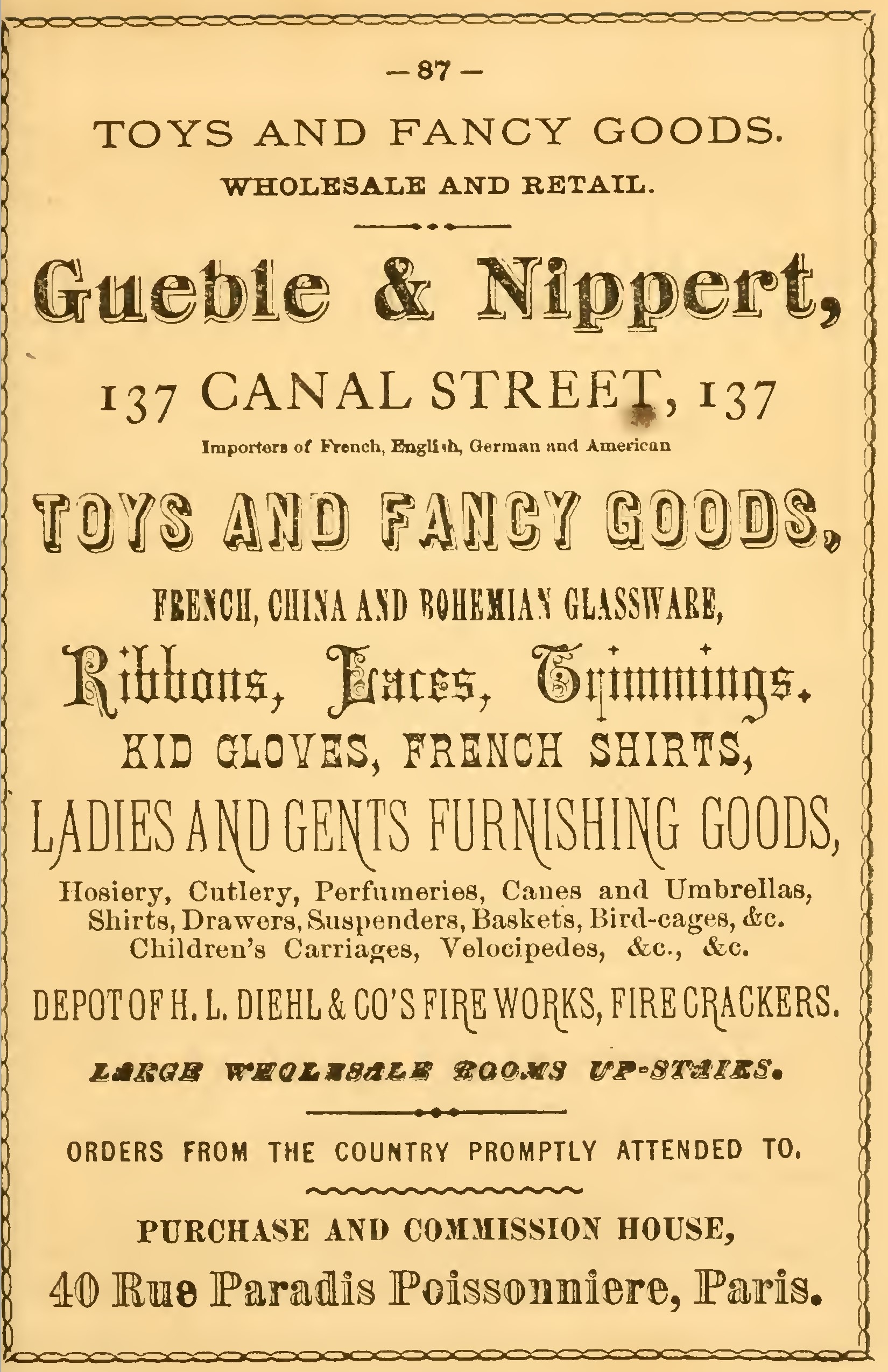
Fourth — All subjects guilty of any breach of the peace, working all and any description of disorder or offence against good taste and delicacy in the display of outre or improper costumes, will be immediately conveyed to the barracks of the household troops; and our well beloved servant, Col. A. S. Badger, Captain of the Guard, near to the person of his Majesty, is hereby charged with the strict enforcement of this order under penalty, in default thereof being forced to attend the meetings of the Academy of Natural Sciences for an entire year.
Fifth — The market rate of cotton is hereby established for this day at fifty cents per pound, low middling grade, and for sugar at 25c. per pound, other products of the realm to grade in proportion. Any subject violating this edict will, upon trial and conviction be sentenced to serve not more than one term at hard labor in the Louisiana State Legislature.
Sixth — All punishments incurred by the children of the realm for any offenses of whatever nature, committed anterior to this date, are hereby cancelled in honor of the fete of his Royal Highness. Such parents or guardians disregarding the provisions of this edict are hereby sentenced to a perpetual deprivation of their night latch keys.
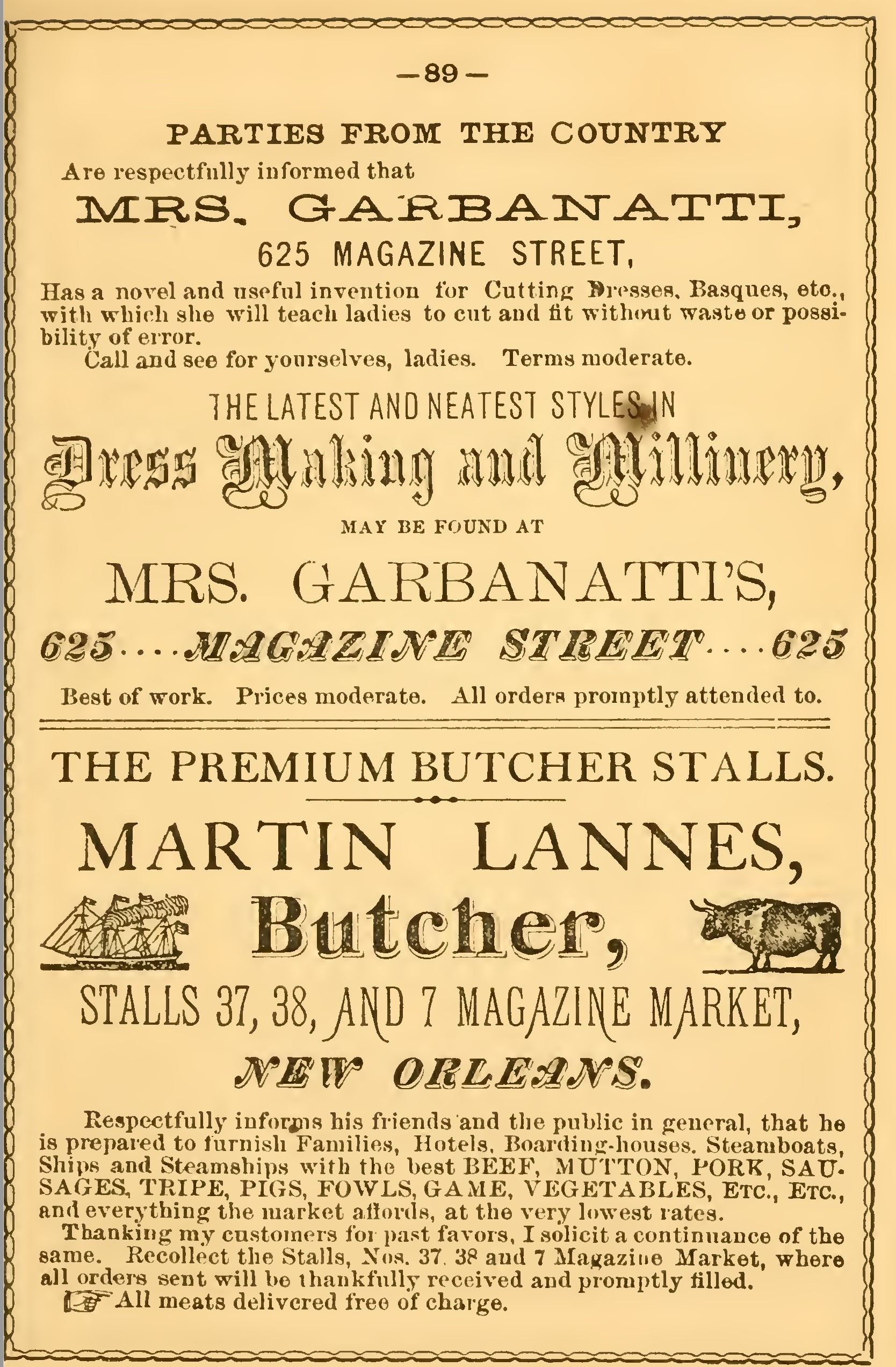
Seventh — All quarrels, hatreds, jealousies and vendettas heretofore existing between any of his Majesty’s subjects are hereby cancelled, as nothing but the most unalloyed good humor and jollity will be allowed to prevail throughout the realm during the glorious reign of his Majesty.
Eighth — All persons residing along the route of the royal pageant are ordered to provide proper extra supports for their galleries, to festoon and decorate the same with the royal colors (green, gold and purple), and to pay due obeisance to his Royal Highness, in passing, under penalty in default thereof of perpetual exile to the Balize.
Lastly — Sir Warren A. Stone, the Right Hon. D. C. Holliday, the Hon. J. T. Scott, and Sir Howard Smith, Physicians in Ordinary to his Majesty’s household, having recommended a change of air and scene, the King of the Carnival will therefore be under the unpleasant and regretful necessity of bidding his loyal subjects adieu at sunset to-day, for a brief period of time; promising to return again when his health, in the opinion of the Royal Physicians, shall have been fully re-established.
In doing so it is with a profound and gratifying sense of the loyalty displayed by his subjects of the cheertul and prompt alacrity with which his orders have been obeyed, and with the promise that on the occasion of his re-entry into his capital, the splendors of to-day’s pageant shall be far outshone in magnificence and gorgeous state.
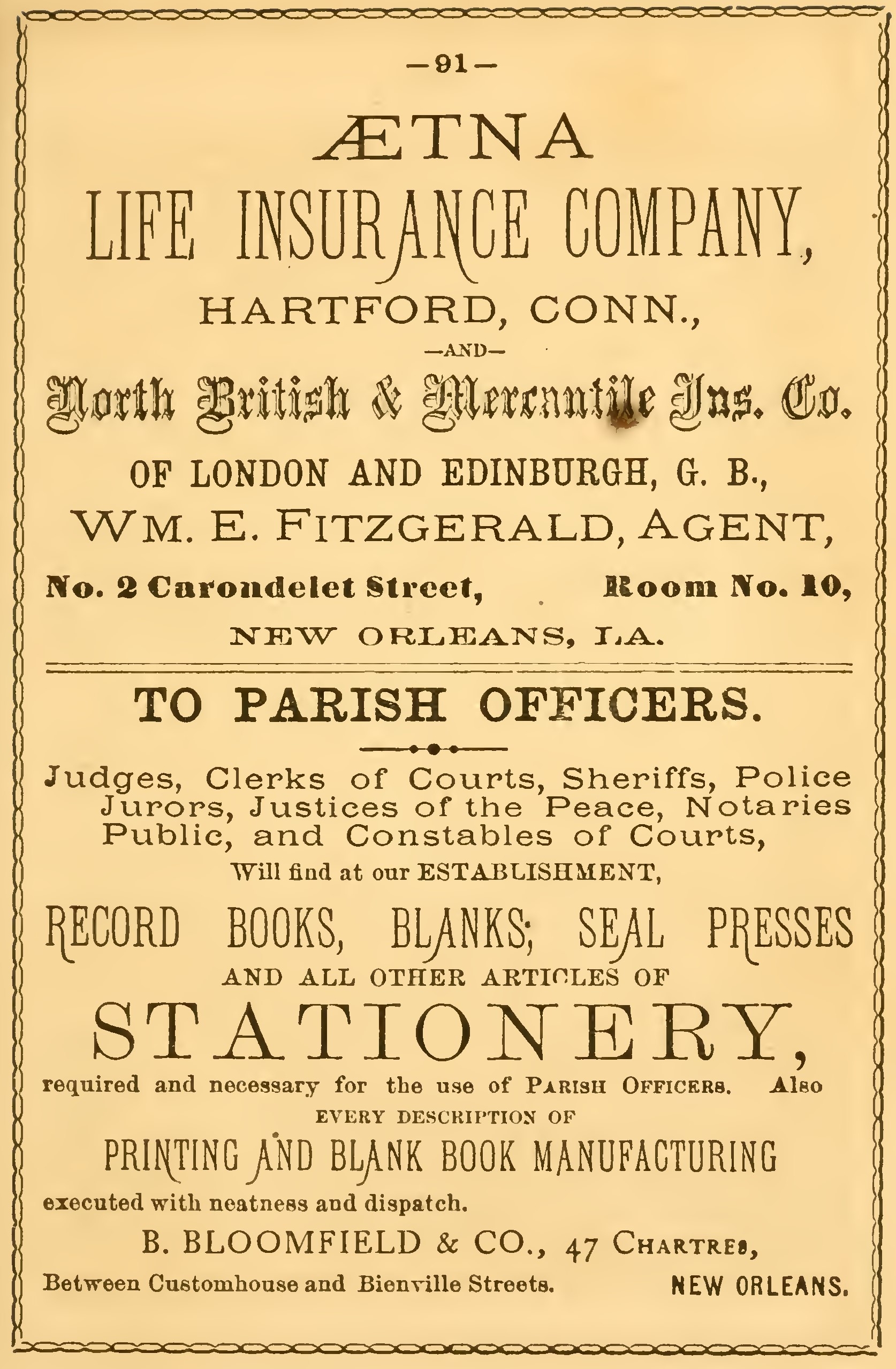
And now, with the best wishes for their health, prosperity and happiness, he bids them adieu. Enjoining upon them during his absence unswerving loyalty in their allegiance to the Royal House of Carnival, and an unimpaired continuance of that loving affection already manifest for its reigning head, which is above all price. God save the King! Given under our hand and seal, at Carnival Palace, this the 12th day of February, in the year of our Lord 1872. Rex.
The decorations were very extensive, Canal, Camp, St. Charles, Royal, Esplanade, Rampart nnd other streets containing many houses and stores, where Chinese lanterns,festoons and flowers were combined with charming effect. From many of our public buildings and leading stores floated the handsome flag of the King of the Carnival. The procession was formed at two o’clock, the hour designated in the proclamation, for if there is one thing his Majesty admires more than another, it is promptness. The excitement was very great, and the streets through which the King was to pass were densely packed with eager lookers-on.
The King, accompanied by the Earl Marshal of the Empire, splendidly costumed, soon gathered his hosts and the procession took up the line of march. Salutes were fired by the Royal Battery, under command of the gallant Col. Squires.
In the line appeared the Boeuf Gras, a splendid animal, of milk white color. The yeomanry, the pack, maskers in carriages, advertising vans, knights, harlequins and clowns on horseback, the whole being followed by the “unattached,” a jolly, motley crowd, who had turned out “for fun,” and were having it.
At four o’clock the Grand Duke Alexis, then in the city, accompanied by the Mayor and several gentlemen of his suite, arrived at the City Hall, and shortly after the King of the Carnival and his followers arrived.
Here the imposing ceremony of surrendering the keys of the city was performed, the Mayor presenting them with a well-timed speech, proclaiming his aftection and loyalty, to which his Majesty replied with becoming dignity and grace.
The procession then moved on and completed the prescribed line of march. Although the display has been eclipsed by subsequent efforts of our gracious Sovereign, it was acknowledged to have been the finest turnout ever seen in our city up to that time.
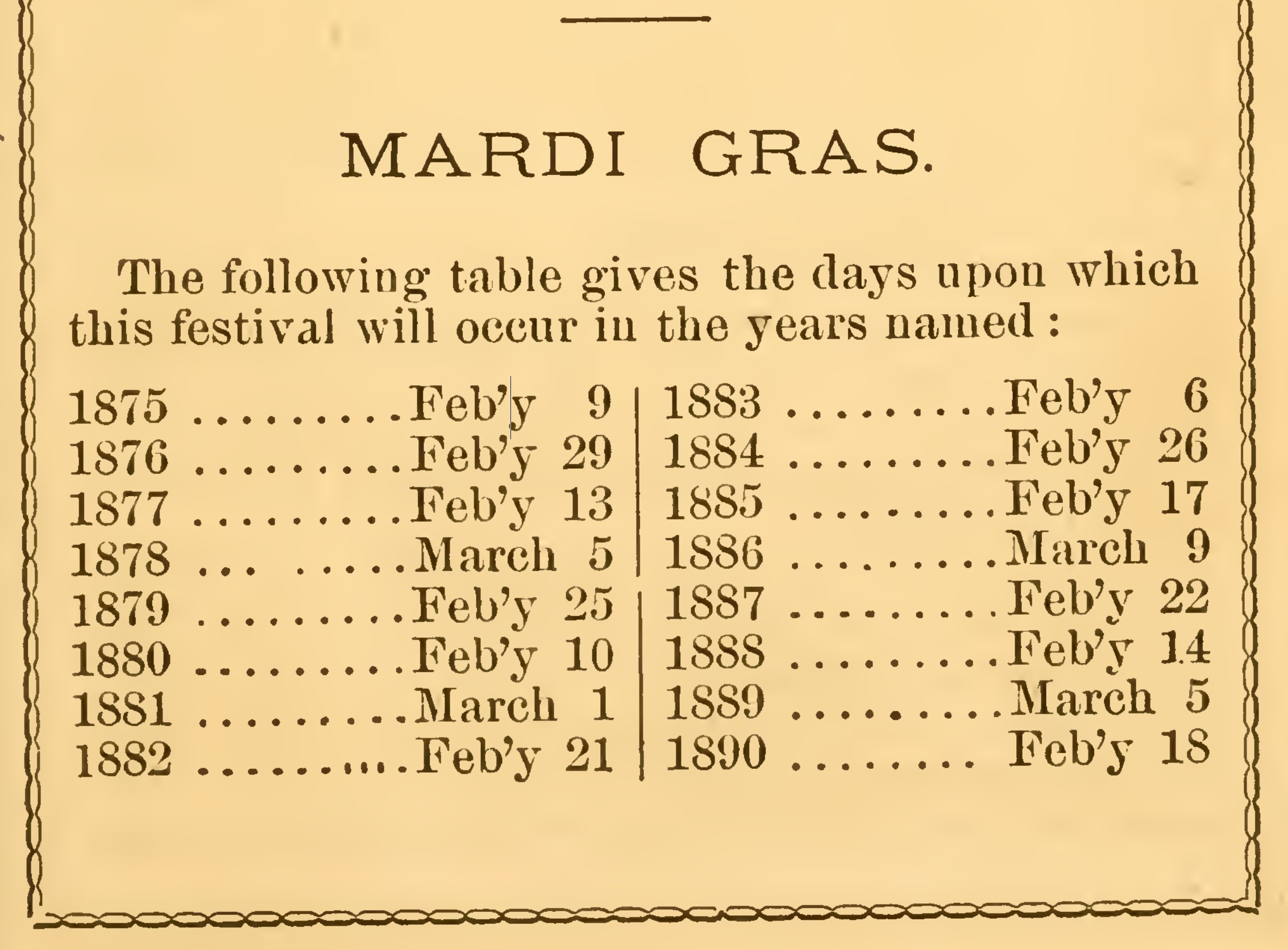

The King of the Carnival’s rule having been established upon so firm a foundation, hardly had the echoes of the sunset salute of his fete day in 1872 died away before steps were taken to perfect the idea in the fullness of its original conception. The twin associations, consisting of the merchants and bankers intrusted with our city’s welfare, were formed with a view of placing means at the disposal of the active members of the original organization, to these, splendidly designed patents of nobility were issued, emblazoned with the seals ot the State of Louisiana, city of New Orleans and the King of the Carnival. They were all prepared after accepted models in the strict vernacular; were very beautiful and can now be found framed in the offices of our most prominent business houses.
A pamphlet history of the King’s reign for the first year was also prepared for private circulation, and the Exposition Hall, containing the largest ball room in the United States, was leased for three years, at an annual rental of $2000 for Mardi Gras night.
Early in the summer an agent was dispatched to Paris for the purpose of preparing all the necessary court regalia (which were of the finest materials), banners, properties and costumes. Up to January 13, 1873, nothing further was heard by the public of the movements of his Majesty, save an occasional intimation that he was traveling in Assyria for his health.
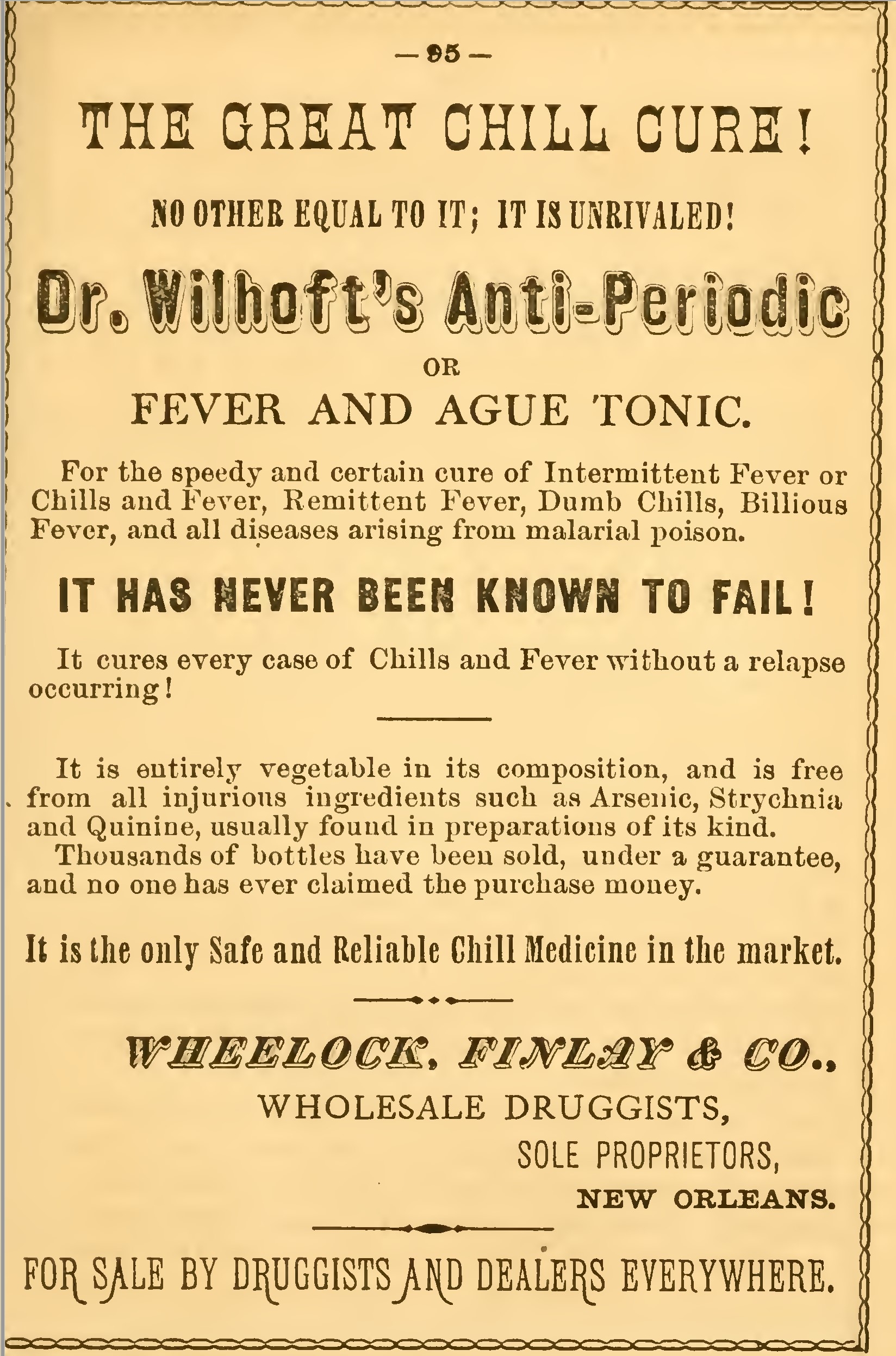
On that morning the walls of the city were found covered with an illuminated poster, headed with the royal arms, containing an edict commanding all loyal subjects to form themselves into separate and distinct organizations and to report to be assigned to their duties on the approaching Mardi Gras. The same esprit du corps which had manifested itself on his Majesty’s initial effort now displayed itself, with renewed intensity. In a few weeks, or rather days, several new organizations were formed, which still exist; the King’s Own, a splendid squadron of cavalry of tour companies, the Oxonians, the Pack, the Lights of St. George, and several minor organizations on foot and mounted, reported themselves as fully organized and equipped for duty.
When we come to reflect that the King’s organization is a secret one, that the public are entirely in the dark in regard to its personnel, and that all the great work which has since followed has been accomplished entirely by correspondence, a fair idea of the energy, industry and great administrative power which lies at the bottom of it may be formed. It is the shadowy King’s boast that he never issued an order or edict, no matter when, or to whom, but what it was strictly obeyed; that he has never made a promise or appointment but was fulfilled to the letter, and it must be acknowledged that thus far in his era and epoch he has earned the right to make this boast, in itself a rare and wonderful thing.
During the interval which elapsed between January 13th and Mardi Gras, which occurred on February 25th, the papers teemed as usual with the sallies of satire and sound sense which characterized the preparations of the preceding year.
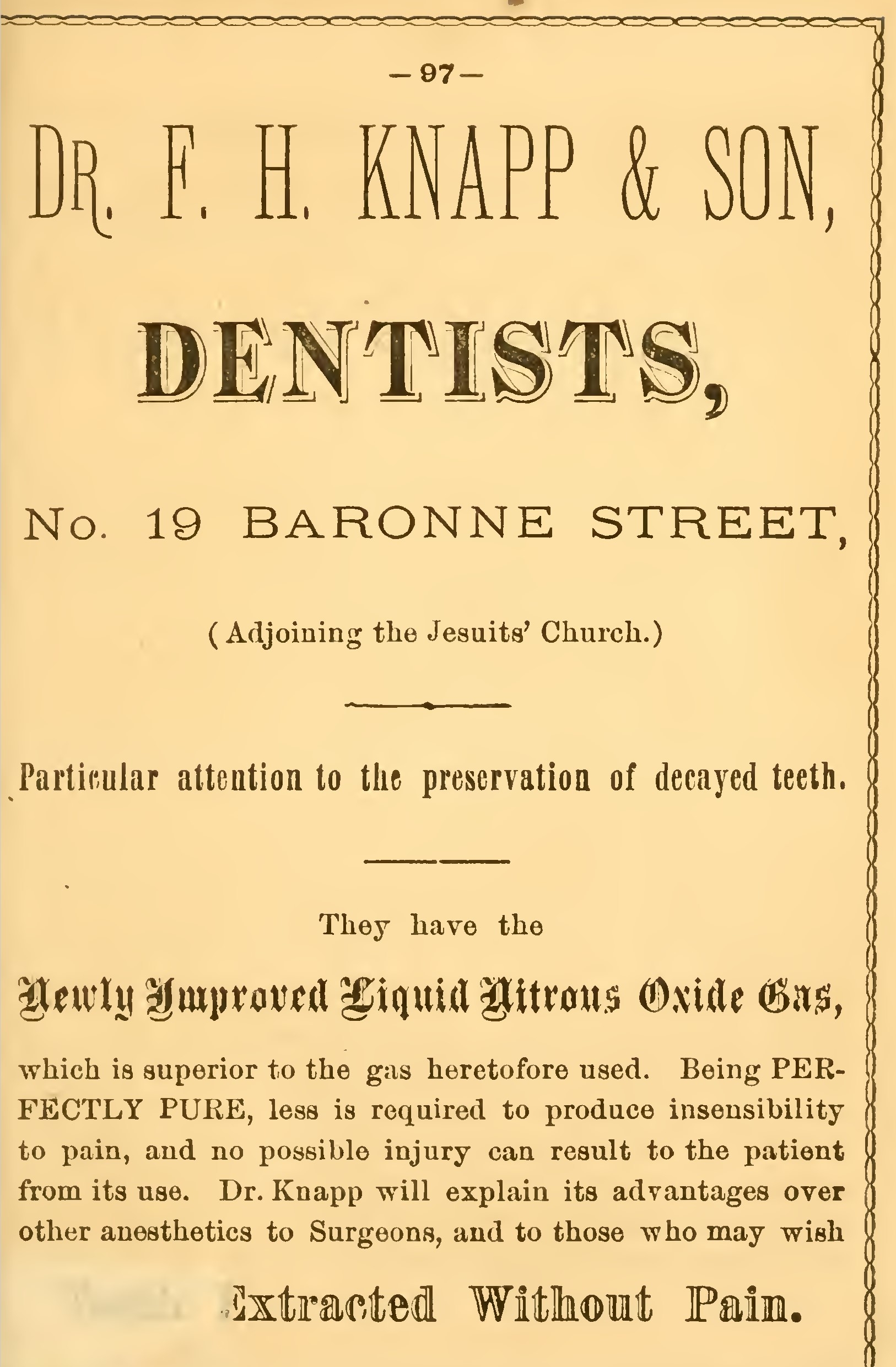
Tens of thousands of the dwellers of the Crescent City were on a stroll along our central boulevard early in the day, and tens of thousands of visitors to the city were there to see what the residents had provided for their entertainment; and the result of several hours careful survey of the various streets, and of the masses of humanity therein assembled, resulted in the decided conviction that there were forty, fifty, sixty or seventy thousand men, women and children in the open air of New Orleans by noon, who could unhesitatingly and accurately be divided into two great classes — those who stared and those who were stared at — the former being hugely in the majority.
By nine o’clock in the morning the streets leading to Canal began to fill with people, on foot and in vehicles, moving to the common centre. There the crowded cars from up town, and down town and back of town began bringing in the sight-seers. The hotels and boarding houses sent huge delegations. The many steamboats that had come to the levee in the last two days have forth long files of excursionists from the west who had hied South for the far-famed Mardi Gras. The suburbs — Gretna, Algiers, Carrollton, Greenville, Milneburg — were largely represented too, and by eleven o’clock there was such a heterogenous multitude on Canal street, on the side walks, in the centre of the street, in the doors and windows, up to third and fourth stories, in the galleries and balconies, on top of the awnings, even on the house tops, as has probably not been gathered there since the memorable day when Zachary Taylor was received by the people on his return from the Mexican war.
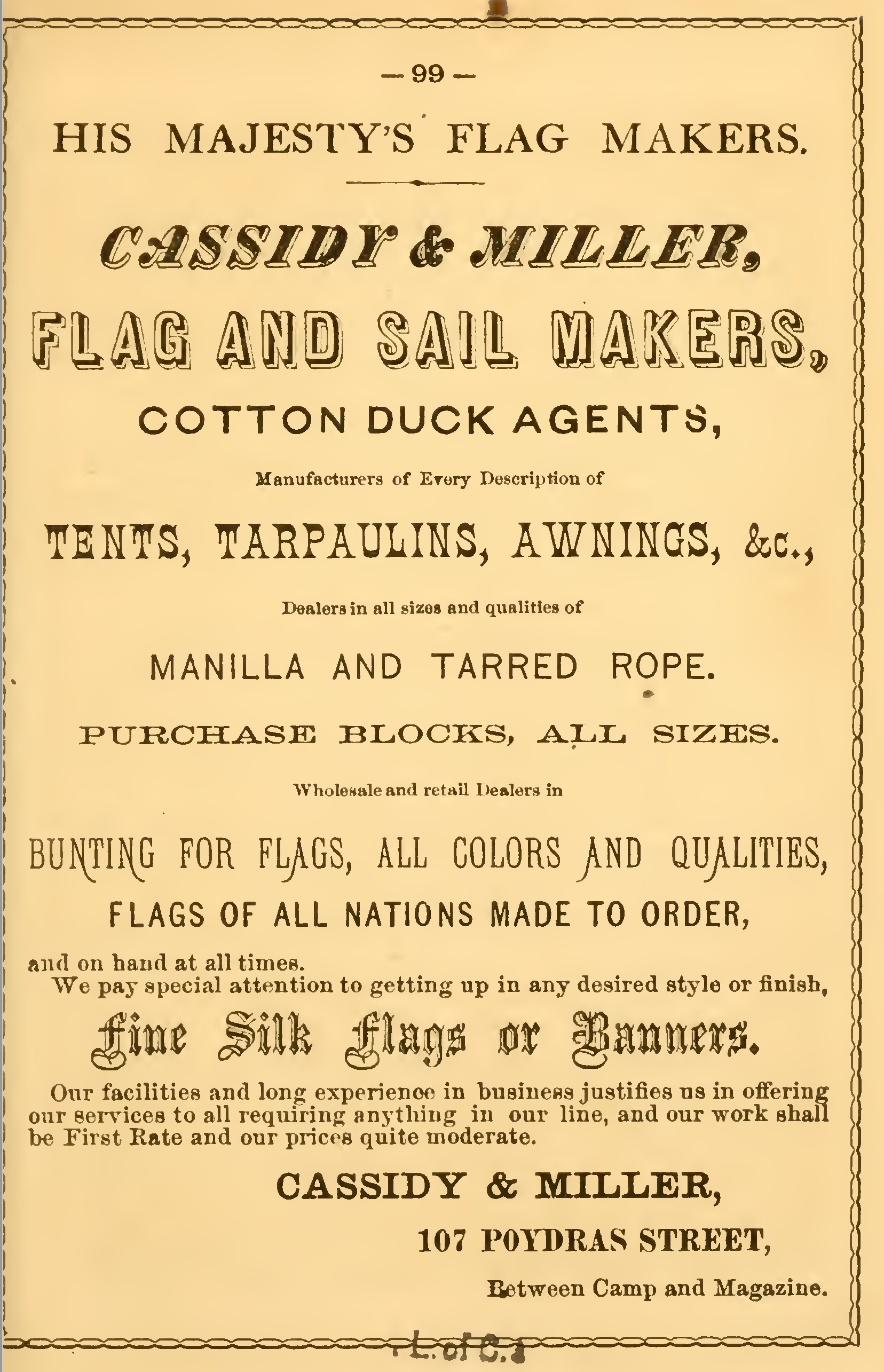
Taking Clay Statue as naturally a central point of gathering and examination, the observer had the wherewithal for at least an hour’s steady occupation. The statue itself, its granite pedestal, the iron railing surrounding it, and the broad steps sweeping round it, served as standing and sitting room for a thoroughly Democratic crowd of men, women, boys and children, white and colored, and all in the best of temper. This was illuminated by an amiable Chinaman standing up beneath the shadow of Henry Clay’s coat tail, and quietly allowing a fat old colored woman, with a gay madras handkerchief tied around her head, to sit sleeping, leaning against his (John Chinaman’s) lower extremities for an hour at least.
From this elevated stand-point, far as the eye could reach, in any and every direction, it caught nothing but a mass of moving objects in the broad street — human beings and vehicles being mixed up in apparently inextricable confusion. The appearance of independent groups of maskers, here and there, excited the gossip and laughter of the crowd; the mounted policemen dashing about, trying to keep order, were prominent features; and the arrival on the scene, now and then, of the mounted and foot maskers, or those in carriages, in long array, with bands of music, who were to take part in the grand procession, stirred the multitude with a mighty curiosity that seemed to devour each masker and his costume.
All was orderly and quiet, it should be noted, in this vast assemblage throughout the day. Good temper prevailed, and we did not see or hear of a single disturbance or difficulty. The skies were overcast up to twelve o’clock; but then the sun shone out gloriously, and lit up the panorama with all the radiance of a Southern summer day.
It was not generally known that the ceremonies at the City Hall would take place before the hour fixed for the moving of the procession, and hence the concourse of people at this point was limited, although there was present an assemblage quite sufficient to lend an extraordinary animation to the scene. The facade of the structure was adorned by an immense arch of gas lamps, while across the street to the square there swung to the breeze many-colored flags, embracing the King’s colors, the Russian, English, French and German ensigns.
At precisely 11:40 A. M., there was heard from the City Hall steps the martial notes of the 19th Egyptians band, heralding the approach of the royal cortege, and in a trice there came into view the Egyptians themselves, who, ranging in line facing the hall, were quickly followed by the Turcos, who took up a position at the right of the Egyptians. Before the troops now rode the Court, while above rested the King’s Own and 92d Lancers.
Attended by the Lord Chamberlain, the Earl Marshal and two aids, the King rode up to the very portals of the hall and there was received by the Mayor, attended by an aid, bearing on a velvet cushion the
which there were three, of solid silver and immense size, banded together by a silver ring.
Transmitting his speech, printed on white satin, to the King’s Chamberlain, the latter read to the King as follows:
August and Gracious Sovereign:
In the name of the people of your new Empire, and in the capital city of your choice, I give you welcome. You come to us from classic lands where your reign is glorious with the stirring memories of a thousand years, unvexed by revolt, undimmed by the shadow of disloyalty. You enter here upon fresh fields of peaceful conquest over the hearts of loving and obedient subjects; may the triumphs of your future be equal to the history of your past, and your benign sway be extended over States now unknown and nations yet unborn.
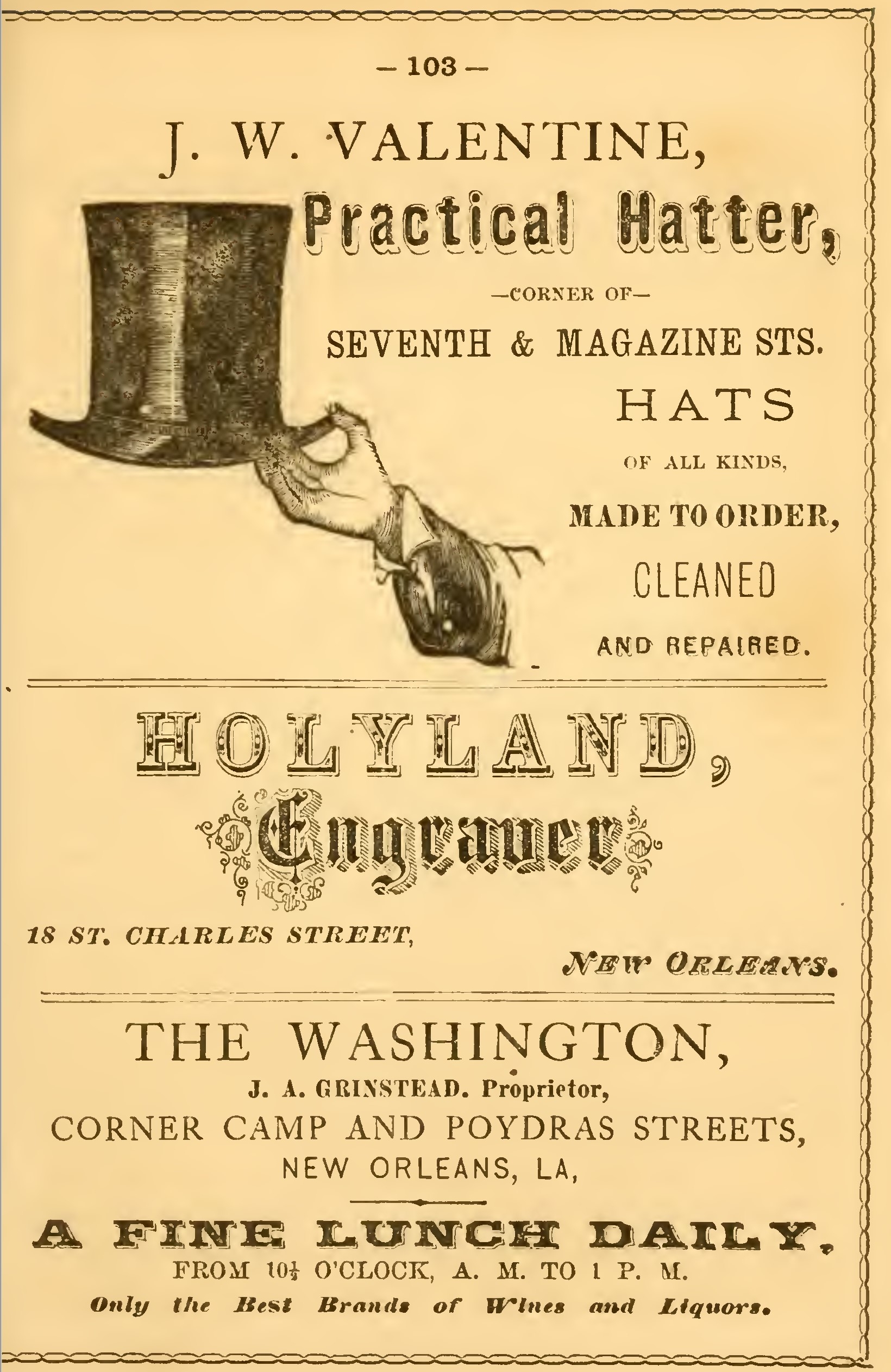
By virtue of my office I freely tender to you the loyal obedience of your lieges, and place at your disposal the keys of your capital city.
The Mayor’s address concluded, Rex, unrolling from his sceptre his reply also printed on white satin, it was read by the Chamberlain to-wit:
Honorable Mayor, and most noble Gentlemen and Lieges:
The exercise of the powers of absolute sovereignty during so many centuries, amid the joyous acclaim of loving subjects, has not dulled the generous enthusiasm of my heart; it is therefore with the deep emotion of intense pleasure, that I accept the homage of the Western World in my capital city. I hail the glad opportunity to establish my reign over regions yet unknown, but which in the light of your past progress reveal to my prophetic vision new and glorious parts of my extending kingdom; even as to the eye of the night watcher who turns his telescope upon the sky, the fleecy nebulae resolve into myriads of glittering stars, and new constellations shake their flaming hair. I accept the keys of my capital, and will rule but for a day, granting to the city the whole of the ensuing year to prepare for my next coming.
I have said.
Now turning to a lackey standing hard by and bearing a bottle of wine and two glasses on a silver salver, the Mayor gave the signal, and in an instant the foaming beakers were filled to their brims. His Majesty and bis Honor then drank each to the other, ending the ceremony by dashing the globiets into fragments on the pavement.
Now, at a signal from the Earl Marshal, the long roll was sounded by all the drums of the royal army, amid which the King dismounted, and, with the Mayor, entered the City Hall. The Artillery Regimental band, of thirty pieces, stationed on the grand platform in Lafayette Square, struck up the Royal Anthem, composed by Mr. Davis upon the theme “If Ever I Cease to Love,” expressly for the auspicious occasion, and continued to play until after the distinguished host and guest had passed from sight.
At this juncture, Capt. Wm. Conner, Duke of Metairie, appeared from the hall, bearing in his hands the royal standard, and taking a position on the steps called for the Colonel of the Nineteenth Egyptian, and, to him responding. Col. Cruise, the Duke, addressed him as follows:
Saladins of the Nineteenth Egyptians :
Acting upon behalf of the ladies of his Majesty’s Capital City, it becomes my pleasing duty to present you with this royal standard, at once the symbol of absolute power and good feeling. In marching beneath its folds to future conquest, you will bear with you the assurance that no cypress will ever mingle with the laurels you may win. The loyalty you have manifested toward oar gracious sovereign, renders this task a double pleasure, since it will tend to strengthen those ties which always unite the fair and brave, and keep clear the skies it is too often the painful duty of the soldier to darken with battle clouds. With the best wishes for future success and prosperity, I now entrust this standard to your hands.
At the conclusion of his remarks the Duke presented the standard, which is a handsome emblem, elaborately worked in silk (the royal colors) and adorned by a beautiful staff.
In accepting the standard, on behalf of his regiment. Col. Cruise delivered a happy speech, in which he promised that the Nineteenth Egyptians would fondly cherish their gift, and keep it forever free from the marks of aught but glory.
Within the Mayor’s parlor was already assembled a large company of ladies and gentlemen, and these, as soon as the King was seated, hastened to pay their respects to his Majesty, thereafter King and subjects joining in quaffing the flowing bowl, which went merrily around, and lacked not for ardent devotees.
The royal levee prevailed until 12:45 P.M., at which hour announcement being made that the appointed time had come, there were made speedy preparations for departure. Meanwhile, however, the Earl Marshal, through his aids, notified the Mayor that, although painful as must prove the duty, yet it was his mission to take into custody the chief magistrate of the city, as a prisoner of State. To this royal edict his Honor meekly submitted, with a heroism of purpose and willing submission that will redound to his future credit through the yet unwritten history of his realm.
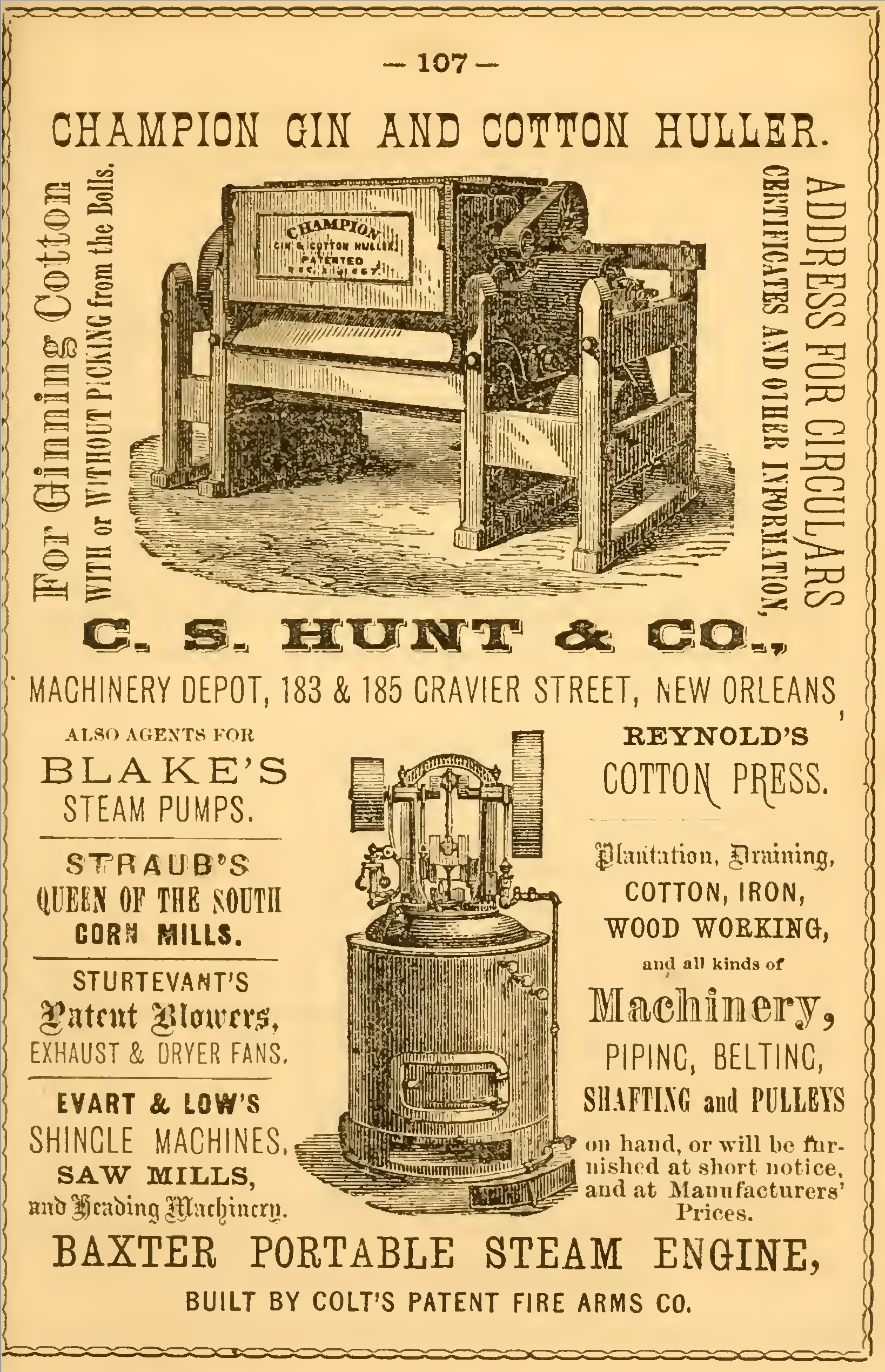
Guarded on either side by a fierce warrior, he was led to a carriage and therein securely placed, after which, to the music of the Royal Anthem and the roll of the drums, the King came forth and remounted, the Court and the household troops formed about him, the royal army formed into line, and in the order of their arrival they left the City Hall for Canal street, taking up, by the way, the Royal Navy, which, under command of Commodore Clemmens, joined the line at Poydras street.
The Marshals of the Royal Army, with their aids, having left the Court at the City Hall, immediately upon arrival, proceeded forthwith to Canal street, where, at Clay Statue, and in the vicinity, according to the published programme, the different divisions were promptly formed. Indeed the system and celerity manifested in this direction was worthy especial note, for, contrary to custom and general expectation, thorough preparations for the march were completed before the announced hour, 1 P.M.
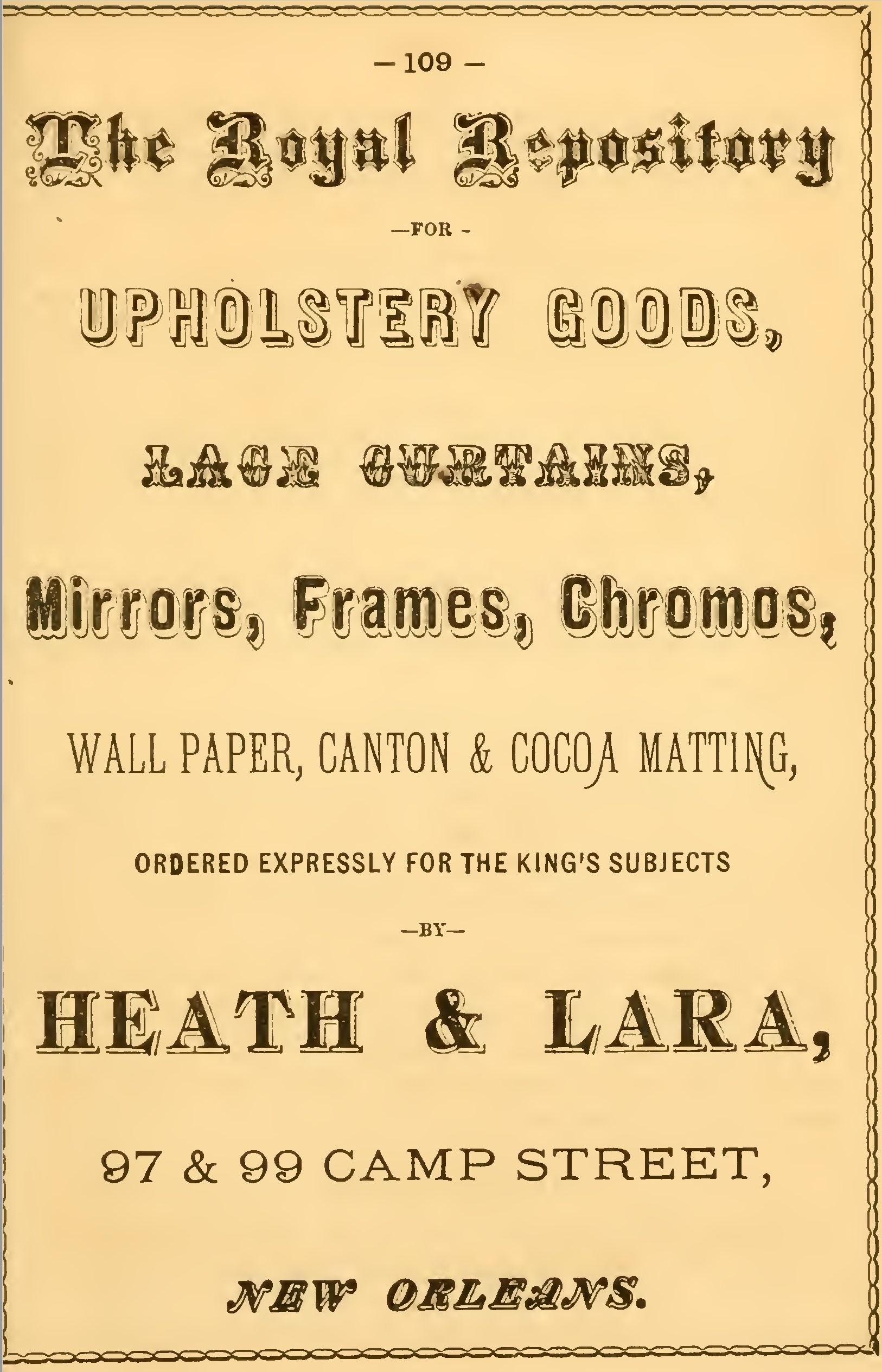
At that time, the King and his Court having arrived, the signal was given, the gun squad under the Duke of Kenton fired a royal salute of thirteen guns from the foot of Canal street, and without delay the march was taken up, the head entering St. Charles street in the following
The first herald of the approach of the grand procession is seen in one of the largest of the Southern Express Company’s wagons, drawn by four horses, directly behind which, seated with the driver, was one of fearful mein, holding aloft and bearing a blood-red banner, inscribed with the words:
On a neatly decorated platform in the wagon appeared a living representation of the royal arms, to-wit: a shield bearing the crown and sceptre, upholding which on either side stood Hercules with his ponderous club, and Jupiter forging thunderbolts — the picture being very striking, and withal a close approximation to one’s ideas touching the original creations.
Behind these figures was swung a large bell, which, clanging constantly, gave notice of the approach of the Royal Court. The Royal Dauber swung his ensign to the breeze from the rear of the vehicle, emblazoned with the cabalistic character, “To B. Heart.”
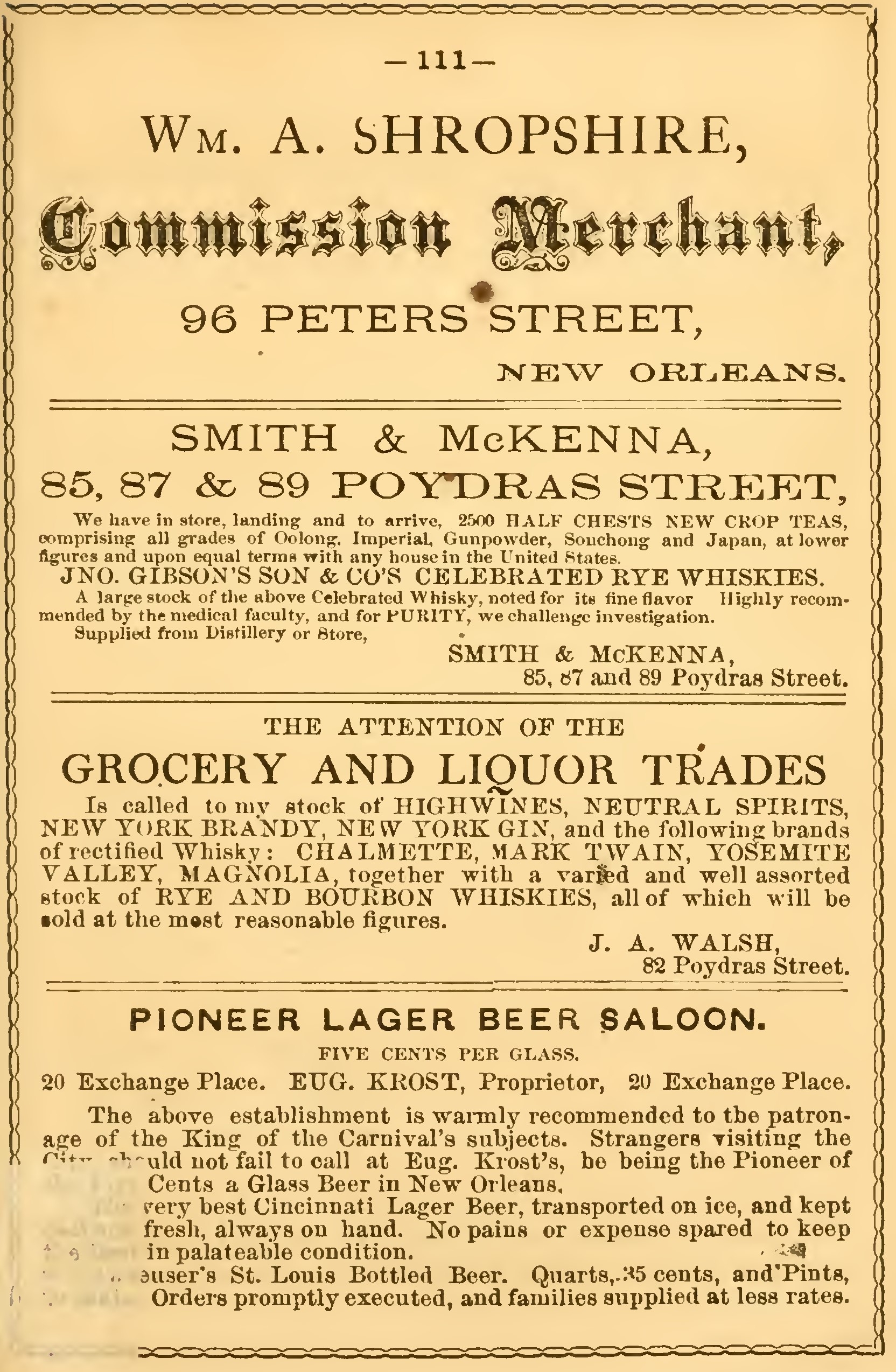
At the distance of a square behind this car came in view the vanguard of tlie procession, a squadron of mounted police, under command of Col. A. S. Badger, K. G. C. O. S. R., commanding the Household Brigade, charged by special edict with the preservation of the peace in the Kojal Capital.
Directly following came
mounted on caparisoned horses, and dressed in Egyptian costume of ianciful colors, flowing tunic, brown hose and sandals, while ever and anon they blew loud blasts on their trampets, as if to awaken to due consideration the gracious subjects of his Majesty.
now came, seated on a lordly stepping steed, decked with rich trappings of variegated hues.
The Earl Marshal was gorgeously attired in a crimson cloak, from the back of which stood forth the royal tiger, and richly trimmed with blue and gold. Beneath his cloak he wore a crimson coat, with armor-plated sleeves, while his Early legs were encased in triple armor, as it were, fairly resplendent in the sunlight. On his noble head he wore a brazen hebuet, from which fluttered the royal peacock’s plume; at his side wore a goldened, jeweled scimetar, and in his hand a golden baton.
Attending him, on either side, was an Egyptian soldier, one bearing his shield and the other his banner, of brown silk emblazoned with a crown, and at the apex of the golden staff lion’s head, while behind came two others, each carrying’ aloft a plume of peacocks’ feathers. Still behind, the Marshal’s troop was brought to its full by six mounted aids, attired in white coats and armored leggings, wearing helmets surmounted by grandly flowing peacock’s plumes.
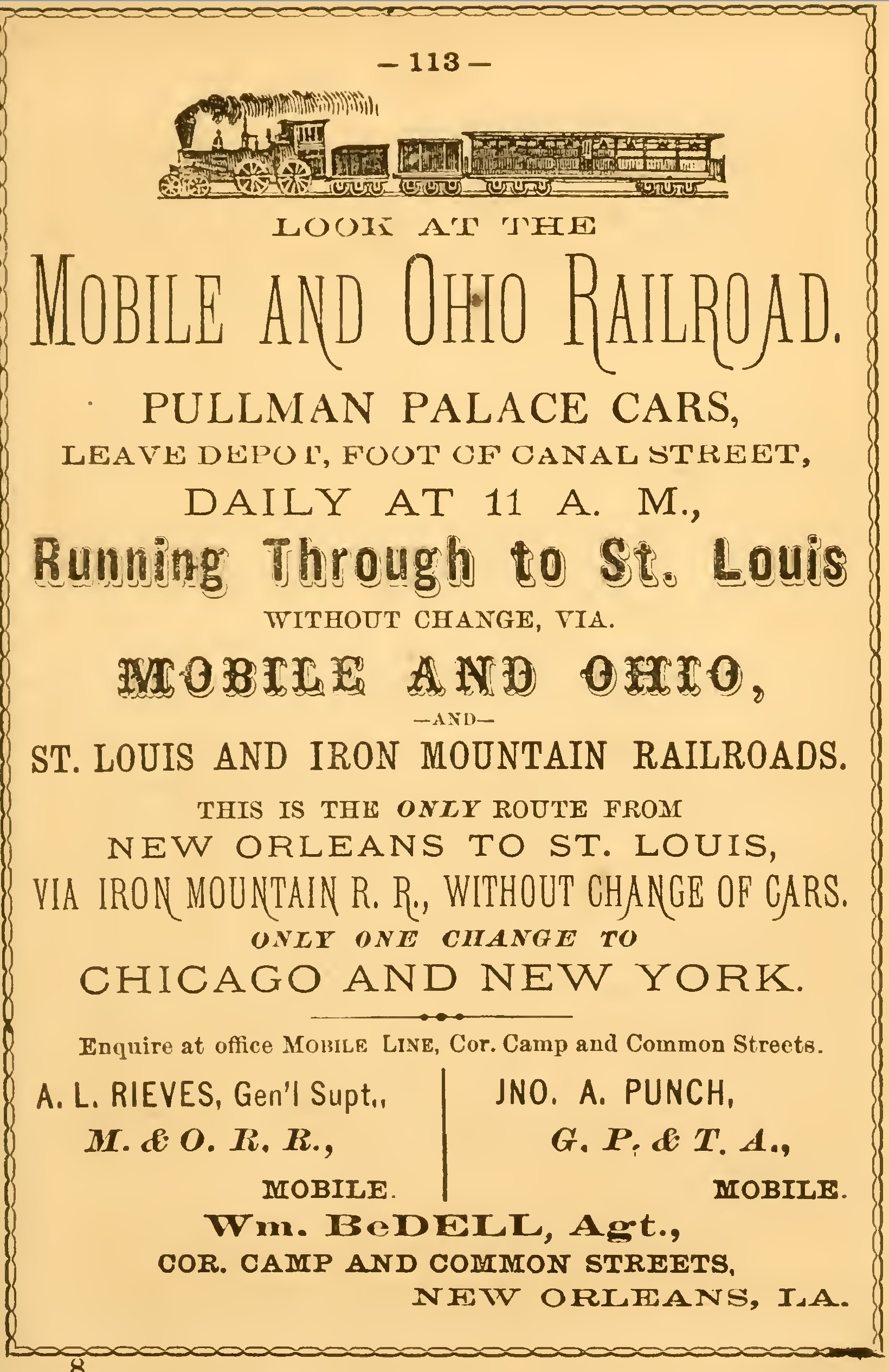
Chief among the State prisoners captured by Rex during- his royal march, now appeared in the person of his Honor L. A. Wiltz, who appeared in state, riding in a carriage, drawn by a pair of prancing grays. Accompanying him was Col. J. B. Walton, the bravest of the brave, and the hero of a hundred battles — so to speak. But in a moment of unguarded confidence he had been captured, with all his blushing honors thick upon him, and, like his noble companion in misery, doomed perhaps to dwell for aye within the deepest dungeon beneatli the royal castle. The sorrowing victims pass on to give way to
Following the prisoners comes the stately drum major of the iDth Egyptian Infantry band marshal with his musical corps of twenty musicians, who were attired in the traditional Egyi)tiau costume of flowing parti-colored tunics and havelocks, with armored leggins and sandals. With a brilliant burst of martial melody, they sweep by, and reveal the
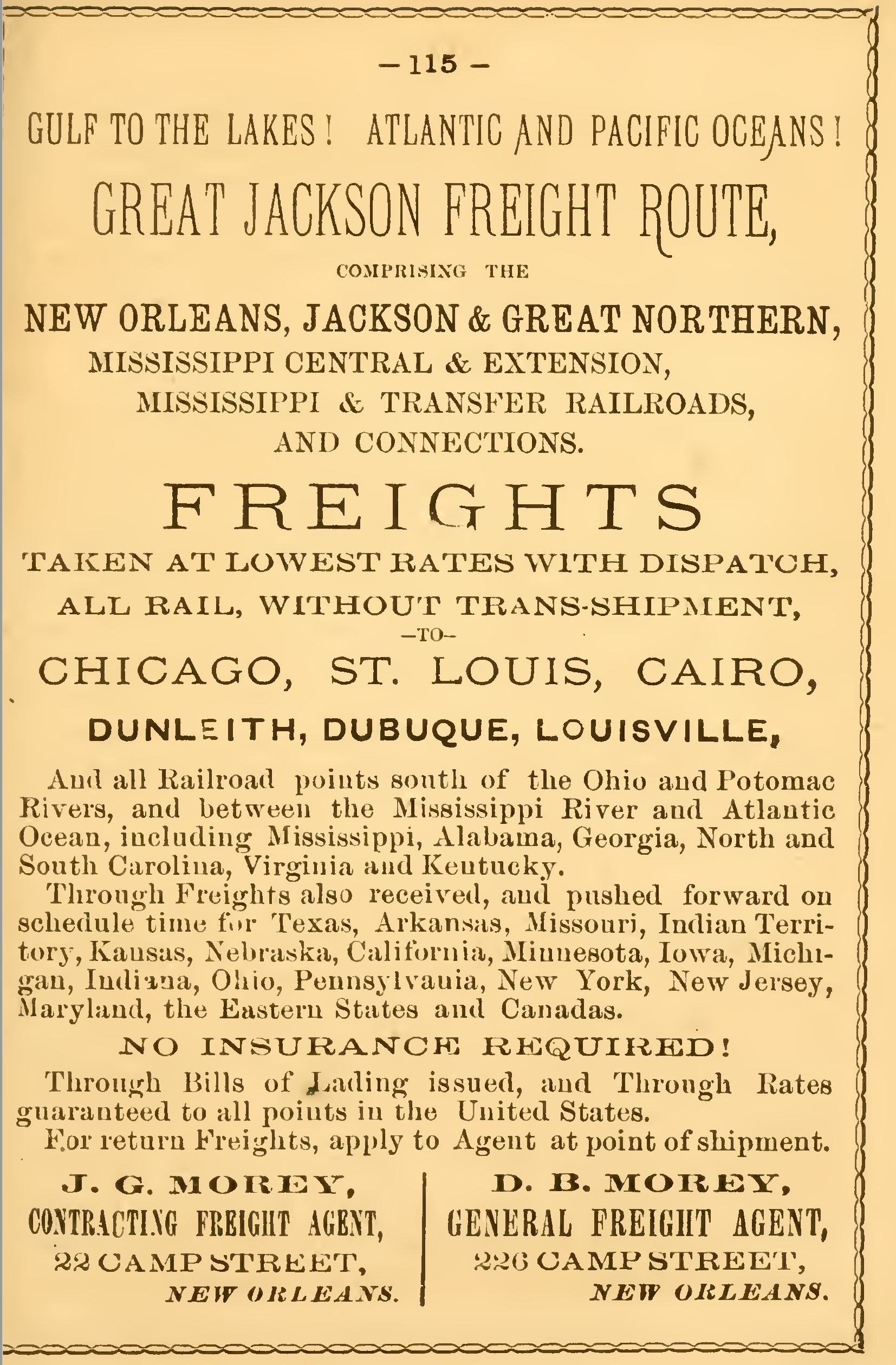
on foot, numbering one hundred strong, picked men, and comprising two companies of Sphis. These soldiers were in the Egyptian costume, of blue, red and yellow, and marched with that precision and soldierly bearing which followed so naturally on their long and hard schooling amid the plains of their native country.
Following came four companies, of two hundred men, from the 365th Arabian Artillery, costumed like the 19th Egyptians, having in their train two field pieces, of the kind usually known as the Napoleon guns. This body of soldiery presented a ferocious and warlike appearance, and seemed to warn away, as with a predetermined and savage inclination, all semblance of peaceful inclinations. Their vocation betrayed itself clearly as one of carnage, and their very looks bespoke a love for blood, quite awful to contemplate.
The royal army was quite picturesquely rounded oft by two companies — one hundred men — of foot soldiers from the 114th Regiment of Turcos, right from their native heaths and as wild as the untrained sons of the desert of which history has said so much in such soothing language.
These valiant Turcos were of course dressed like Turks — with the traditional baggy red pants, the savage-looking turban and the still more savage-looking scimetar, the very sight of which is quite sufficient to make one feel the most solicitous interest in keeping one’s bead on one’s shoulders.
These fierce looking men of blood were nevertheless worthy of enlarged admiration in point of “get up,” and suggested by the measure of their attractiveness, a certain charming ditty by the late lamented John Smith, Esq., commencing —
I wish there’d been more of ’em.”
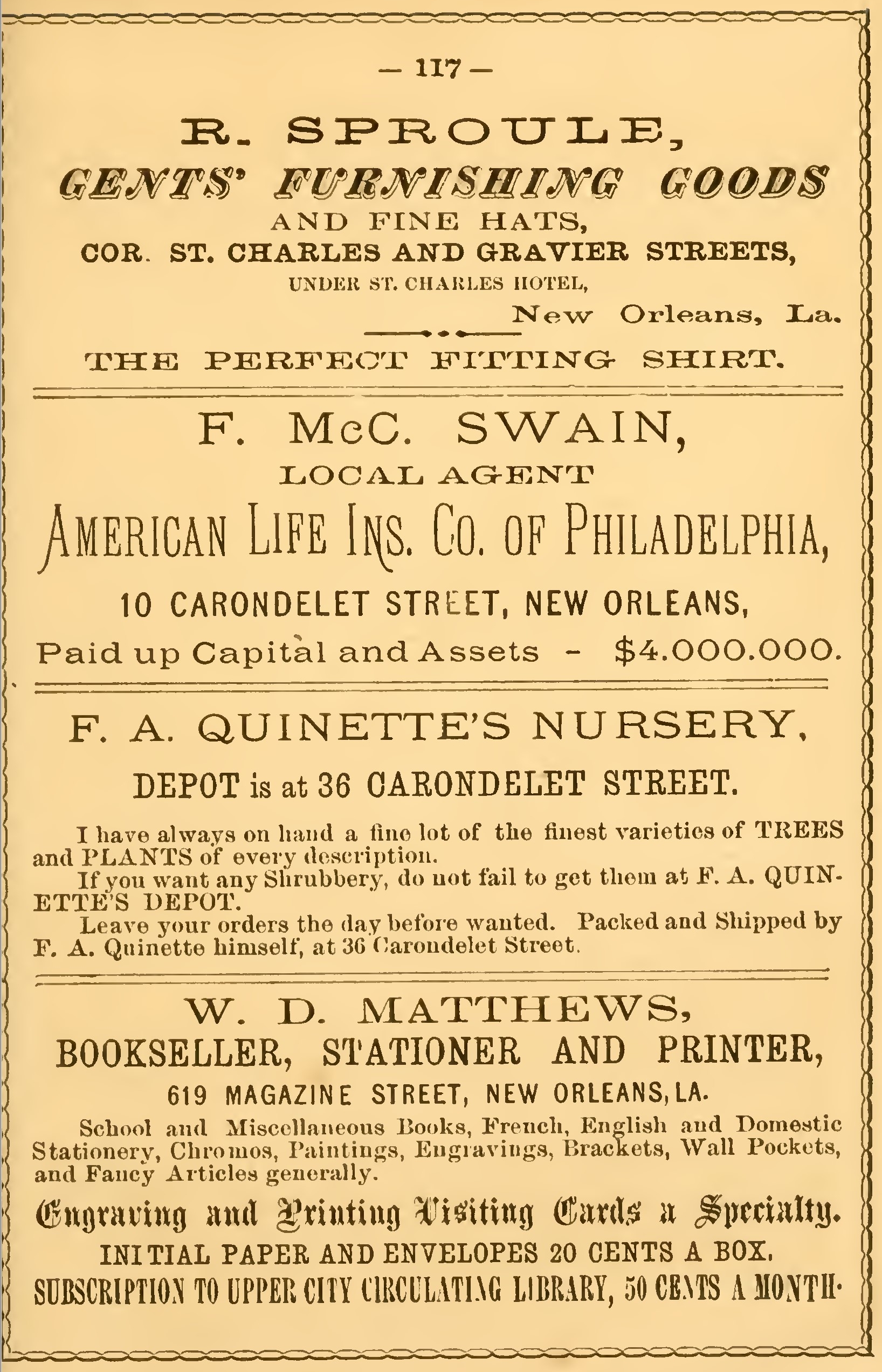
And now is heralded the approach of royalty itself. First, there is seen the royal band of twenty pieces, followed by a hollow square formed by a detachment from the Nineteenth Egyptians. Within the square and leading the van are three Egyptian pages on foot, each bearing before him a richly ornamented cushion, and on these, respectively, are — the royal crown in the centre; at the right, the keys of the city, and at the left, the orb. These three march abreast and hold in their iiands their bugles, while their unique costumes are handsomely set off by their brilliant helmets.
Behind them, similarly costunjed, bearing heralds trumpets, but mounted, come four more pages, each of whom bear before him respectively the royal mace, banner, shield and sword. Then, with stately head, bowing to his loyal subjects, and mounted on the noble charger, which has borne him in triumph through many of tlie most exciting epochs in his history, appears
himself. Rex seemed the same Rex who smiled so benignly on his subjects in the Royal Capital, a twelve-month before, and the same kingly consideration seemed to beam from his kingly eyes, and promised a long continuance of the pleased favor which has thus far marked his successful reign.
His Majesty was robed in a brilliantly hued Egyptian Irock, sparkling with jewels and fringed about with gold, while at its front he wore a golden breastplate, from whose burnished surface the sun reflected its rays with dazzling brightness. His kingly legs were adorned with leggins, wrought in colors of black and gold, and over his form there hung a cloak of royal purple, adorned with the royal ermine. On his kingly head he wore a golden helmet, surmounted by a crown, and in his hand he held the royal golden sceptre.
Following his Majesty, appeared the Royal Court, composed of nineteen Egyptian courtiers, attired each in a fanciful costume, as the taste of the wearer happened to dictate, but all preserving an unity in style, although there prevailed throughout as many colors, and more, too, than are popularly supposed to exist in the rainbow.
The courtiers, of course, were on foot, and came after his Majesty at a respectful distance, as if aptly trained to regard with proper reverence the atmosphere of redolent royalty which hedged in the sacred person of the King. The foregoing constituted the King’s household, and behind the courtiers the hollow square of Egyptian soldiers closed up.
A long line ot carriages now comes into view, and within these carriages are seated some attired as Egyptian courtiers, and others in the simple citizen’s costume, the Peers of the Realm, numbering upwards of eighty, and embracing Ducal representatives from every province in his Majesty’s dominion, from the Duke of Worcestershire even down to the Duke of Bull Run. Each Duke wore upon his breast the glittering order of St. Rex — the cross and the crown — suspended by a bright blue ribbon.
This portion of the display was one of the most attractive features in the procession, and evoked along the line of march such marks of hearty and cordial admiration as must have been gratifying to the gentlemen who had labored so long and so patiently to bring forward an organization well deserving its title and the award of popular praise.
Four companies of the King’s Own, numbering upward of four hundred mounted men, under command of the Duke of Armah, were costumed in the wild, weird and fantastical uniform of the Bedouin Arabs, with loose, flowing white and red tunics and trowsers, and the traditional scarfflung from the heads, reproducing to one’s mind the pictures often seen of the wild son of the desert; the Bedouin, whose only home is where the hot simoon blows, and the luckless wayfarers bide the time of their destruction. According to tradition, these soldiers carried long, free lances, which, as they held erect, presented to the eye a picturesque and a novel sight.
Attending the King’s Own came one company of the 92d Lancers, likewise mounted and in every respect costumed and appointed like to the King’s Own.
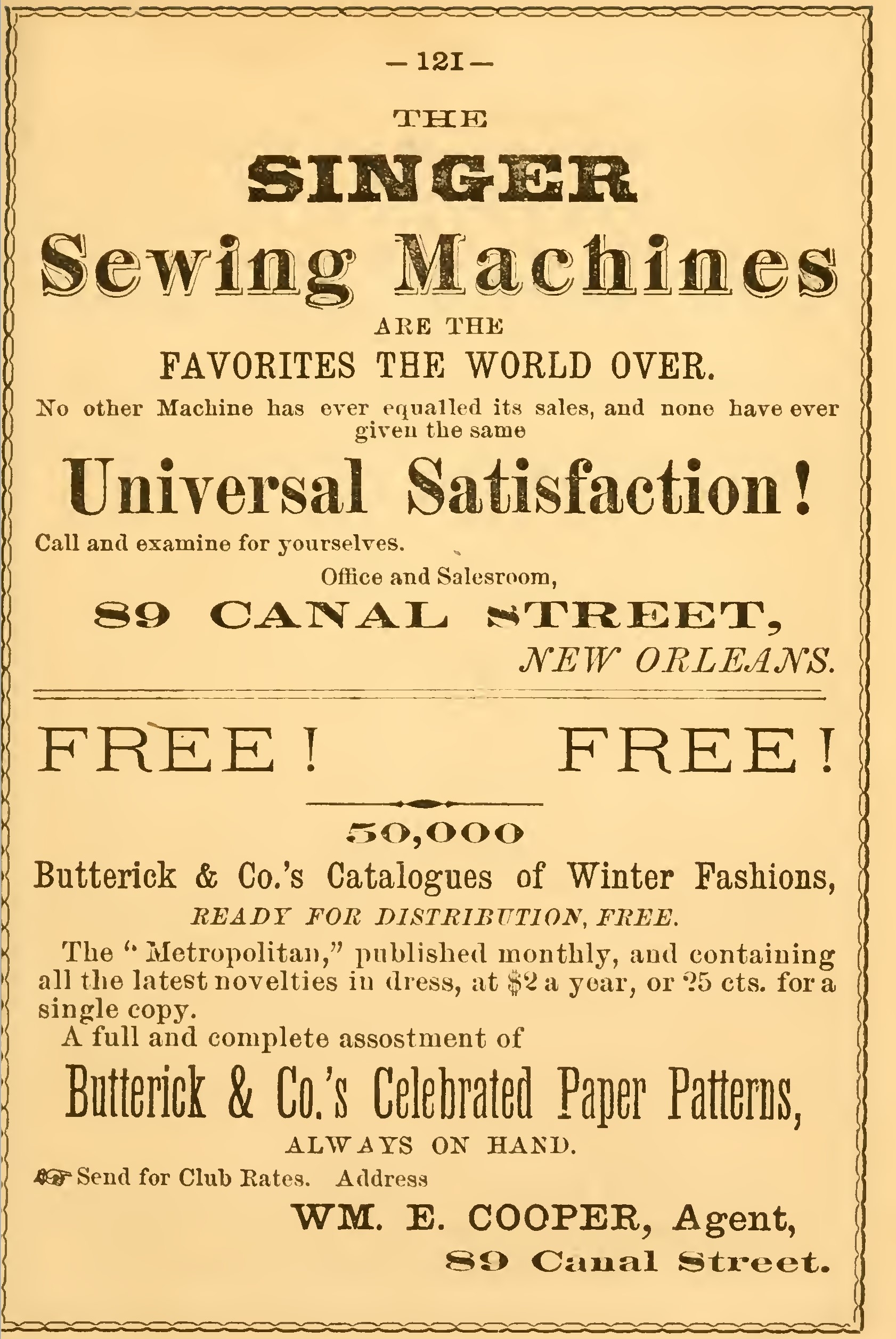
In a handsome carriage drawn by four bay chargers, canie the fair daughter of the King’s Own Reginient. Attired in the most gorgeous style admissible under the circumstances, this cherished pet of the stern sons of Mars, smiled benignly upon the admiring thousands on every side. That she was a remarkably stout daughter of the regiment, was not to be wondered at, because she belonged to a heavy corps. What if her fighting weight was four hundred and forty-six? That was pretty good evidence that she could not only paddle her own canoe, but that she could also get cleverly away with three square meals and a lunch each day — which must have been a great comfort to her.
With a keen relish for the harmonious blending of the stern alarums of war, with the humorous phases of existence, the commandant of the forces had prepared, as a rear guard, a spectacle of vigorous humor, mules and army wagons combined in one graceful whole, and to say that the effect was wholesome is hut to reiterate the eulogies of laughter whicli greeted the passing show.
Now, looming proudly into view, comes the royal elephant, treading the earth as if conscious of the majesty he represented, or better still, feeling a painful want of confidence in the shaky pavement, which, to his elephantine intellect must have offered but a feeble comparison to the serene security of his native jungles, auiid the wilds of the home of the Hottentots.
Then came tbe Royal baggage, the Quartermaster’s Department and Commissary Department.
This was noticeably a feature of the procession, embracing no less tlian twelve ships of the line, each mounted on a four-wheel truck handsomely painted, carpeted and appropriately decorated.
In consequence of an accident received during the journey hither and the scores of wounds received in countless battles, the Lord High Admiral, instead of occupying his position in the flagship of the squadron, preceded the ships in a carriage, decked out in his gorgeous uniform and fairly resplendent with the dazzling decorations which had been conferred on him for his distinguished bravery on many a river and sea of gore and glory. His carriage was fancifully adonunl with miniature ships and other insignia of the royal navy, presenting at the same time a pleasing picture and a cheerful reminder of the glories which enshrouded the fame of the battle scarred hero.
Charley Jaeger’s band now came to the front, preceding the Lord High Constable of the Yeomanry, with his aids, who marshalled his followers, a motley crowd of three or four hundred foot maskers, representing all conceivable characters.
Then came the Boiuf Gras, a splendid specimen of the genius bovine, of a rich red color, faultless in proportion and of immense size, his weight being 2250 pounds.
was led by the Master of the Horse, attended by standard bearer, shield bearer and six aids, representing Mamelukes, and all attired in their appropriate garbs, which consisted of a chain mail, gilded helmets, with visors raised, guantlets, spurs, and armed with spear and scimetar. This costume was gotten up with deservedly good taste and appropriations, and the decorations of plumes and medals which were added, enhanced the appearance to a popular degree.
Then followed the Amateur Lafayette band, to whose music marched the ancient order of OxOnians, the State Lancers, in the warlike garb of the Crusaders. Closing the rear of this squadron of horse, came Cervante’s knight errant, Don Quixotte and his man Sancho Panza.
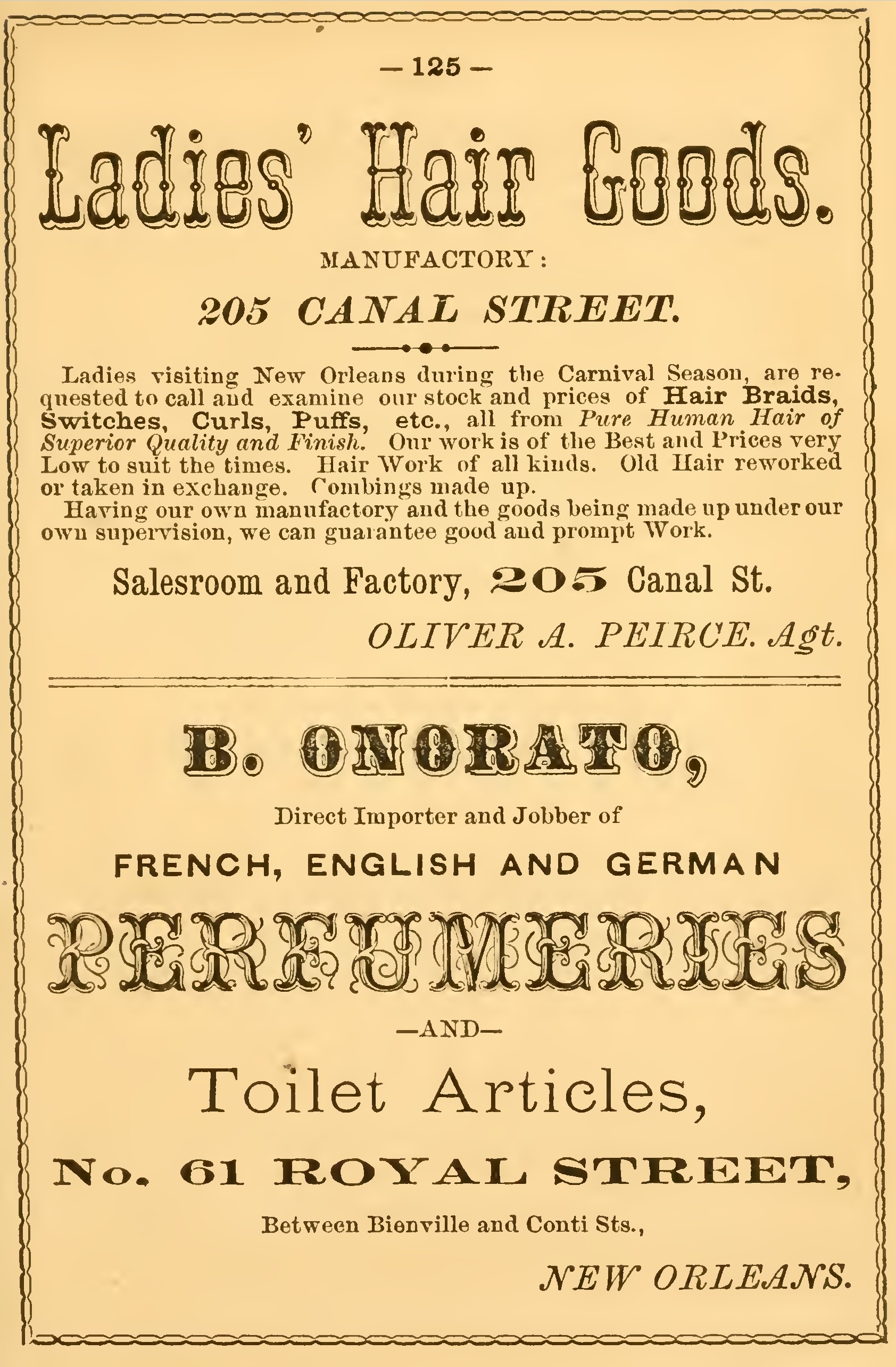
Having our own manufactory and the goods being made up under our own supervision, we can guarantee good and prompt Work. Floating aloft the orauge colored banner, announced the approach of this department. This division was composed of some ten or twelve carriages freighted with beautifully dressed mortals robed in garments of variegated hues, rivaling the gaudy colors of the rainbow.
In this division we noticed one wagon occupied by two rare specimens from the country, with conspicuous placards stuck upon their backs, boasting of their wisdom, although they hailed from the rural districts.
The Carnival Association, representing the Seven Ages of Man, appeared in this division. These were mounted upon floats that had been prepared for the occasion.
This division, comprising all maskers in vans, floats, wagons, milk carts and other public vehicles, commanded by the Lord of the Vans.
In front of the column floated the royal banner. It was most tastefully contrived; made of the flnest silk of that delicate tint known as the ashes of roses; and trimmed with a deep border of crimson velvet, it fluttered defiance of competition to the rest.
The Lord of the Van, mounted on a large black charger, rode immediately behind. He was clad in a showy dress of red, with a pale green tunic thrown gracefully about his shoulders. Around him clustered his faithful body guard, numbering some six or seven, robed in the habiliments of their office.
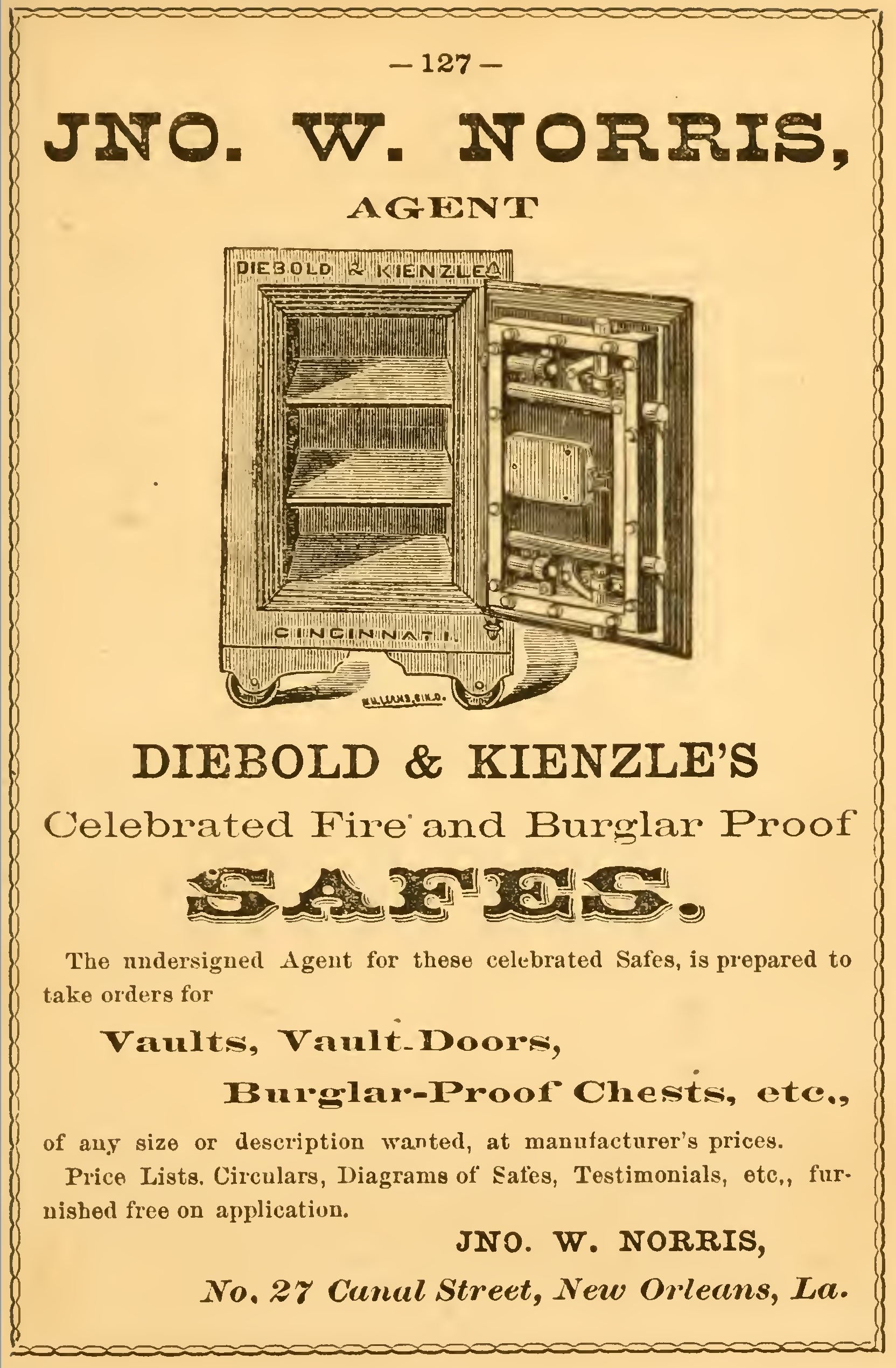
This division, consisting of all kinds of vehicles, persons on horseback or on foot, platforms on wheels, on which were displayed all sorts of articles representing any trade or business, all under the command of the Lord High Sheriff of the Guild, formed on the south side of Canal street, it right resting on Camp street, and extending towards the river.
The Lord High Sheriff was mounted on a prancing charger, himself dressed in a silk mantle bordered with gold, with ornaments to correspond. He was attended by a brace of Squires, each mounted and caparisoned in like gorgeous costume. These headed the advertising displays.
The Lord of the Unattached brought up with his division the rear of the procession. All the stragglers and late coiners, whether on foot or mounted, were gathered into the ranks, and certainly made up an amusing and interesting crowd.
Having given some idea of the great extent and rich display of the procession, we turn to other subjects of interest connected with his Majesty’s short but joyous reign.
From the turrets, on either of the four corners of the Palace, were displayed his Majesty’s tricolored flag of purple, gold and green. It would not have been seemly that his Majesty’s vassals should have ignored so festal a day, and all of their industry, energy and tact was exhibited to make of the royal abode everything: that his Majesty’s guests could have possible reason to expect on so grand an occasion. The grand plaza in front of tlie Pahice was crossed by cords, Irom which were suspended royal ensigns.
The vestibule of the Palace, behind the portcullis, was handsomely decorated and ornamented with evergreens and tropical flowers, and presented a most attractive appearance, inviting homage from the most abject subject of his Majesty’s realm. Archways of imperishable shrubbery graced the passages and stairways which led to the courtrooms above, and these were flanked on either side with blooming shrubs whose fragrance gave pleasure to all who came within their benign influence.
Ascending the stairway, the guest found himself ushered into the assembly room, through which he passed, under another evergreen archway arranged in most elegant and tasty style into
The royal upholsterers, Messrs. Charles and Wm. Bastian, of 30 Marais street, were instructed to spare neither pains nor expense in fitting up his Majesty’s reception chamber in a style meet for so grand an occasion, and they demeaned themselves in a most fltting manner.
This was not more than proper, because here it was that Rex received his subjects, and, surrounded by the Lords of the Realm, be received from them the homage due to his eminent position as “ King of the Carnival.”
The floor was richly carpeted and in the centre and in the parlor was a dais or triple step platform, upon which was the throne, whereon sat his Majesty, supported on the right by the Lord High Chamberlain. Above him was the royal bird (the peacock) volant, below him was the royal beast (the lion) couchant, and on either side, as he sat in state, were favorites in his Majesty’s household.
The Throne was partly enclosed with rich tapestry, in which were distributed in equal proportions the Eoyal colors — purple, gold and green overhead was a canopy, bearing, in proper deference to his supporters, the red, pink, violet, white and scarlet colors of the realm; from the canopy ten ensigns of his favorites surrounded Rex’s own flag were desported, and beneath these were the King’s shield and armorial bearings.
In front of the throne lies a never ceasing, ever playing fountain. In the basin, beneath, were flowers of every hue and every clime, contributed by his Majesty’s subjects from all parts of the world to give additional grace and glory to the occasion. Their beauty almost dimmed the eye and their fragrance almost dazzled the senses.
The walls on either side were decorated with the ensigns, banners and shields of his Majesty’s favorites; and in the panels, suspended from Comus’ emblem — the laughing mask — were hanging baskets of chaste design, filled with gaudy and fragrant flowers.
The pillars and pilasters were intertwined with festoons of flowers, evergreens and tarleton, strictly in accordance with good taste, and the whole scene was made more than ordinarily brilliant by hundreds of lights of colored tapers and gas jets appropriately distributed about the grand rendezvous.
At 10:15 P. M. the band struck up Davis’ royal anthem, “If Ever I Cease to Love,” the folding doors between the ball room and the throne room rolled back, and forth marched the royal court, headed by four heralds with their brazen trumpets, followed by courtiers to the number of twenty, including the majestic and dignified pursuivants in their flowing robes of golden color, and carrying their golden wands as if they themselves were equal to bearing the weight of the court’s royalty.
Behind them marched the King, preceded by the bearers of the crown and orb, and followed by a detachment of courtiers. Twice around the ball room the procession held its way, at the close of which the King selecting from the assemblege a lady to honor him as temporary Queen, the line filed into the throne room, where the King and Queen took their places, one on either throne, the court ranging itself on either side of the thrones.
The Earl Marshal, now advancing to the door, gave notice to the awaiting assembly that the King and Queen would receive their subjects, who marching in at the right, paid their obeisances on passing the thrones, receiving in return acknowledgments, and thence filing to the left, passed out.
The reception proper lasted fully three-quarters of an hour, and although the crush of people was quite fearful to behold, so admirable were the arrangements, that no delay of even the slightest nature occurred.
The Queen, selected for this occasion, Mrs. Fearn, was handsomely costumed in a plain black silk, with hair elegantly dressed a la pompadour, while her attire was noticeably free from ornamentation.
The reception concluded, the King and Queen descended from their thrones, and, unattended, sought the ball room, where they mingled with the gay throng, but only to promenade, the observed, of course, of all observers.
Notwithstanding the cynical philosophy of these latter days, there are circumstances in which a man may be pardoned for the gushing form of expression. No matter in what sardonic frame of mind the wearied reporter ascended the winding stairs of Exposition Hall, it was altogether impossible for him to preserve it after entering the grand ball room and coming under the magic influence of that scene.
Decorations of Oriental magnificence, lights of blending radiance, and the intangible exhalations of youth and beauty are not to be viewed stoically by living man. That heaving sea of faces sparkle with beauty’s eyes, and the zephyrs which flutter across its bosom are heavy with sensuous perfumes that never blew from nature’s caves.
The world of those beings who give joy forever is here to gladden men’s poor souls. Fashion, with its hydra-headed fantasies and conceits, has exhausted all its craft in enhancing beauty, which seems, in this dazzling light, to need no aggravation. As we watch the never-ending circle of promenaders, we see the representatives of every State pass by. Here is a group of exquisite maidens from the warm plains of Georgia, Alabama and Mississippi, and there a glowing delegation of Kentucky’s fairest daughters, with their splendid presence and luxuriant charms. The beauty of Chicago, St. Louis, Baltimore, New York — nay, did we not see some clear cut profiles and delicate, symmetrical forms from Boston? — moved by in the kaleidescope cortege.
The sparkling Creole is here in force. There may be richer dresses than hers, but none more tasteful and winning to the unprofessional eye. Her lythe form and mellow black eyes are passing beautiful to us, who find them always beautiful.
The average young man, viewing the glittering procession from vantage ground about the door, feels his waistcoat throb with new sensations.
And well may it be so; for he is looking at that for which men have done and died since tradition rose from myth. Never did Launcelot or Modred lay his lauce in rest for sweeter lips and brighter eyes, even though he chose them from the galaxy that shone at Camelot.
But a sudden muffled prelude is heard, and soon the passionate throb of Strauss’ masterpiece drowns the soft tumult. The ripple of woman’s laughter and the rustle of her silken robes are lost in these other sounds, and the stately process of the promenade melts into the voluptuous movement of the waltz-
Were not only general and very profuse, but marked by a refined taste and desire to honor the occasion, which must have been gratifying to his Majesty. All public buildings and private residences along the line of march, stores and offices bore evidence of our people’s loyalty to their Sovereign, and everywhere actions spoke louder than words, with the popular acclaim,


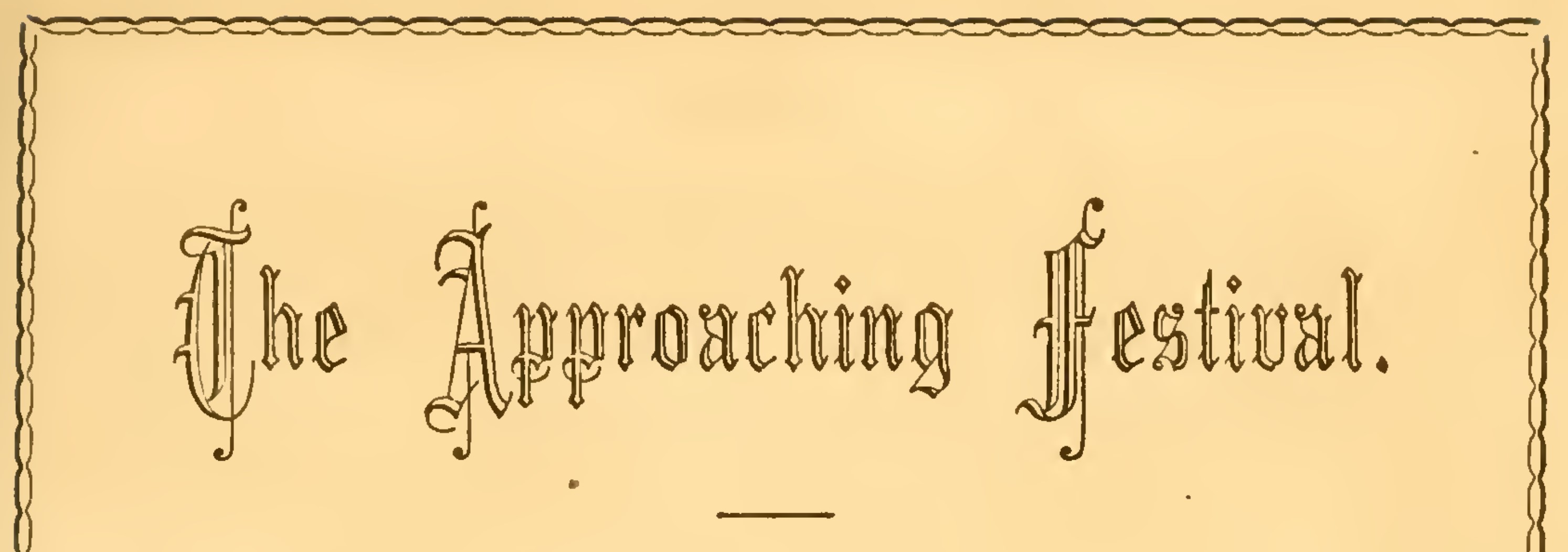
That the approaching festival, Mardi Gras, February 17, 1874, will by far surpass any of its predecessors, there can be no doubt. The most extensive preparations have been made for the reception and honorable entertainment of his Majesty, and his guest, the Shah of Persia, who will accompany him on his visit to his chosen capital. We quote here edict XVI. and the replies thereto, and we have no doubt that with the arrival of the King, and the free matinees, Monday will be a glorious day.
BY THE KING OF THE CARNIVAL.
EDICT XVI.
To all to whom these Presents Shall Come — Greetings:
Know ye, That, inasmuch as His Most Puissant Majesty intends rendering the day of his triumphal entry into this, his capital, memorable in history, and inasmuch as it is the royal pleasure that certain extraordinary rights and privileges be granted, upon said day, to his loving and trusty subjects in reward for the unswerving allegiance they have so signally manifested to his Majesty’s House and Person, it is hereby ordered and decreed :
- That all existing forms of whether civil or military, that may iu anywise conflict with his Majesty’s authority, are hereby abolished.
- That all public offices, whether State, National or Municipal, all corporations of whatsoever kind or description, and all private places of business, are ordered to be closed, and all duties connected therewith suspended for the time being.
- That all places of public amusement, directly under royal patronage, to-wit: The New Opera House, Academy of Music, St. Charles Theatre, and Varieties Theatre, are hereby ordered and directed to give Public Matinees, upon Monday, February 10, 1874, the eve of His Most Blessed Majesty’s fete day; admission to same being Gratis to all and any of his Majesty’s loving subjects, who may desire to avail themselves of the royal largess.
- That all loyal subjects, whether in organized or individual capacities, are hereby enjoined to report forthwith for active service, to the Right Honorable the Earl Marshal of the Empire, who is charged with the execution of this our Koyal Proclamation.
Given under our hand and seal, at sea, off the City of Gibraltar, this, the 26th day of January, 1874, and the 1003d of our reign.By the King Himself: Rex.Attest:Warwick, Earl Marshal of the Empire.
Address Box 703, New Orleans Post-Office.
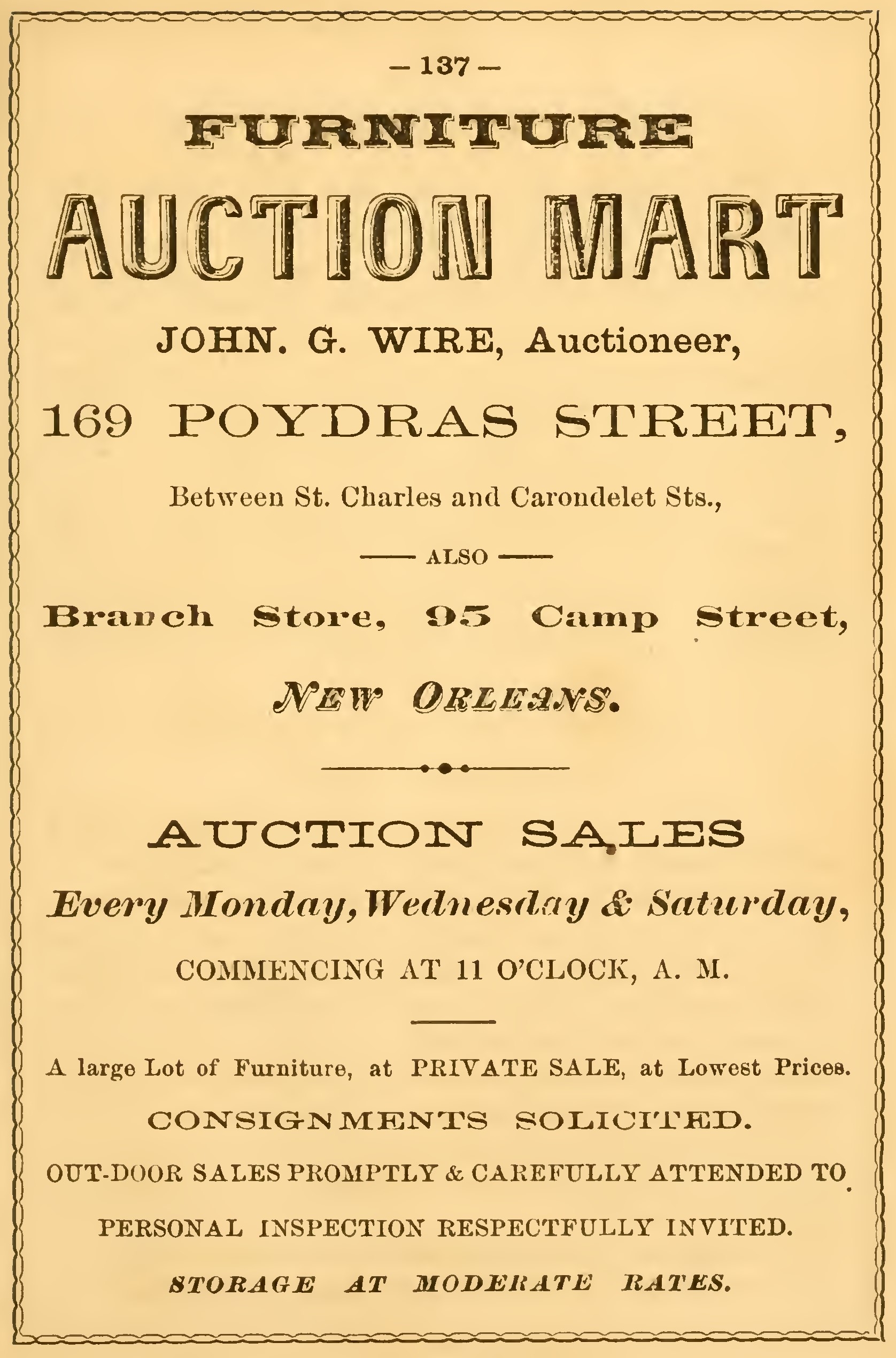
THEATRICAL MATINEES FOR THE MILLION
Early the present week, it was related that Rex had caused to be issued to the managers of our theatres a proclamation commanding them to set their houses in order, to the end that on the day preceding Mardi Gras, to-wit: February 16, there should be offered at each theatre a dramatic performance, open to the people without money and without price.
In response to the King’s command has come up an earnest indication of the obedience from our managers, and there will therefore be given free entertainments at all the theatres on the day named, as all the theatres on the day named, as witness the following:
New Opera House }
To His Most Gracious Majesty the King of the Carnival:
Sir — Your royal behest has reached me, one of the most loving and loyal subjects, and appreciating the generous feeling which has dictated this degree, by the observauce of which so many of your people will be made happy, I hasten to assure your Majesty of my gratitude to you, for thus opening a way by which both the manager and the artists of the Opera House may testify and love the veneration in which they hold your will.
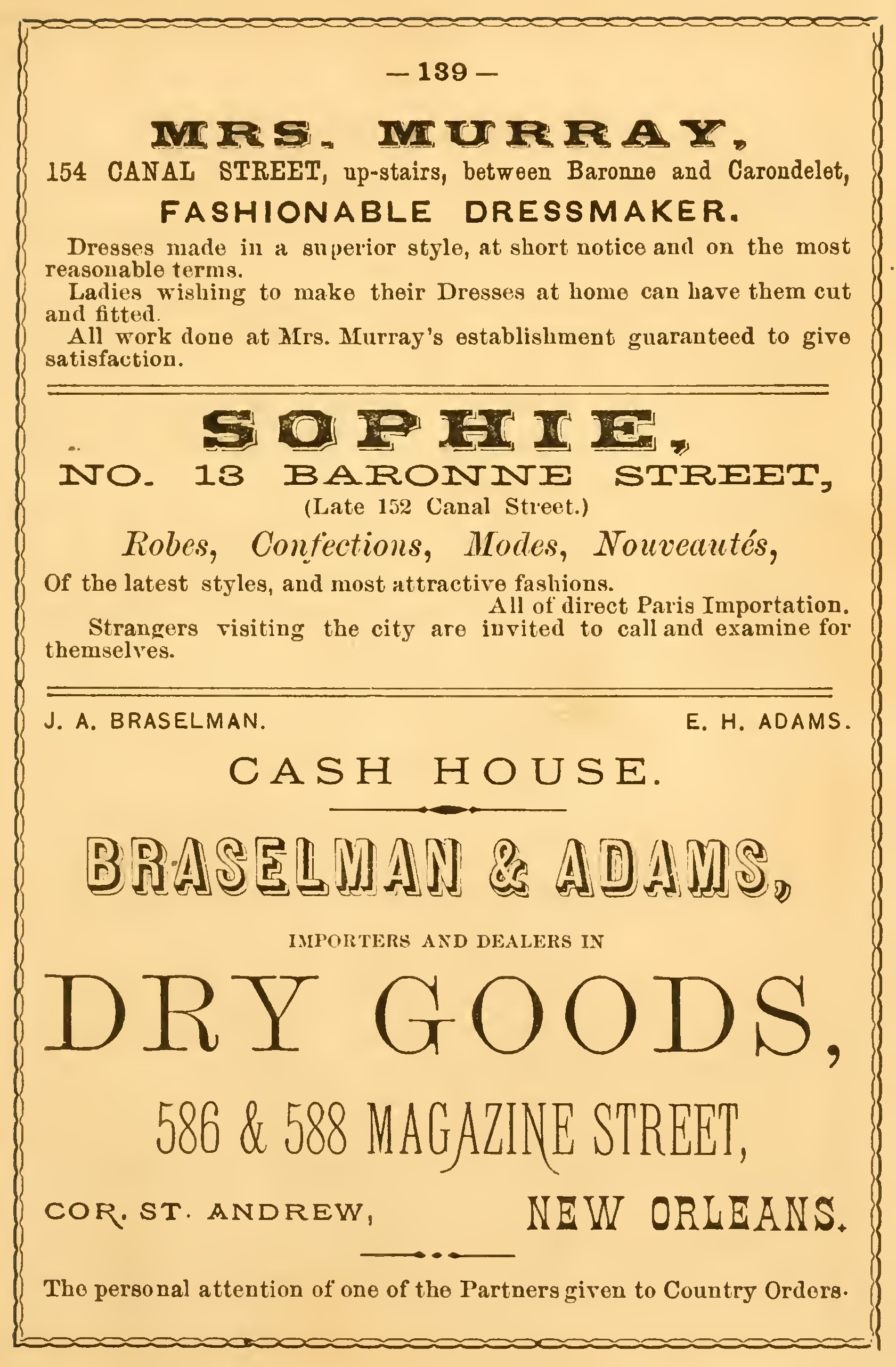
Agreeable to your royal mandate, the New Opera House will therefore be open for the free admission of such your liege subjects as may desire to honor it with their presence on Monday, February 16th, 1874, at 12 o’clock, noon, when such a bill will be presented as will reflect honor upon your wisdom in selecting this method of diverting the people of your chosen Capitol.
I have the honor to be your Majesty’s most obedient servant,

I am instructed by Miss Lydia Thompson to express her obedience to Edict XVI, by His Most Gracious Majesty Rex, and inform you that she, with her entire company, will reuder services ordered by a maintenance performance on Monday, feb. 16, 1874, at the Academy of Music.
God save the King.

To the Right Honorable the Earl of Warwick, Marshal of the Empire, greeting:
In obedience to the Royal Edict XVI, section 3, requiring service of all loyal subjects of the theatrical profession on the occasion of you approaching festival, I, Lotta, one of the most diminutive, but most loving, tender myself and banjo to serve wherever and in whatever capacity his Most Gracious Majesty may direct. With the best wishes for his long and jolly reign, I am
Yours, respectfully, Lotta.
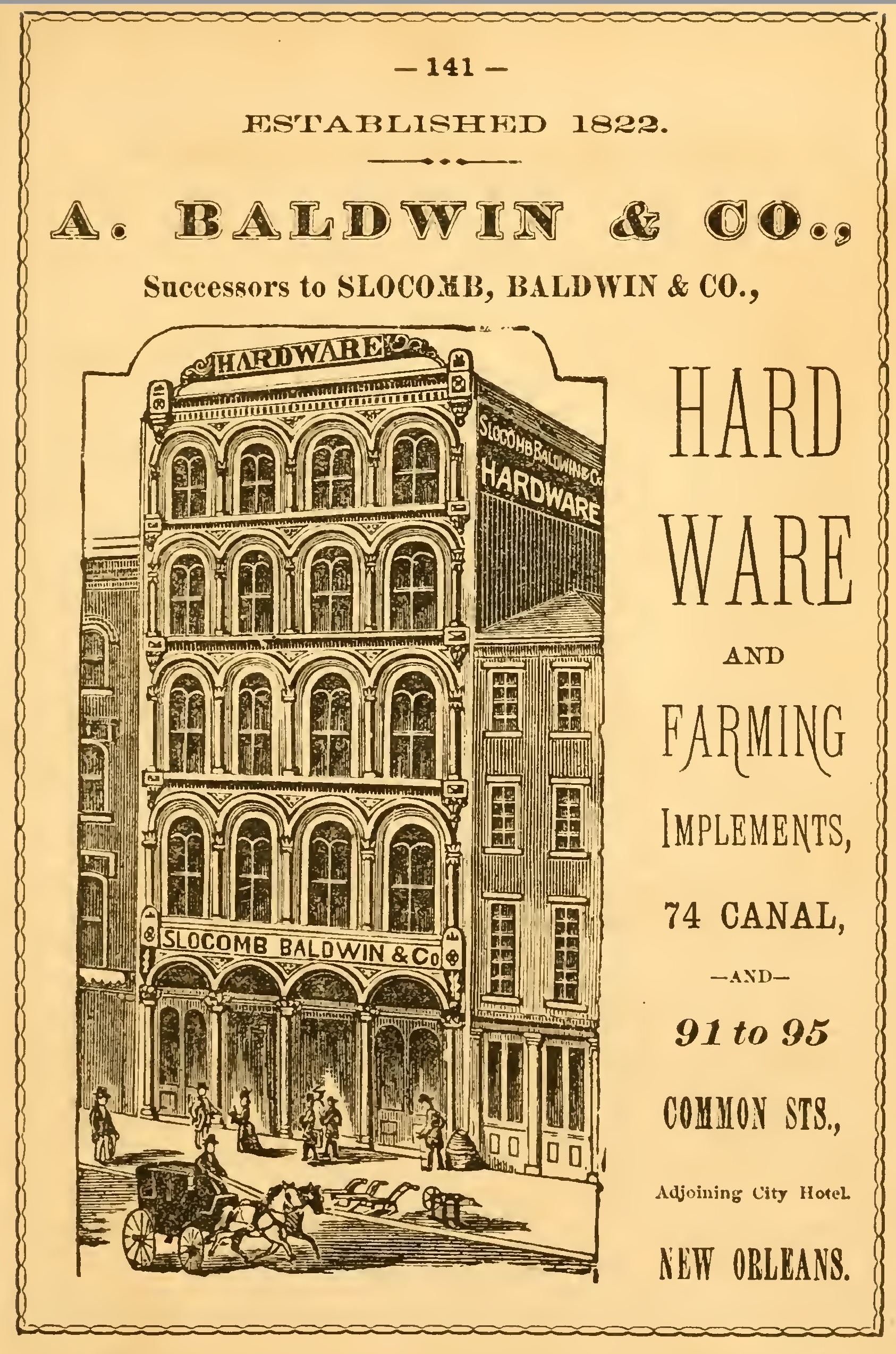

Academy of Music, }
In obedience to Royal Edict XVI, the Academy of Music will be thrown open to all loyal subjects of his Most Gracious Majesty Rex, King of the Carnival, on the morning of February 16th, 1874, when Miss Lydia Thompson and her mammoth burlesque company will present one of her inimitable entertainments, and your servant ever prays for the joyous reign of His Majesty.

FROM VARIETIES THEATRE.
To His Majesty the King of the Carnival:
Sire — In obedience to your Majesty’s proclamation, I beg leave to place the Varities Theatre at your service for a free matinee, on Monday, February 16, 1874. I am also requested by Mr. John T. Raymond and Miss Mary E. Gordon, to state that they most respectfully beg leave to render homage and personal service to His Majesty Rex, on the appointed occasion.
I have the honor to subscribe myself your Majesty’s most humble obedient servant,
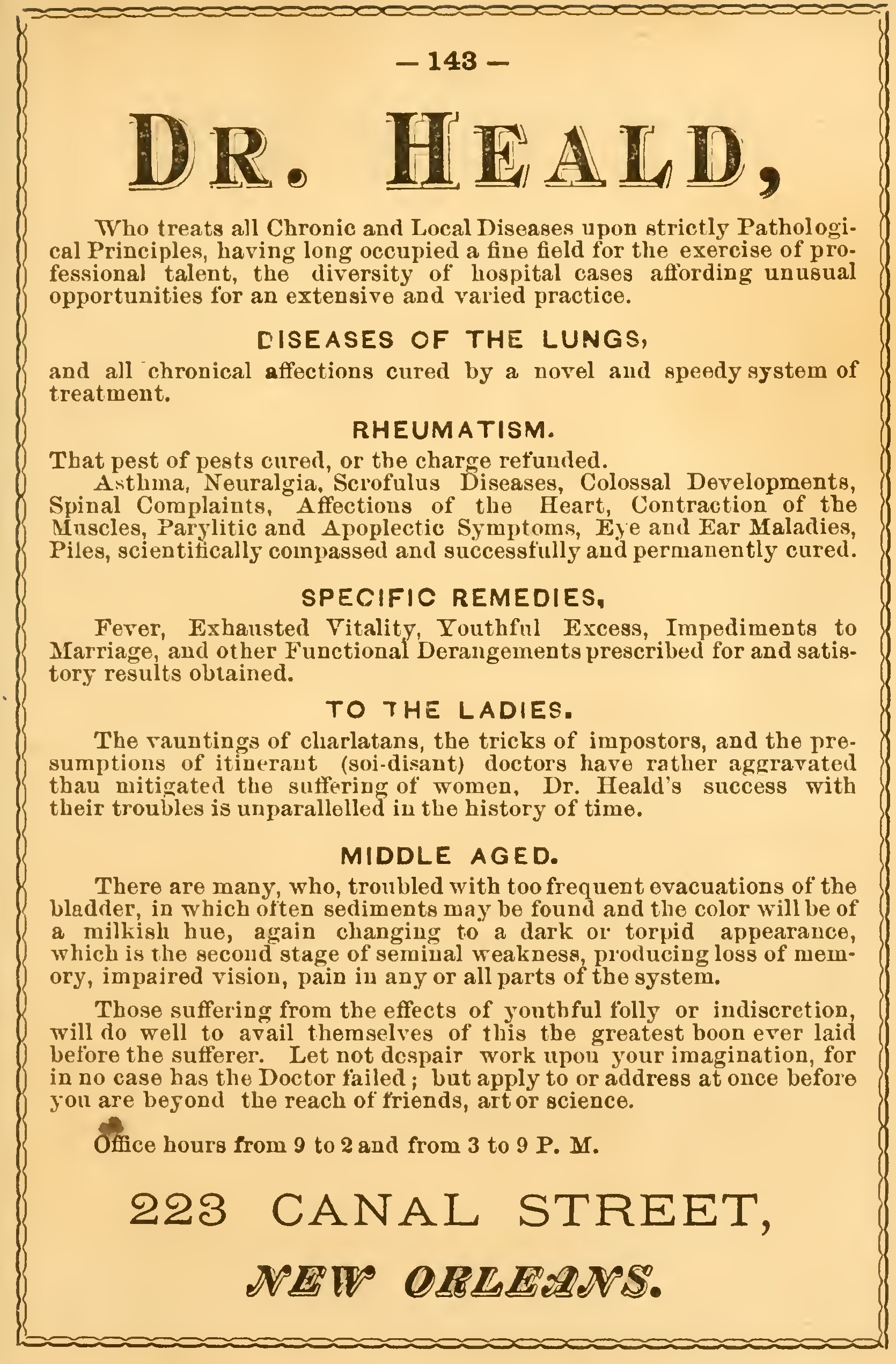
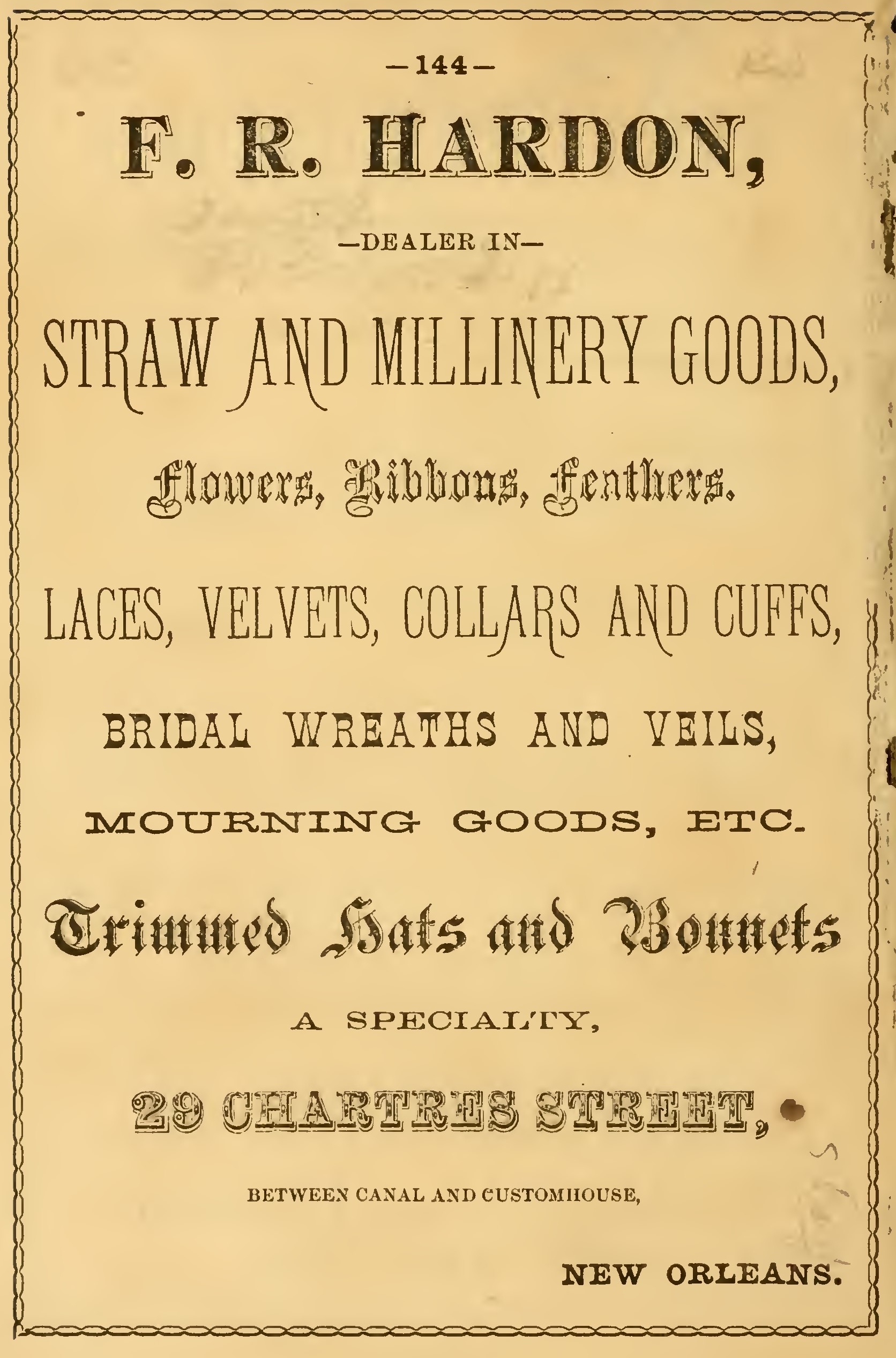
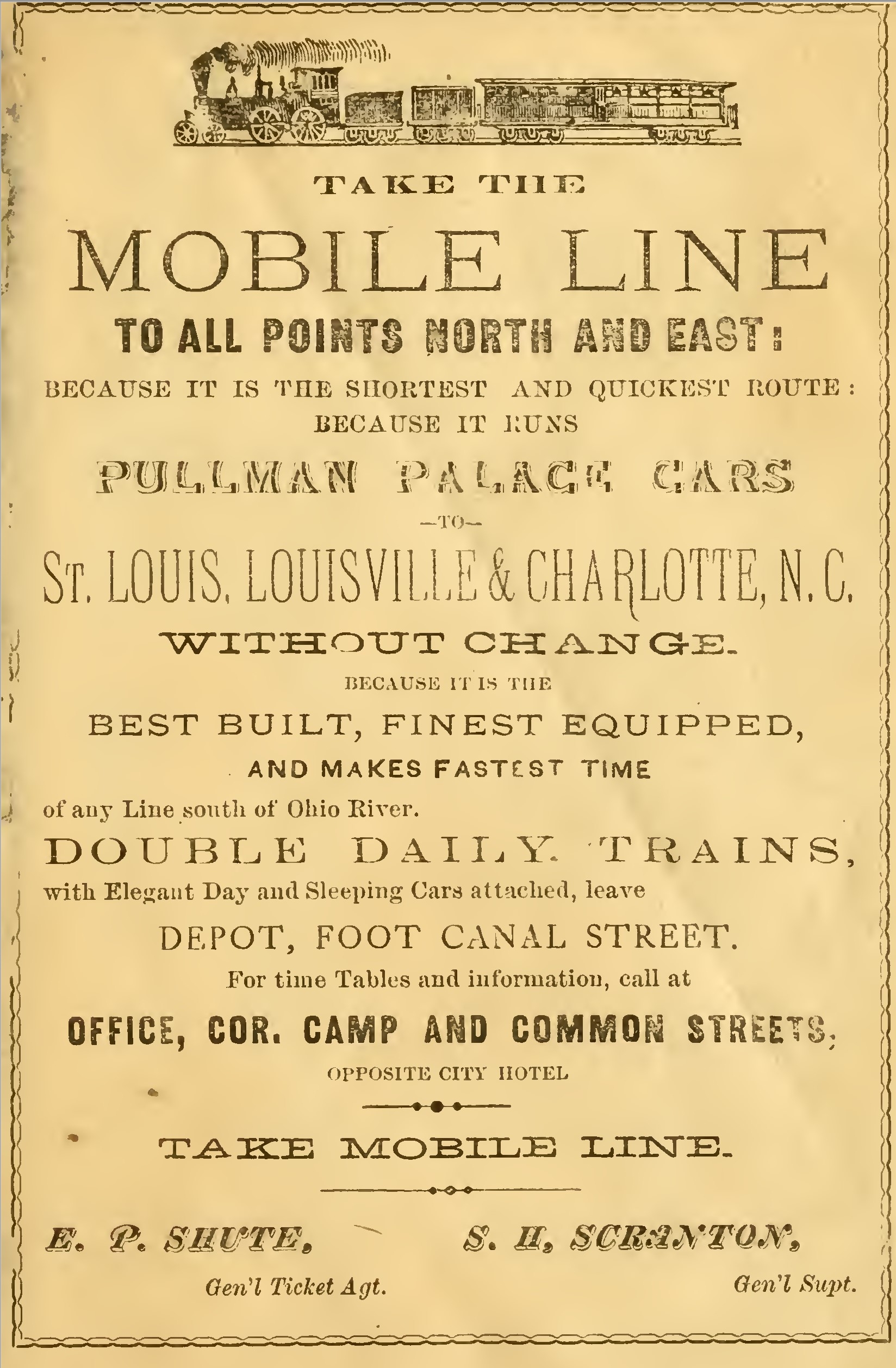
Text prepared by:
- Elizabeth Ezell
- Phillip Frederiksen
- Taylor Hicks
Fall 2020-2021 Group:
- Chloe Campbell
- Jason Chancey
- Ashley Christian
Winter 2020-2021
- David Borgognoni
- Brittany Emery
Spring 2021
- Adrianna Fountain
- Daijah Glover
- Seth Hamm
Fall 2021
- Jayci Krieger
- Alynda Livingston
- Savannah Stewart
Winter 2022
- Andrew Dampier
- Joseph Simpson
Spring 2022
- Kayla Gamble
- Bruce R. Magee
- Jessica Robinson
- Anabel Schooley
Source
Madden, John W. Hand Book of the Carnival, Containing Mardi-Gras, Its Ancient and Modern Observance; History of the Mystick Krewe of Comus, The Twelfth Night Revelers, and Knights of Momus, With Annals of the Reign of His Majesty, the King of the Carnival. New Orleans: John W. Madden, 1874. Internet Archive, 18 December 2008, https:// archive.org/ details/ handbook ofcarniv 00madd, Accessed 3 November 2022.
